Love God, Love the Word, Love People
Leading with a Bowed Head

Christ, Cubs, and Church History
Setting the Trajectory for Life







54-5
THE ESSAY
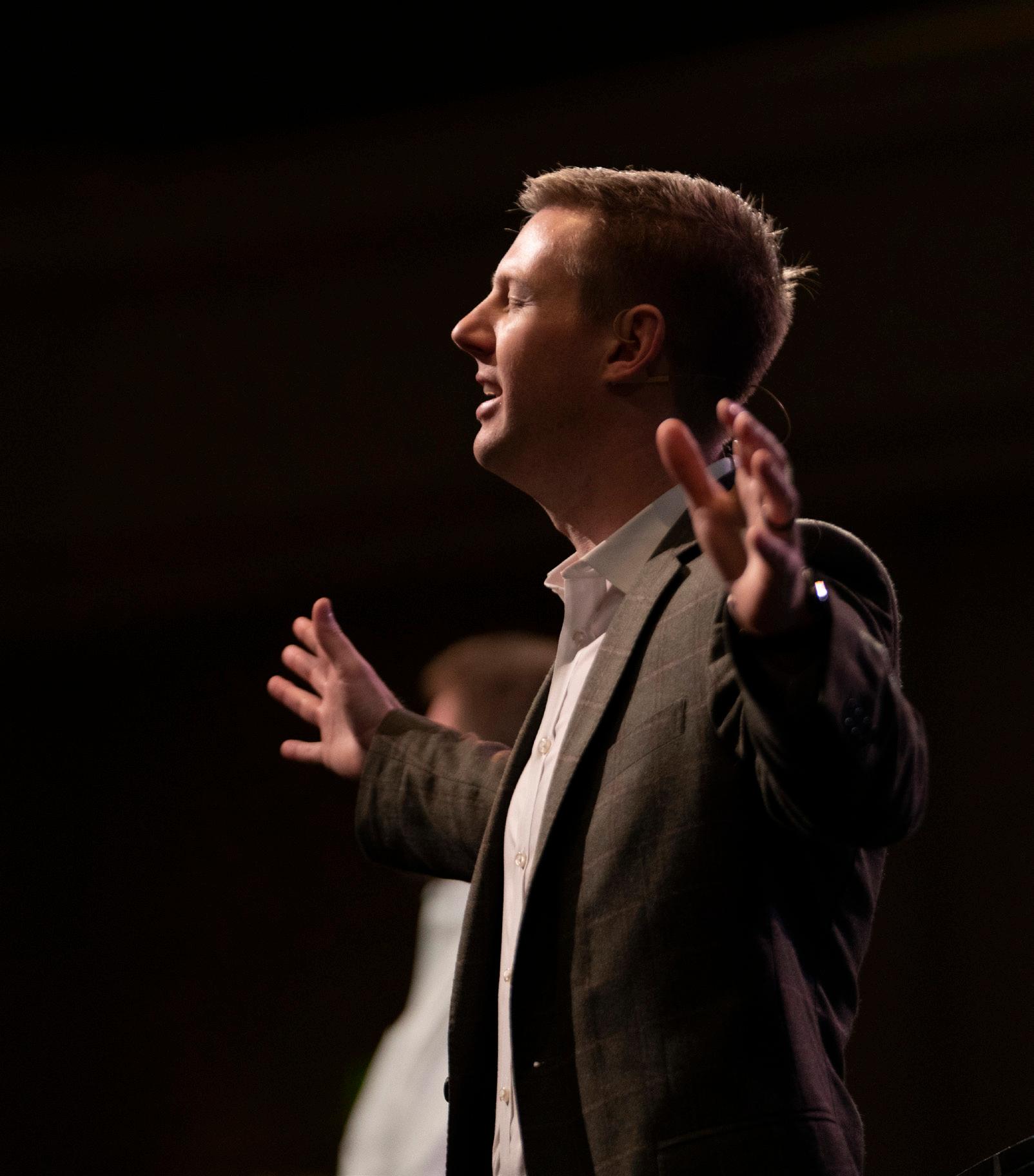
David S. Dockery (’81) explains the relationship between an education at Southwestern Seminary and Texas Baptist College and calling.
Upon assuming the role of interim president in September, David S. Dockery ('81) led the institution to a renewed focus on prayer with regular prayer gatherings on campus, like the one captured in this photo. Upon his election as president, Dockery urged the seminary community to be "characterized by a bowed head.”
42-47 48-53
Alumnus Andrew Bristol (’93, ’99) follows the Lord in obedience around the world.
How Blake McKinney, assistant professor of history and humanities, shapes the lives of Texas Baptist College students.
Beverly Skinner (‘98) leads college ministry in Georgia to focus on making an impact for a lifetime.

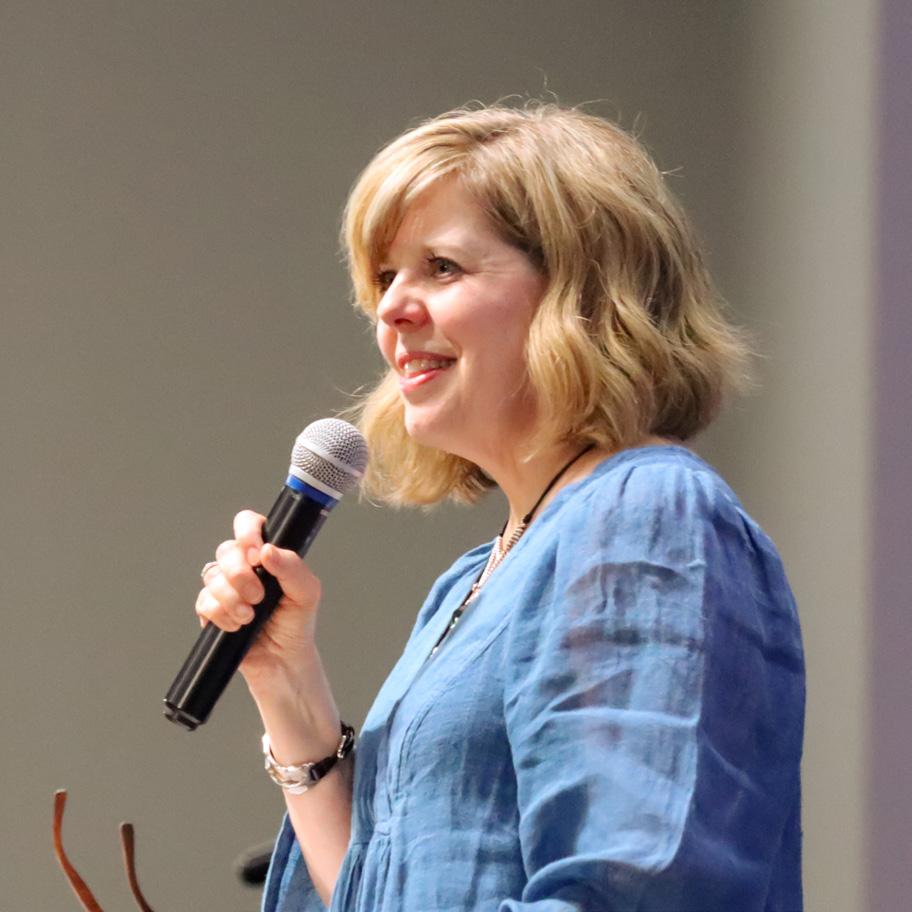
“I have the wonderful opportunity to help students love God with all of their minds.”
Spring 2023, Volume 80, Issue 03 swbts.edu/news
EXECUTIVE EDITOR
James A. Smith Sr.
MANAGING EDITOR
Ashley Allen
SENIOR EDITOR
Adam Covington
CREATIVE DIRECTOR
Emil Handke
ART DIRECTION
Savannah Cheatham
WRITERS
James Dugger
Elizabeth Bennett
GRAPHIC DESIGNERS
Savannah Cheatham
Bekah Jenkins
Katelyn Daughtey
PHOTOGRAPHERS & VIDEOGRAPHER
Amanda Belle Williams
Chinsop Chong
Mark Ducommun
ONLINE CONTENT
Jaclyn Parrish
Rebekah Hodges
Meghan Ditty
1.800.SWBTS.01 swbts.edu
All content © 2023 The Southwestern Baptist Theological Seminary. All rights reserved.
To comment on articles in Southwestern News or to suggest story ideas, write to swnews@swbts.edu
Southwestern News (ISSN 0038-4917) is published three times a year by the SWBTS Office of Communications 2001 W. Seminary Drive Fort Worth, TX 76115 817.921.8730
To subscribe, cancel or make mailing changes, please go to swbts.edu/magazine, call 817.921.8830, or write to the address below.
Issued three times per year. Postmaster: Please send address changes to Office of Communications P.O. Box 20656 Fort Worth, TX 76122
Stay Connected: swbts.edu @SWBTS SWBTS
SOUTHWESTERNSEMINARY
Give to Southwestern Seminary: swbts.edu/give
evangelical in both its tradition and its conviction.
Southwestern’s faculty are first and foremost outstanding classroom teachers, but they are also thoughtful scholars, researchers, authors, and gifted practitioners. These faculty are men and women with lofty academic credentials and experience in local churches and other ministry settings. Southwestern staff members are competent and caring. Southwestern students come from Texas and every other region of the country; they come from the United States and about 60 other countries from around the globe.
education.
More than 3,000 students annually pursue master’s degrees as well as professional and research doctoral degrees at the seminary’s four graduate schools, while also benefitting from the various undergraduate programs through the seminary’s fifth school, Texas Baptist College. These various programs are offered in-person on the beautiful Southwestern campus in Fort Worth, Texas, and online. This online or distance education is delivered both synchronously and asynchronously, all with a focus on students.
How grateful we are for the privilege to serve Southwestern Seminary for the days to come. For many years, we both have enjoyed a special relationship with our alma mater The Lord has now given us the privilege and responsibility to serve the Southwestern community in new ways. As we do so, we celebrate the best of Southwestern’s distinctive heritage.

Many important Christian truths are best understood in “both/and” rather than “either/ or” categories. Certainly, there are times when “either/or” is not only the best choice but also the only choice, such as questions about one’s eternal destiny. But asking if Jesus Christ is fully God or fully human, is the Kingdom of God present or still to come, is God one or three, or other similarly important questions could lead to heterodoxy or heresy if one is not careful. Certainly, we want to confess that Jesus Christ is fully God and fully human; the kingdom is both now and not yet; and God is one and three.
We are often asked, “What makes Southwestern a distinctive seminary?” This question is raised by interested friends, prospective students, alums, donors, and others. One answer to this question is that Southwestern offers thoughtful and convictional guidance to these first order and ultimate theological questions, helping students understand the teaching of the Bible and the best insights from Christian thinkers through the years. Moreover, the best aspects of Southwestern’s heritage point to an educational institution that is both Baptist and
Degree programs are offered primarily in English, which has been the case since our founding in 1908. Now, however, degree programs are also offered in German, Korean, Mandarin, and Spanish, with plans for Portuguese opportunities in the year ahead. Southwestern is committed to preparing students to take the Gospel to the nations and to bring students from the nations to Seminary Hill.
Southwestern wholeheartedly believes in theological education with a strong emphasis on biblical interpretation, historical understanding, theological formation, and practical ministry preparation. Southwestern for 115 years has capably equipped pastors for local churches and missionaries for global service. Motivated by the ideals of B. H. Carroll, the seminary’s founding president, Southwestern has emphasized the need to understand the English Bible and the importance of understanding the biblical languages. Believing that providing clarity and insight to the informational aspect of the seminary’s curriculum is a high calling, Southwestern continues also to highlight the priorities of spiritual, ministry, and Christian worldview formation, as well as personal sanctification and transformation.
Southwestern capably has worked to pass on the best of the Christian tradition while also pioneering initiatives in theological education such as the first full-time chair in evangelism, the first School of Christian Education, and the first School of Church Music. Preaching, pastoral ministry, evangelism, teaching, counseling, missionary service, age-focused ministry, and worship leadership are key aspects of Southwestern’s full-orbed approach to theological
The seminary’s identity statement prioritizes commitments to both the Great Commandment (Matt 22:37-39) and the Great Commission (Matt 28:18-20). We want to love God supremely with all of our heart, soul, mind, and strength while loving others as Christ has loved us, which provides the framework to share the love of Christ with those across town, with those across the country, and with those around the globe.
The “both/and” distinctives shape one’s understanding of Southwestern Seminary/ Texas Baptist College, making it indeed a truly special place to prepare to live one’s calling. This vital preparation takes place in a gracefilled, Christ-centered, scripturally-grounded, confessionally-guided, student-focused, and globally-engaged context. Southwestern was a wonderful place for both of us to pursue our preparation for decades of ministry. We believe it continues to be a great place for current and future generations to do the same.
We want to express our genuine gratitude to those who pray, give, support, offer encouragement, and give of their time for the sake of the seminary. We are thankful for our faculty and staff colleagues, as well as the students that the Lord has brought to Southwestern at this time. This entire effort is a team effort, and we are delighted to serve alongside you for the good of Southwestern Seminary and the glory of God. We want to invite you to join with us in this effort as we trust the Lord for the days ahead.
Soli Deo Gloria, DAVID S. DOCKERY President O. S. HAWKINS Chancellor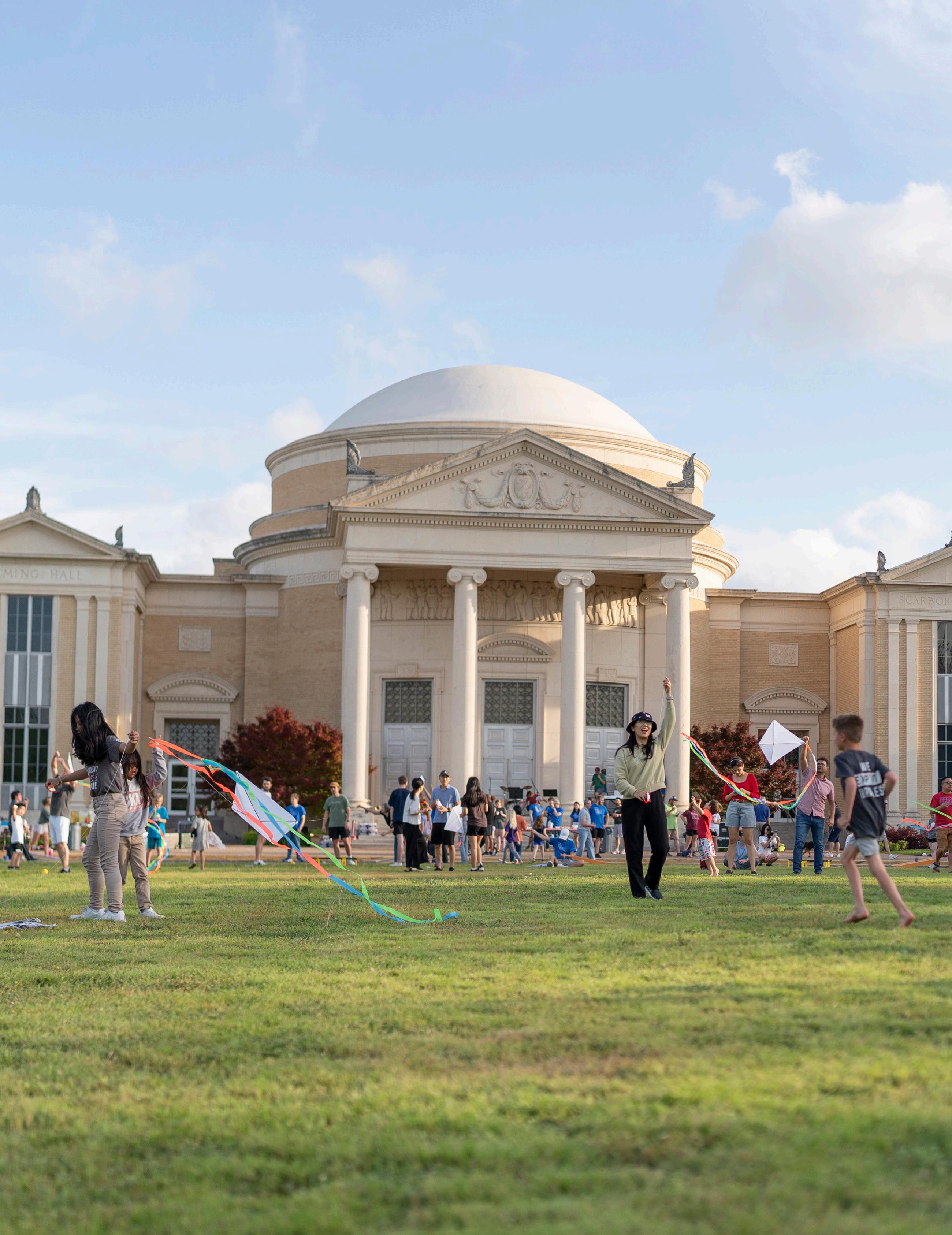
BUILDING was filled with Southwestern Seminary and Texas Baptist College students, faculty, staff, and families the evening of April 14 to celebrate “Night on the Lawn” with kite flying, games, and a community-wide picnic.
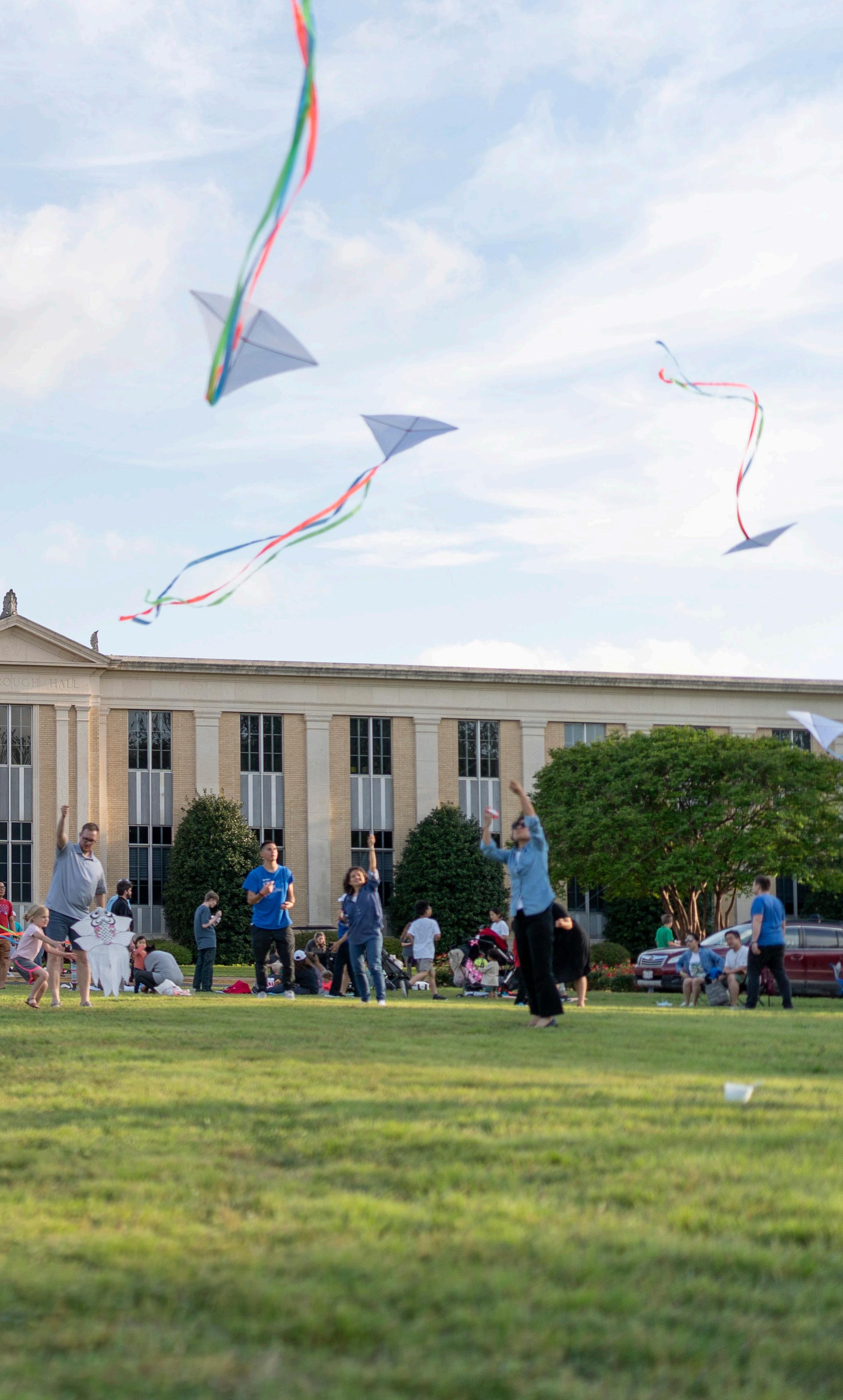
CHRISTIAN HIGHER EDUCATION LEADER DAVID S. DOCKERY (’81) WAS ELECTED 10TH PRESIDENT and Southern Baptist leader O.S. Hawkins (’74, ’20) was elected to the new role of chancellor during the spring meeting of the Southwestern Baptist Theological Seminary board of trustees, April 19.
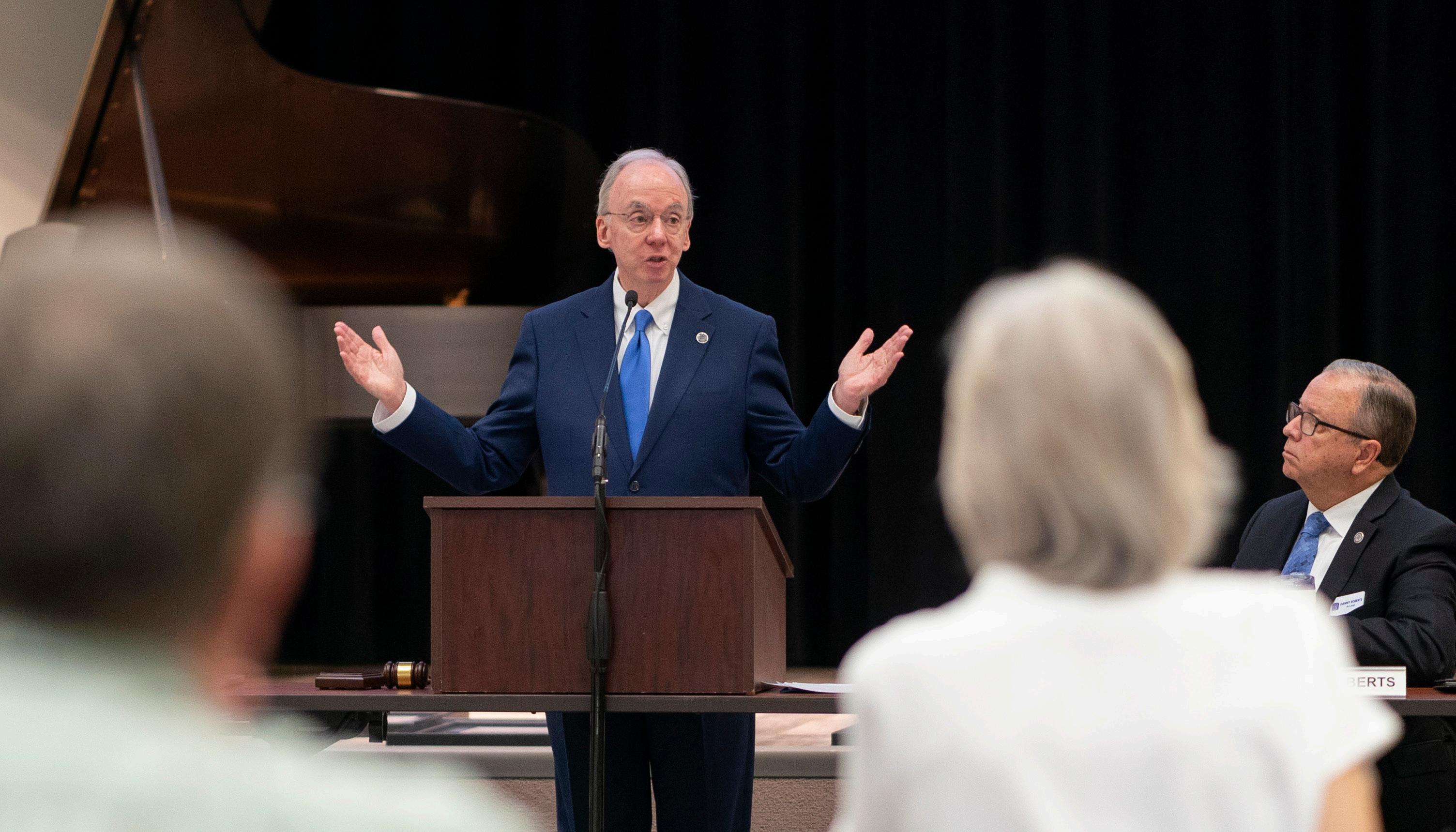
The unanimous elections of Dockery and Hawkins to their new roles came nearly seven months after their elections as interim president and senior advisor and ambassador-at-large, respectively, in a special-called trustee meeting, September 27, 2022, following the resignation of Adam W. Greenway (’02). “Dr. David Dockery is God’s man for Southwestern Seminary in this hour,” Chairman Danny Roberts (’79) told trustees. “Our seminary’s at a critical juncture in this 115-year history, and in God’s providence, He has already provided the man to lead our seminary during this time.”
Roberts said trustees did not need to “look further for our next president” based on Dockery’s “impressive performance as interim [president] providing stability and healing, his long track record of outstanding Christian leadership in higher education, with the current needs of the institution.”
Although a presidential search committee would be typical, “Southwestern’s current chal-
lenges are best faced with clarity in the Office of the President as soon as possible and for the future,” he said, noting that it’s not the first time a president of Southwestern was elected without a search process, referring to the seminary’s second president, L.R. Scarborough.
“We have settled today who our leader is, and we may move forward as we continue to seek God’s favor on Seminary Hill as we equip men and women of the next generation of ministers to the calling that God has given them,” Roberts said.
Dockery said he was “deeply humbled and genuinely grateful for the privilege and responsibility to serve” as Southwestern’s 10th president. “I am truly thankful for the overwhelming support from the board of trustees as well as for the faithful encouragement and prayerful support from the faculty, staff, colleagues, and students. What an honor it will be to continue to serve side-by-side with O.S. Hawkins, a dear friend and person that I greatly admire and from whom I have learned much in recent months.”
He added, “We recognize that we stand on the shoulders of so many who’ve gone before us. I love this institution and the best aspects of its history. We will, with God’s help, seek to carry forward in the future the best of Southwestern’s heritage and Southwestern’s spirit.”
Dockery said he trusts in the “Lord’s favor and blessings to rest on Southwestern Seminary and Texas Baptist College in the days to come. We invite Southwesterners representing various generations to join us in this shared effort to advance the Southwestern mission for the good of this institution and for the glory of our great God as we seek to prepare well the next generation of students to take the gospel to the nations.” Following the meeting, the institution's trustees made Dockery's election as president retroactive to Sept. 27, 2022.
Roberts expressed gratitude for Hawkins’s willingness to accept the new role of chancellor in which he “will continue to offer his experience as statesman and influence in this seminary and in this community. There are really few leaders in Southern Baptist Convention life who have the impeccable leadership credentials Dr. Hawkins has with the ster-
10th president, O.S. Hawkins elected chancellor
We will, with God's help, seek to carry forward in the future the best of Southwestern's heritage and Southwestern's spirit.
ling track record of 25 years as president of GuideStone Financial Resources, among other places of service.”
Roberts said Hawkins would continue to serve as a volunteer and will report to Dockery by providing “counsel, offer support and guidance, develop contacts, raise funds, and bring his influence, credibility, and good will and gravitas to our seminary community. This change in title will greatly aid his efforts in supporting the seminary. And we are blessed that this Southwesterner is willing to serve our seminary at this strategic moment in our history.”
As a two-time graduate, Hawkins said that his service to the seminary is in gratitude for what the institution has meant to him.
“I have loved Southwestern since the first day I attended classes in January 1970, and I feel a sense of indebtedness to all those who invested so much in my own journey to the
M.Div. and Ph.D. degrees on this hill,” Hawkins said. “While I will be serving alongside Dr. Dockery in the new role of chancellor, I will be volunteering my time and whatever gifts and talents God has given me to prayerfully advance the school into what we hope and prayerfully expect to be a brighter tomorrow. We are calling on all ‘Southwesterners’ to join us on this journey.”
Dockery, who earned the Master of Divinity from Southwestern Seminary in 1981, joined the seminary faculty in 2019 when he was named distinguished professor of theology and theologian-in-residence for the B.H. Carroll Center for Baptist Heritage and Mission. He also served as special consultant to the president. Later, he was named editor of the Southwestern Journal of Theology, the seminary’s historic academic journal. From December 2020 to February 2022, he also served as
THE ELECTION OF DAVID S. DOCKERY (’81) AS 10TH PRESIDENT AND O.S. HAWKINS (’74, ’20) TO A NEW POSITION AS CHANCELLOR marked a historic spring meeting of the Southwestern Baptist Theological Seminary board of trustees.
Meeting April 17-19, trustees also approved “Advance Southwestern: 2030,” a new institutional plan, a 2023-2024 budget, elected new officers, and approved academic programs and faculty elections, promotions, sabbaticals, and academic chairs, among other actions. All actions of the board were unanimous.
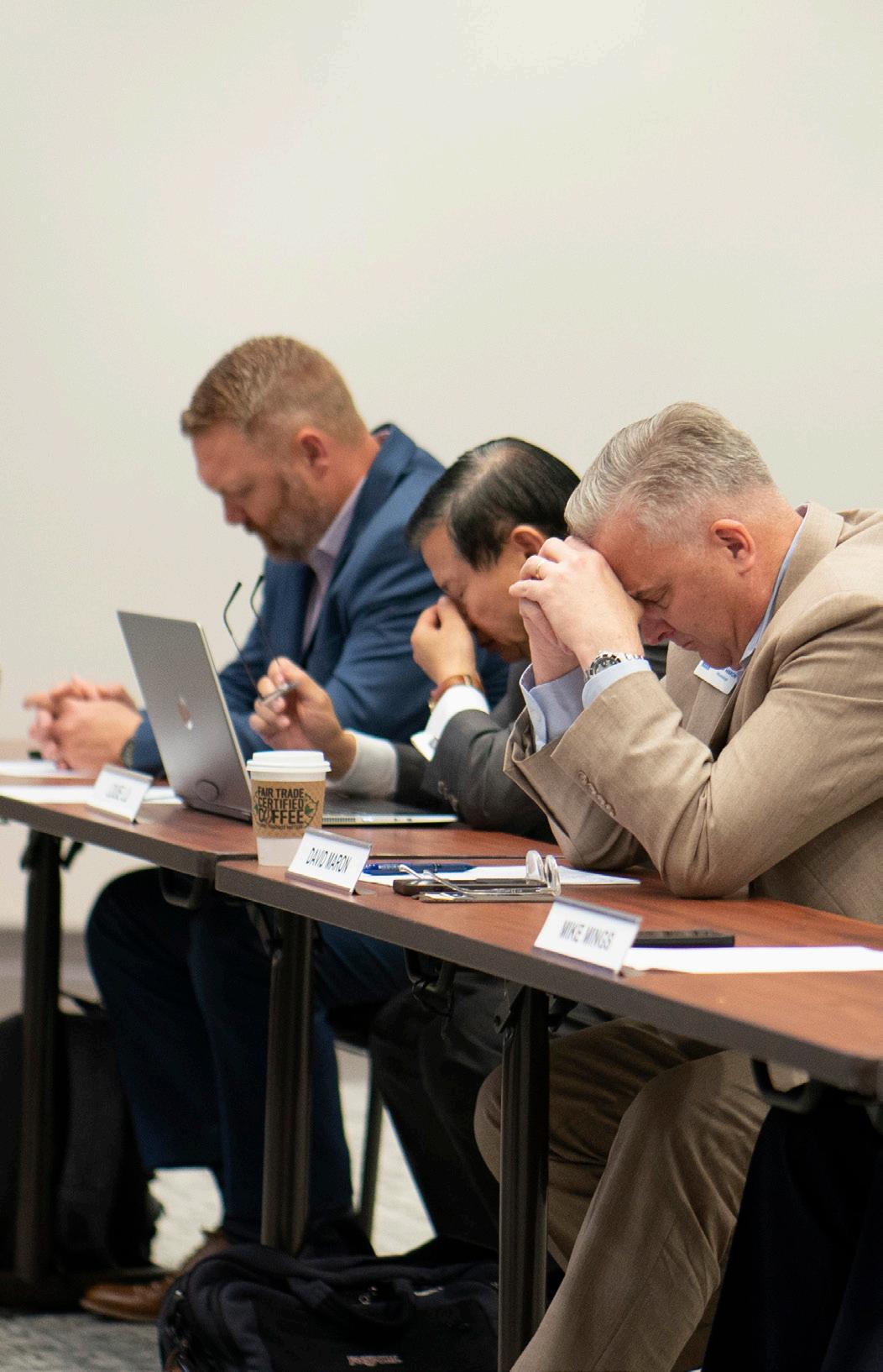
The seminary community gathered for a special prayer chapel for the trustees on April 18, led by Matt Queen, interim provost and vice president for academic administration, and Melana Hunt Monroe, daughter of former Southwestern faculty member T.W. Hunt. The service was based on Psalm 90:17, the theme verse for the academic year established by Dockery in September, and the Lord’s Prayer.
“Advance Southwestern: 2030” is an updated and expanded version of an academic plan adopted in 2021, and was the collaborative effort of the interim administration, faculty, and staff involving dozens.
“This plan will pave the way for a, hopefully, coordinated, concerted, collaborative effort together across this campus,” Dockery told trustees in his first remarks as president. “This plan did not come about because of one person. It did not come about because of a small group of people. It has contributions from every area of the campus that have spoken into this plan and identify the priorities for their area, things that they think
interim provost at Southwestern. Additionally, he serves as the inaugural director of the Dockery Center for Global Evangelical Theology, which was named in his honor by the board of trustees at their spring 2022 meeting.
Hawkins, who retired in March 2022 as the president and CEO of GuideStone after leading the Southern Baptist entity for 25 years, is a two-time alumnus of Southwestern Seminary, holding the Master of Divinity (1974) and Doctor of Philosophy (2020) degrees from the institution. Additionally, the Fort Worth native holds a Bachelor of Business Administration degree from Texas Christian University and honorary doctorates from Liberty University, Dallas Baptist University, Southwest Baptist University, and Criswell College. Hawkins received the distinguished alumni award from Southwestern Seminary in 2000.
will speak to the advancement of this place.”
In addition to new vision, identity, and mission statements, the plan includes six core values of the institution: grace filled, Christ centered, scripturally grounded, confessionally guided, student focused, and globally engaged.
“Our hope is that such a Plan will help to develop a shared vision and consensus to help bring renewal to Southwestern Seminary for the years ahead,” the Plan says.
Acting on recommendations from the Academic Administration Committee, trustees approved four curriculum changes: two in the Roy J. Fish School of Evangelism and Missions adding the Master of Divinity in Spanish and the Master of Theological Studies (MTS) in Portuguese, and two in the Jack D. Terry School of Educational Ministries to offer a master’s concentration in Ministry to Women, as approved by both the School of Theology and Terry School faculty, and a master’s concentration in Collegiate Ministry. All new programs will begin in the fall 2023 semester, other than the Portuguese MTS, which will be available in 2024.
In matters pertaining to faculty, trustees named Mark E. Taylor (’01) to the Wesley Harrison Chair of New Testament and Chris Osborne (’77, ’19) to the James T. Draper Chair of Pastoral Ministry, both in the School of Theology, effective August 1.
Trustees also promoted John D. Massey (’01) to professor of missions and Hongyi Yang (’07, ’16) to associate professor of world Christianity, both in the Fish School, effective August 1.
Elected to the faculty effective August 1 were Adam Dodd (’08, ’11), assistant professor of Old Testament and biblical backgrounds in the School of Theology; Jeremiah Kim (’02, ’18), associate professor of systematic theology in the School of Theology and director of the Korean D.Min. program; and Lilly H. Park, associate professor of biblical counseling in the Terry School.
Faculty members approved for a renewed three-year term as presidential appointees were Amy Crider, associate professor of foundations of education in the Terry School; Coleman Ford, assistant professor of humanities in Texas Baptist College; Rebekah Naylor, distinguished professor of missions and missionary-in-residence in the Fish School; and Ken Magnuson, professor of Christian ethics in the School of Theology. All are effective August 1.
Trustees also approved students nominated by the faculty and certified by the registrar as having met all requirements for spring 2023 grad-
uation, as well as a new faculty manual.
Roberts reported that a trustee task force evaluated the former president’s expenses and financial management, following up on a request from trustees during their fall meeting. He said the task force “was given unfettered access by the administration to all financial records of the institution, and concluded there were instances of imprudent, unwise, and some activities contrary to institutional policies. These findings, however, did not rise to the level of requiring further action based on what is currently known.”
He said, “The findings demonstrated a need for greater accountability and oversight for the institution. As a result, new financial guardrails will be implemented to provide for greater accountability to the trustees in order to prevent similar decision making in the future.”
A budget for fiscal year 2024 of $35.9 million was approved, which is similar to the current fiscal year budget, as adjusted by the board in its fall meeting. Trustees also approved a capital budget for 2024 with a list of priority items in deferred maintenance to address as possible with approval of the Business Administration Committee (BAC).
Trustees affirmed the BAC’s decision to sell B.H. Carroll Park Apartments, student housing that is not contiguous with the main campus. In March, seminary officials announced a non-binding agreement for an $11 million acquisition of 15 acres of the Carroll Park property by the Fort Worth Housing Finance Corporation, the housing development arm of the City of Fort Worth.
Trustees authorized the BAC to negotiate details of an agreement with Prestonwood Baptist Church in Plano, Texas, to use seminary property for the purpose of establishing a pregnancy care center for women, expanding Prestonwood Pregnancy Center’s ministry to Fort Worth.
New officers of the board were elected for the 2023-2024 academic year: Jonathan Richard (’14) (New Mexico), pastor of First Baptist Church of Estancia, New Mexico, chairman; Robert Brown (’85) (Tennessee), executive director of Lakeway Christian Schools in Morristown, Tennessee, vice chairman; and Angela Duncan (At-Large), a homemaker in Granbury, Texas, secretary.
In other actions, trustees approved: an updated GuideStone Investment Policy Statement; the fiscal year 2024 housing allowance for eligible faculty and staff; and that Guinn Smith & Co. be contracted with to conduct the fiscal year 2023 financial audit.

Our hope is that such a Plan will help to develop a shared vision and consensus to help bring renewal to Southwestern Seminary for the years ahead.Jonathan Richard ('14) (center) was elected chairman of the board of trustees at the spring meeting. Robert Brown ('85) was elected vicechairman and Angela Duncan elected secretary.
IN REMARKS TO THE BOARD OF TRUSTEES FOLLOWING HIS UNANIMOUS ELECTION AS THE TENTH PRESIDENT of Southwestern Baptist Theological Seminary on April 19, David S. Dockery (’81) said he was “thankful for the many hopeful markers that we have seen in recent days.”

The election of Dockery was met with a standing ovation by the Board of Trustees and guests during the plenary session of its spring meeting.
Later in the day, in a regularly scheduled faculty meeting, Malcolm B. Yarnell III (’91), research professor of theology, offered a motion affirming Dockery’s election as president, and O.S. Hawkins’s (’74, ’20) election as chancellor that received unanimous affirmation and a standing ovation. Following the faculty meeting, a campus-wide all-staff meeting also greeted the new president with a standing ovation.
Identifying the first of the “hopeful markers,” Dockery said the faculty of Southwestern Seminary and Texas Baptist College “has recommitted itself not only to our work but recommitted themselves one to another.”
Dockery said the recommitment of faculty is “largely because” of the academic leadership of Matt Queen, interim provost and vice president for academic administration, and the five deans of the seminary’s four graduate schools and undergraduate college. Dockery added the academic leadership service has been “exemplary” while simultaneously “rekindl[ing] the faculty and their calling to this place.”
Dockery said he was also “grateful for the dedication of many staff across the campus who give of themselves tirelessly with little fanfare, often without any recognition, but they do so for the glory of God and for the good of others here.”
Saying “we’re encouraged” by the increase in spring enrollment numbers and by the number of credit hours that have been taught, Dockery said the combination of the two “represents lives that are being transformed and prepared for ministry.”
Dockery added that he gives “thanks” for “unrestricted giving that has increased significantly over the past seven months compared to the same seven-month period over the past two years.”
A “strong” Preview Day, held March 31, was another marker Dockery noted, commending the work of Chandler Snyder, interim vice president for enrollment and student services and acting dean of students, and Armando Hernandez (’19), director of admissions.
The opening of Mary’s House, a two-apartment home for missionaries serving on stateside assignment with the International Mission Board that opened in January, and the “new, improved relationship with the IMB through that work,” was the sixth marker cited by Dockery. In addition to crediting the Woman’s Mission Union of Texas which provided the funding for the restoration of the campus building that houses Mary’s House, Dockery credited Joey Cruse, director of facilities, and his team that “worked so hard to bring that house together.” Dockery also said he was “thankful for the vision” of John Massey (’01), dean of the Roy J. Fish School of Evangelism and Missions, Ian Buntain, director of the World Missions Center, and Queen.
Dockery said the “wonderful spring chapels have modeled and mirrored … congregational preaching grounded in holy Scripture.” The bi-weekly sermons preached during the institution’s spring chapels have focused on the New Testament epistle of Philippians. Dockery said the sermons have been “challenging us as a community to live joyfully, to live in unity, to live with humility, and to work together toward our shared calling.”
The commitment to prayer has “been the most important marker of renewal,” Dockery said. He noted that each Monday morning, and before chapel on Tuesdays and Thursdays, “for over six months we have gathered on this campus asking God to visit this place once again.” Dockery, who claimed Psalm 90:17 as the institution’s verse for the academic year in September 2022, said the campus is not only continuing to pray the verse, but is also “praying for different facets of our work” while also “recognizing our total dependence on God and without prayer, without a prayerful dependence, we don’t have an opportunity with the significant challenges that we face, the difficulties of this moment.”
He added that his prayer for the Southwestern community is to be "characterized by a bowed head—that will be who we are."
Dockery said, “We rejoice that God has given us talented people to create a new website to tell our story,” as well as a “new marketing plan that is coordinated carefully with the new institutional plan” that calls for Southwestern Seminary “to be a Great Commandment, Great Commission institution that equips men and women to carry out our mission.”
While noting “challenges” facing the institution are “great,” including finances, space utilization, and other matters, Dockery said the board and administration “together” address the “important questions for us going forward … hand-in-hand, standing shoulder-to-shoulder” noting the example of Paul in Philippians 1:27-30.
Dockery said this is done “with great confidence, not just in the wonderful Southwestern heritage, not just in the wonderful people that are here at this time, not just in the Southwestern family that spreads across generations. We do so ultimately with confidence in our great God, who is a source of all that is good and the source of every blessing, and the one in whom we have hope for the days to come.”—A.A.
SOUTHWESTERN BAPTIST THEOLOGICAL SEMINARY RECOGNIZED AND HONORED two long-time ministry partners for their generosity and support during the annual Founder’s Day Awards Luncheon, March 9. Louie and Meifeng

Lu received the B.H. Carroll Award, and David (’69, ’72, ’82) and Marcia (’69, ’79, ’92) McQuitty received the L.R. Scarborough Award.
The luncheon opened with remarks by Jack D. Terry Jr. (’62, ’67), interim vice president for institutional advancement and former dean of the Jack D. Terry School of Educational Ministries, which was named in his honor in 2009.
“Southwestern Baptist Theological Seminary has been giving wonderful theological education for 115 years,” said Terry. “Today, we come to honor our first two presidents” and to honor some of our “dear friends” with the awards.
“Founder’s Day is a meaningful and defining time for our campus,” said then-Interim President David S. Dockery (’81). “On Founder’s Day, we stop and give thanks for those who have gone before us” because of the seminary’s heritage, adding gratitude is expressed not only for the institution’s founding presidents but for “all who have made an impact” on the life of the students and faculty at Southwestern Seminary.
The awards are named in honor of the seminary’s founder and first president, Carroll, and the second president, Scarborough, for whom the school’s evangelism academic “Chair of Fire,” the first academic chair in evangelism in the history of theological education, is named
after as well.
Dockery introduced the recipients of the B.H. Carroll Award, Louie and Meifeng Lu. The Lus have made “the difference in making this program work,” said Dockery in reference to the seminary’s Mandarin Language Program, which enables Mandarin language students to earn a Master of Theological Studies degree in their own language. “For 20 years, they have had their life invested in Southwestern and their fingerprints are left on this place,” he said.
The Lus have been gracious supporters of Southwestern since 2002 where they have actively given to academic scholarships, building campaigns, Women’s Auxiliary’s Dressed for Service program, and the Mandarin language program. Louie serves as a trustee on the institution’s board of trustees.
Originally from Wuhan, China, Louie moved to the United States in 1985. He founded the Yangtze International, Inc., an export and import company of specialty products from China, in 1992. Today he serves as the company’s Chief Executive Officer. He met his wife, Meifeng, soon thereafter and they married in 1997. They are the parents of two daughters and reside in the North Texas area.
“If you’ve been around Southwestern at all, you know David and Marcia McQuitty,” said Dockery when introducing the L.R. Scarborough Award recipients. The couple’s commitment to the seminary is “ongoing” and has been “a part of this place for 50 years” and
has deeply influenced the institution, Dockery added.
The McQuittys have been affiliated with Southwestern Seminary since the 1960s when they began as students. A native of Oklahoma, David earned a Master of Divinity in 1969, a Master of Arts in Religious Education in 1972, and a Doctor of Philosophy in 1982. Marcia, a Virginia native, holds the distinction of being the first female Master of Divinity graduate (1969) of Southwestern Seminary. She also holds a Master of Arts in Religious Education (1979) and a Doctor of Philosophy (1992).
They are the only couple in the seminary’s history to earn degrees in the School of Theology and the Terry School who also returned to teach on the seminary faculty, where they served until they retired in 2012. The McQuittys have given to student scholarships, but have done so without their names associated with the funding.
The couple established The Layden and Granger Award in Childhood Education, named in honor of their mothers Lillian McQuitty Layden and Juanita Granger, which is given annually to the student with the highest academic record in childhood education.
Since 1982, Southwestern Baptist Theological Seminary has recognized those who have made significant contributions to the seminary through these awards. They are the highest awards given at Southwestern Seminary.—J.D.
“FEAR THE LORD,” O.S. HAWKINS (’74, ’20), NEWLY ELECTED CHANCELLOR of Southwestern Baptist Theological Seminary and Texas Baptist College, challenged the 346 doctoral, master, undergraduate, and certificate graduates during the Fort Worth institution’s May 5 spring commencement exercises.
“We urge you as you leave this place to serve well and to serve faithfully - to use these years of preparation in order that you might present the Gospel over and over year after year and that you might finish well,” exhorted David S. Dockery (’81), president of Southwestern Seminary and TBC, in his remarks to the newest graduates. He encouraged them to “represent the commitments of this Great Commandment and Great Commission institution, carrying forth the Southwestern heart and soul, the core values of this place as you serve in Texas, across the country, and around the world. We are so happy for each one of you.”
The spring 2023 graduating class of Southwestern Seminary and TBC, which represented 31 states and United States territories and 24 countries, included the first student, James “Luke” Waters from Kannapolis, North Carolina, to graduate with a Master of Divinity in Worship Leadership from the School of Church Music and Worship, 50 students from Japan who received their certificates in biblical counseling, and the first group of female students to earn the certificado in estudio ministeriales from the Hispanic Programs in the Roy J. Fish School of Evangelism and Missions.
The spring graduates follow the fall 2022 graduates, which included certificate, associate, bachelor’s, master’s, and doctoral graduates from 31 states and 27 countries outside of the United States. The 56 students who were awarded their doctorates during the fall ceremony made history as the largest group of doctoral graduates in a single semester in the seminary’s history. Additionally, among the graduates were 38 students who were the first graduates of the Master of Theological Studies in Mandarin degree program and 37 students who earned certificates in Hispanic church planting, the first for the program.
In his commencement address, Hawkins, a two-time graduate of Southwestern Seminary, recalled his days as a Master of Divinity student in the 1970s. He said while many of the professors who taught him are

now with the Lord, the lessons they imparted have “lived on in my heart every day of the ministry that I’ve received from the Lord.”
Hawkins likened the graduates to the children of Israel in the Old Testament, explaining that this “defining moment” and “milestone” in their lives was similar to that of the Israelites “after their education and their schooling in the wilderness” before they crossed the Jordan into the Promised Land. Hawkins reminded the graduates of Moses’s question to the people as recorded in Deuteronomy 10:12, “And now, Israel, what does the Lord your God ask of you except to fear the Lord your God by walking in all his ways, to love him, and to worship the Lord your God with all your heart and all your soul?”
Hawkins recounted the lives of men and women throughout the Bible who feared the Lord, noting the theme is “laced all through the Scripture.”
“If there was a common thread that’s woven through the lives of every man and woman in the Bible that was used of God, that had the power of God, the anointing of God, whatever terminology you want to use, it was the fact that in one way or another it was said of all of them that they were walking in the fear of God,” Hawkins observed from the lives of men and women from the Old and New Testaments. “They realized that's what the Lord required of them.”
Hawkins, a Fort Worth native who grew up at Sagamore Hill Baptist Church where Fred Swank pastored, recalled the late pastor “taught me that the fear of God was not the fear that God was going to put His hand of retribution on me,” he said. “But it was the fear that God might take His hand of blessing or anointing off of me.”
“It was the hand of God that brought you to Southwestern,” Hawkins reminded the students in his concluding remarks. “It's the hand of God that's seen you through these years of toil and struggle and study. And it's the hand of God that will go with you when you leave this platform to your place of service, wherever it may be, all over the earth.”
The ceremony also included the awarding of the David S. and Lanese Dockery Award for Teaching Excellence to Dean Sieberhagen, associate professor of Islamic studies, Vernon D. and Jeannette Davidson Chair of Missions, and director of the Islamic Studies Program in the Fish School. —A.A.
CHARLES F. STANLEY, A 1957 BACHELOR OF DIVINITY GRADUATE of Southwestern Baptist Theological Seminary with lifelong times to his alma mater, died April 18 at his home in Atlanta, Georgia. He was 90 years old.
“Charles Stanley was an exemplary preacher and teacher of God’s Word,” said then-interim President David S. Dockery (’81). “We are indeed grateful for the influence of his faithful ministry, which extended around the globe. While we mourn his loss, we celebrate the significant life and legacy of this Southwesterner, even as we give thanks for the hope of the resurrection.”
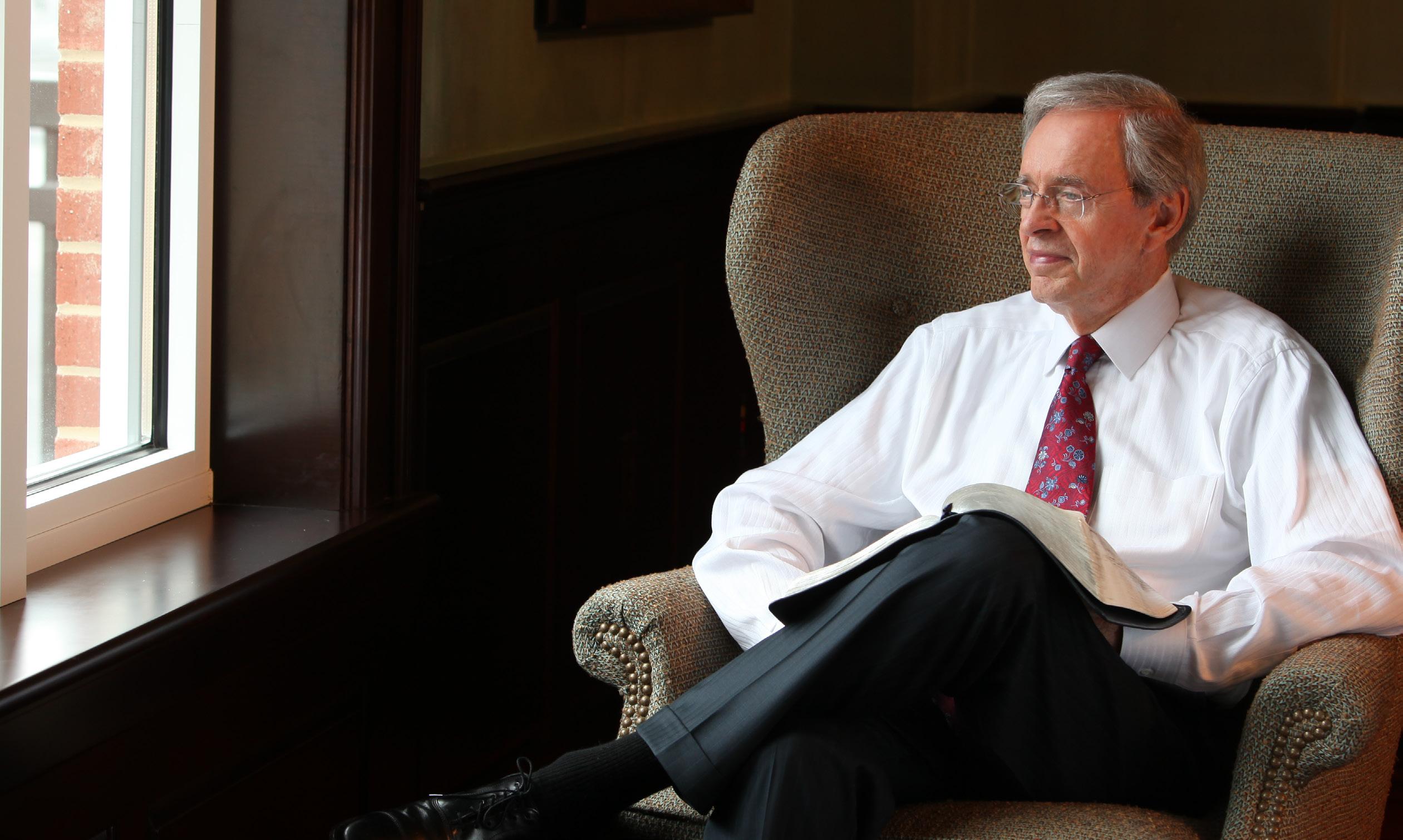
Originally from Dry Fork, Virginia, the pastor emeritus of the First Baptist Church of Atlanta, Georgia, was raised by his mother after his father died when Stanley was nine months old. Stanley, who was born at the onset of the Great Depression, came to faith in Christ as a 12-year-old, he explained in a September 2022 interview for Southwestern News
When asked what he hoped his legacy would be following decades of ministry, Stanley said, “That all of my effort had one ultimate goal: to reach as many people as possible, as quickly as possible, as clearly as possibly, as irresistibly as possible, in the power of the Holy Spirit, to the glory of God.”
Stanley’s ties with the Fort Worth institution remained strong throughout his ministry. In 2010, he was named a Southwestern Seminary Distinguished Alumnus, and in 2012 he was the recipient of the B.H. Carroll Award. Named after the seminary’s founder and first president, the B.H. Carroll Award is the institution’s highest honor that is given annually to long-time ministry partners for their generosity and support.
In 2021, In Touch Ministries, a global broadcast ministry Stanley founded in 1977, honored Stanley by endowing the Charles F. Stanley Chair for the
Advancement of Global Christianity at Southwestern Seminary. Stanley, who received a four-year scholarship to attend Southwestern Seminary, explained while the chair left him “surprised,” he was “grateful” to be able to help seminary students “be able to do what God has called them to do.”
Additionally, Mathena Hall, which houses the Roy J. Fish School of Evangelism and Missions on the campus of Southwestern Seminary, is home to the Dr. Charles Stanley Prayer Room. The room was dedicated in the Southwestern Seminary alumnus’ honor when the building was opened in 2017.—A.A.
We are indeed grateful for the influence of his faithful ministry, which extended around the globe. While we mourn his loss, we celebrate the significant life and legacy of this Southwesterner, even as we give thanks for the hope of the resurrection.Photo courtesy of In Touch Ministries
ENCOURAGING THE SOUTHWESTERN BAPTIST THEOLOGICAL SEMINARY COMMUNITY TO RECOVER the “three necessary strands” of its identity, including evangelical faith, soul-winning in all areas of ministry, and Baptist family ways, Research Professor of Theology Malcolm B. Yarnell III (’91) recalled the foundations of the Fort Worth institution during his Founder’s Day address on March 9.
“We offer thanks to God for every person who has influenced this place, who has invested in this place, who has shaped this wonderful institution that we now have the wonderful privilege of being a part of on this day,” said David S. Dockery (’81), then-interim president, in his welcome to the gathering that included faculty, staff, students, alumni, donors, and members of the seminary’s board of trustees. The Founder’s Day chapel service is commemorated annually nearest to the anniversary of the seminary’s March 14, 1908, charter.
Reflecting on the seminary’s founding, Yarnell noted the Fort Worth institution’s “theological heritage” includes the three components of “evangelical in doctrine, Baptist in structure or body,…with a heart for soul-winning practical Christianity.”
“The founding presidents, trustees, and faculty of Southwestern taught these three marks of evangelical identity,” Yarnell said, adding the seminary’s first president and founder, B.H. Carroll, “outlined … the requirements for trustees, faculty, and graduates” and required trustees and faculty to “subscribe and not seriously depart” from the “thoroughly evangelical” New Hampshire Confession of Faith, Yarnell added.
Additionally, Yarnell said in 1921 the Southwestern Seminary faculty “crafted a seven-article doctrinal statement” that “began with belief in the Bible as the Word of God” while dismissing the “rationalistic method of dealing with the Bible and evolutionary theory” while also affirming “the Genesis account.”
Yarnell noted Southwestern’s founders “emphasized the new birth and personal conversion” as they “proclaimed far and wide, ‘You must be born again.’” Echoing the words of the seminary’s second president, L.R. Scarborough, Yarnell said, “Let us see to it that our diplomas are a guarantee of character as well as a stamp of scholarship.”
“The name ‘Southwesterner’ must ensure evangelical integrity,” Yarnell added.
Recalling the “vision” of Carroll, Yarnell said the seminary’s founder “conveyed the heartbeat of our seminary.”
“Our moral responsibility here is to train preachers of the saving Gospel,” Yarnell said, as he recounted Carroll’s words at the founding of the institution: “It is our duty to pray for more laborers. It is our duty, and theirs, to train them for efficient service.”
Yarnell encouraged the Southwestern Seminary community to have hearts “compelled by the living God’s compassion for this world” that are also “emboldened with the Good News that His Son is risen” that “invite sinners to repent, believe, and be born again by the Spirit” and that “which speak truth, always with love.”
“We need hearts passionate for people, not against people,” Yarnell
exhorted, noting the seminary’s “most influential book,” Scarborough’s With Christ After the Lost, “summarizes the spirit” of the institution.
“Our founders were not culture warriors set against the world in spite,” he added. “They were militant evangelists going after the lost in love. They pursued the world to win it to a living faith in a living Lord. This is the Southwestern way.”
Yarnell recounted that Carroll told Scarborough, “Keep the seminary lashed to the cross,” explaining that the cross “centers our evangelical faith in the gracious atoning work of our Savior” while the phrase “to keep” emphasizes “our duty to obey His commission” and the lashing “embraces the pain.”
Yarnell also noted the institution’s “Baptist family” as he said, “the lordship of Jesus over each human person is the fundamental Baptist principle.” Noting that “equality of persons is non-negotiable,” Yarnell said Southwestern Seminary’s “founding presidents repeatedly honored the faculty in their reports, encouraged them to serve their churches while teaching at the seminary, and defended them from scurrilous attacks,” adding that “Carroll’s constitutional regard for the dignity and worth of his faculty is a standing rebuke to unaccountable hierarchy in the Baptist academy or anywhere else in the Southern Baptist Convention.”
Yarnell said the Southwestern Seminary community “must advocate and preserve, through oral and written instruction, through appropriate administrative action, and by personal passion and practical example,” the “three aspects of our seminary’s identity,” including the Fort Worth institution’s “evangelical faith identity,” “passion for practical soul-winning Christianity,” and “Baptist family identity.”
“Southwestern Baptist Theological Seminary will not break but strengthen as we recover these three necessary strands of our identity, … our evangelical faith, … our practical emphases upon soul-winning missions, preaching, teaching, worship, counseling, all the things that we do, … and our Baptist family ways,” Yarnell concluded.—A.A.
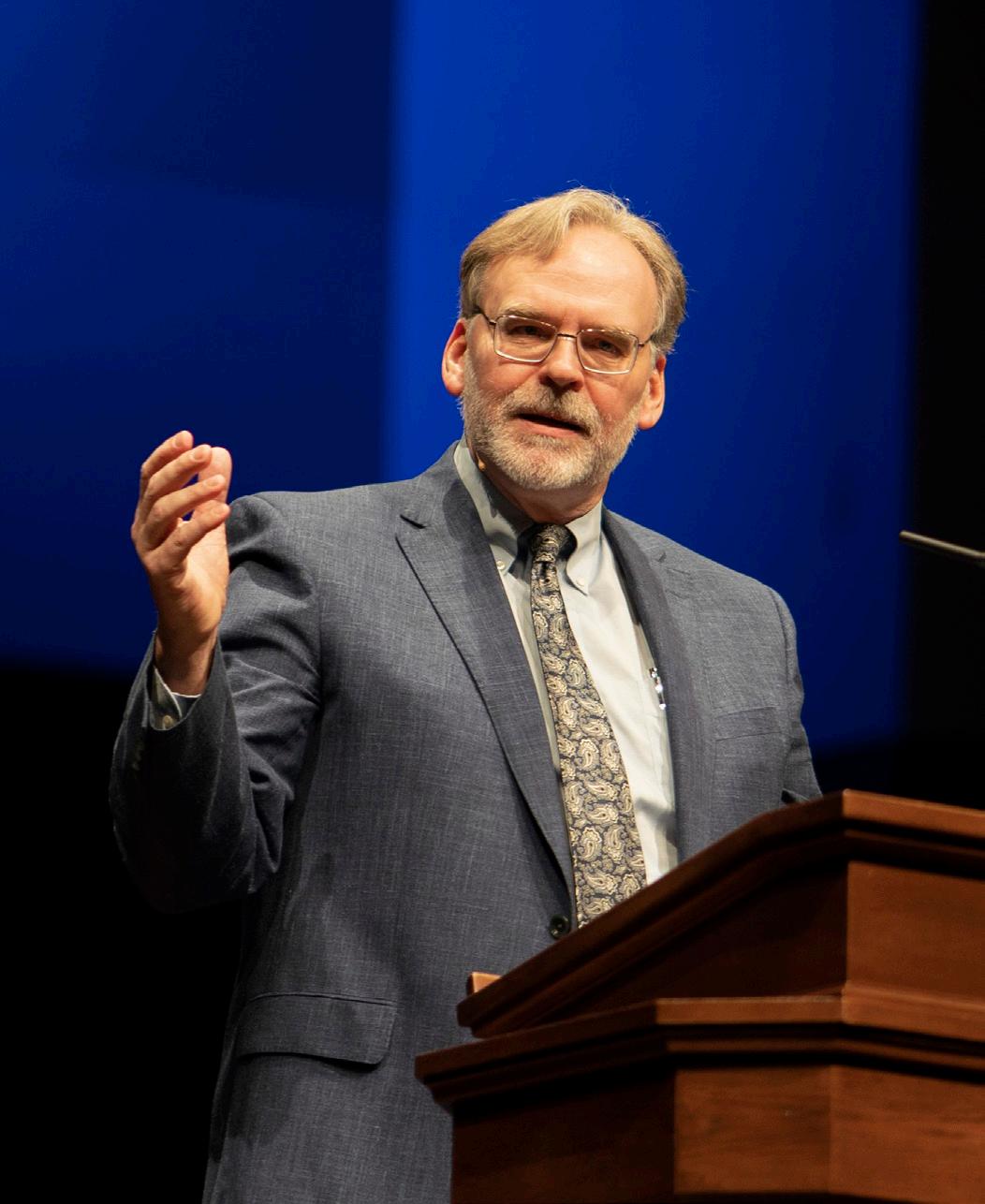
EXPOUNDING ON WHAT IT MEANS TO BE A “GRACE-FILLED COMMUNITY,” THEN-INTERIM PRESIDENT DAVID S. DOCKERY (’81) introduced the first of six core values to “shape and inform” the Southwestern Baptist Theological Seminary and Texas Baptist College community during the Jan. 24 convocation service.
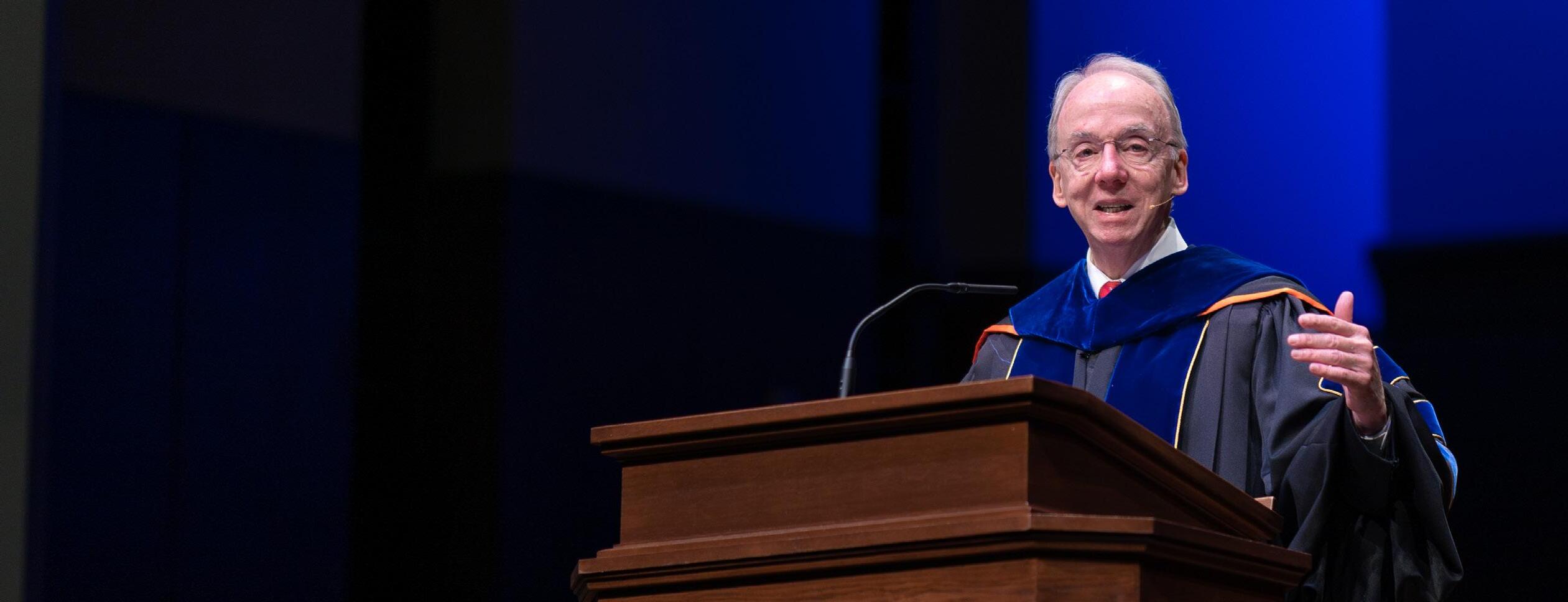
The ceremony, which formally begins the new semester, also included the installation of a new dean and two academic chairs, and announcements of the appointments of five instructors and five individuals to serve in interim roles.
Before delivering his convocation address, Dockery welcomed new students to campus. In a tradition that began with Southwestern Seminary’s fifth president, Robert E. Naylor, Dockery pronounced the new students as “Southwesterners.” Using Naylor’s own words, Dockery, himself a 1981 Master of Divinity graduate of the institution, reminded the new Southwesterners that “it is an honorable, worthy, and won-
derful word about which you had nothing to do” and that the word Southwesterner speaks to God bringing them to the seminary.
In his address to the assembly that included faculty, students, staff, and visitors, Dockery noted the distinctiveness of Southwestern Seminary citing the campus, varying forms of teaching and training, including online and non-traditional programs, comprehensive offerings of certificate and degree programs through its four schools and undergraduate college. Southwestern is “one of the truly comprehensive institutions of theological education in the country today,” he said.
However, he identified a core “aspect of the Southwestern community that we hope to see emphasized more and more in the days to come.”
“Our dream for Southwestern Seminary and Texas Baptist College is for this community to be characterized by and filled with grace, acknowledging our deep and daily depen-
dence on God while also recognizing God as the source and motivation for our worship and service of Him,” Dockery said, noting that a grace-filled community is also a God-filled community.
Dockery said the new institutional plan that will be presented to the seminary’s board of trustees at its spring meeting asserts that Southwestern Seminary is a Baptist and evangelical institution that seeks to “build a gracefilled community, which emphasizes love, joy, peace, patience, kindness, goodness, faithfulness, gentleness, and self-control as virtues needed to create a caring Christian context where quality theological education, grounded in biblical and confessional convictions, can be offered.”
The plan also recommends six core values of the seminary, including grace filled, Christ centered, scripturally grounded, confessionally guided, student focused, and globally engaged.—A.A.

WHEN THE ARCHIVE AND RESEARCH CENTER AT THE BILLY GRAHAM LIBRARY IN CHARLOTTE, NORTH CAROLINA, OPENED to researchers on Nov. 8, 2022, Anatoliy Orgunov (’18), a Doctor of Philosophy student at Southwestern Baptist Theological Seminary in Fort Worth, Texas, was the first person to have access to the historical artifacts and papers of the late, world-renowned evangelist.
“[The] reception was fantastic,” said Orgunov, who spent several days in the archives researching for his doctoral dissertation. “I would expect a lot of materials about Billy Graham and this is what I saw. But I've seen
much more than I expected” noting the vast amount of material and the “help from the staff,” including David Bruce, executive vice president of the Archive and Research Center, and his staff. Orgunov added the staff “pre-screened” material for him making his research “much easier and faster.”
Ukraine is where Orgunov heard Graham preach during his 1992 Moscow crusade. Orgunov, who was born and raised in Kyiv, Ukraine, came to faith in Christ in April 1992. In June of the same year, he was drafted into the Ukrainian Army for mandatory military service. Following boot camp, he recalled he became ill and needed surgery. The post-surgical recovery period allowed him two weeks at home to recuperate,
PROSPECTIVE STUDENTS FROM ACROSS THE UNITED STATES AND THE WORLD TOOK PART IN SPRING PREVIEW DAY at Southwestern Baptist
Theological Seminary and Texas Baptist College on March 31. Students and families interested in the seminary’s graduate-level programs and undergraduate college learned about the academic programs while experiencing the Fort Worth campus’s community atmosphere through worship, interactions with professors, and a campus fair.
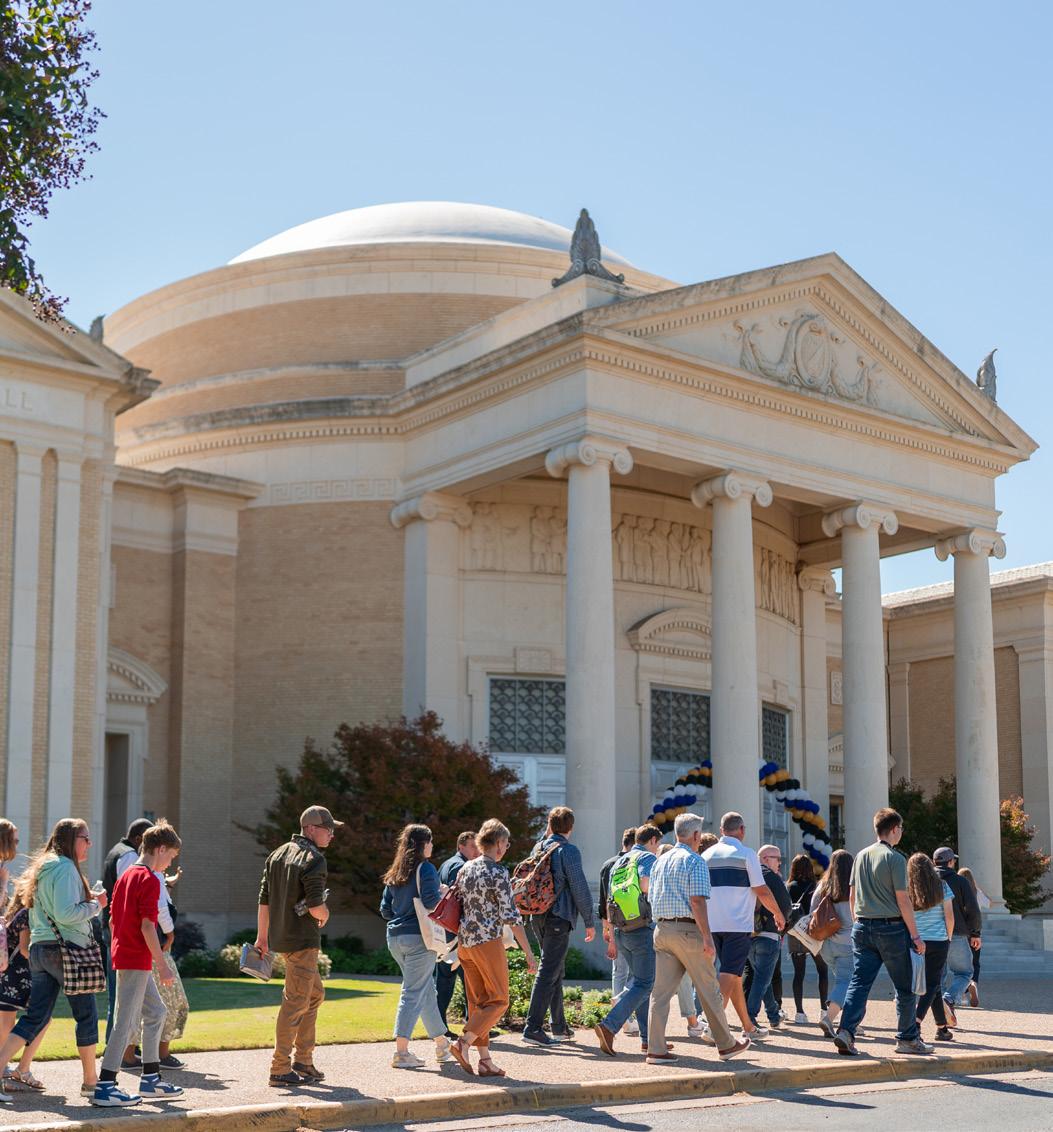
With 111 prospective students, it was the largest Preview Day in at least the last four years, which was 44 percent higher than spring 2022 and 19 percent greater than fall 2022, reported Chandler Snyder, interim vice president for enrollment and student services. Including family members of prospective students, 210 participated in Preview Day.
David S. Dockery (’81), then-interim president, welcomed the prospective students and their guests over lunch at the Naylor Student Center. In his remarks, Dockery spoke about the history of Southwestern.
“Southwestern is a very special place and has been for 115 years,” Dockery told prospective seminary students. Recounting the history of the institution, Dockery explained Southwestern was founded in 1908 and moved to its current location in 1910. He explained to the prospective students the foundation the seminary’s founder and first president, B.H. Carroll, laid was “founded upon Holy Scriptures.”
“We need people going into ministry today who can finish well,” said Dockery. “You cannot finish well if you do not prepare well. The opportunity for that kind of preparation is here.”
Matt Queen, interim provost and vice president for academic administration and professor of evangelism as well as the L.R. Scarborough Chair of Evangelism (“Chair of Fire”), emphatically told the participants, “God’s got a plan for you as you live your calling. A call to ministry is a call to prepare.”
Paul King and his dad made the eight-hour drive from Garden City, Missouri, to attend Preview Day. He said he was interested in attending Southwestern and is “striving to become a pastor” and was looking forward to seeing the layout of the campus.
Penn Eichorn, from New York City, is completing his master’s degree
which fell at the same time as Graham’s crusade in Moscow. Orgunov said youth from a church in Kyiv took him to a large sports arena so he could watch the broadcast of the evangelist preaching from Moscow on a big screen.
Orgunov and his family moved to the United States in 2001, two weeks following the terrorist attacks of Sept. 11. He served in a Slavic ministry at First Baptist Church of Jacksonville, Florida, for 13 years while simultaneously earning his bachelor’s degree in biblical studies from the Baptist College of Florida in Graceville, Florida. He and his family relocated to the North Texas area in 2014 so he could begin his studies at Southwestern.—A.A.
in Christian ministry at Abilene Christian University and hopes to enter the Doctor of Philosophy program at Southwestern. He wants to work at a Christian school and start a ministry to help special needs students from kindergarten through 12th grade for “the sake of the Gospel” and “mentor” them. Eichorn said he was “really encouraged by the vision of what” professors are “training students to be.”
McKinley Copeland, a student at the University of North Alabama from Russellville, Alabama, is interested in studying at Southwestern in the School of Church Music and Worship. Copeland desires to become a music and worship leader and was excited to see the “experience of the students here at the seminary and see their day-to-day life.” Copeland discovered Southwestern by attending the Pursue conference in Montgomery, Alabama, which is “what sparked my interest,” he said.
The day included academic preview sessions in Mathena Hall, and a time of fellowship in the Jack D. MacGorman Chapel and Performing Arts Center. Afterward, a campus fair took place in MacGorman where there was a professor meet and greet, photo opportunities, giveaways, and the opportunity to enroll in school at Southwestern or TBC.—E.B.
*Name changed for security reasons.
DURING HIS REMARKS AT SOUTHWESTERN BAPTIST THEOLOGICAL SEMINARY’S FOUNDER’S DAY CHAPEL on March 9, then-Interim President David S. Dockery (’81) introduced a statement of the institution’s faculty that reflects on the seminary’s core values of being scripturally grounded and confessionally guided.
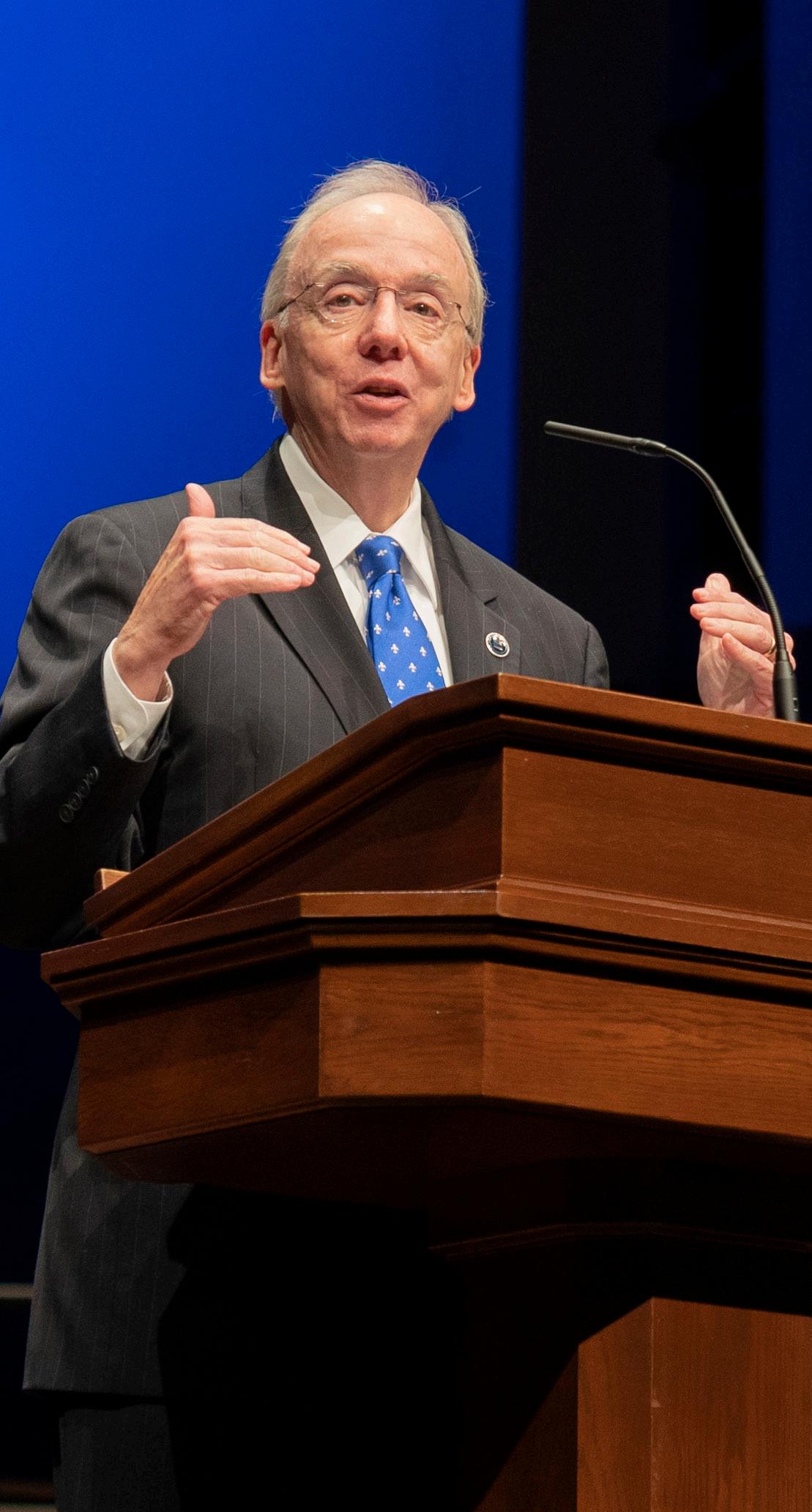
Dockery said the statement “shows a reaffirmation and recommitment to two of our treasured core values.”
He noted the statement says to the Southwestern community and those “external” to the Fort Worth campus that “we are committed deeply to the inspiration, truthfulness, full authority, and sufficiency of Scripture and that
like our founder, B.H. Carroll, we are biblicists, but even beyond we are confessionally guided,” referring to the seminary’s founder and first president.
The values are two of six newly stated core values that were presented to the board of trustees at its April meeting. Dockery highlighted the first value, grace filled, during his Jan. 24 convocation address. The other values include Christ centered, student focused, and globally engaged.
Included in its entirety as part of the printed Founder’s Day program received by attendees, the statement was affirmed by the faculty of Southwestern Seminary and Texas Baptist College, the seminary’s undergraduate college.
Recalling the heritage of Southwestern Seminary as displayed through the faculty over the institution’s 115-year existence, the statement acknowledges the institution is now in a “pivotal moment” in its history and a “distinctive moment in the Southern Baptist Convention and North American Christianity.” The statement notes the centrality of the Bible at the founding of the Fort Worth institution, noting that “a commitment to the full inspiration, authority, and sufficiency of Scripture has been the hallmark of a faithful Southwestern identity.”
God,” while also recognizing, “The Bible is to be seen as the ultimate standard of authority for God’s people.”
“The Southwestern community joyfully affirms the complete truthfulness and absolute authority of God’s Word,” the statement reads while also “stress[ing] both the divine and human aspects of Holy Scripture, while affirming that the Bible, the Word of God written is inerrant and fully trustworthy.” The statement also adds, “We express our full confidence in the inspired and inerrant Scriptures as the trustworthy, reliable, and authoritative Word of
In highlighting the value of being confessionally guided, the statement notes, “We serve in a cultural context in which many fail to recognize there is an identifiable body of truth, and this truth is the Christian faith.” The statement recalls the history of the Baptist Faith and Message, including its original adoption at the Southern Baptist Convention meeting in 1925. L.R. Scarborough, Southwestern Seminary’s second president, led the institution’s faculty to “embrace and affirm” the statement of faith. Noting that the faculty “envision[s] a future for Southwestern Seminary that is faithful to the best of its heritage, built upon a full-orbed doctrine of Scripture, which affirms that those beliefs and practices that rest firmly on scriptural foundations are authoritative for us as a people of the Book,” the statement acknowledges “that confession of the Bible’s truthfulness is an important safeguard, which is needed for an orthodox statement on matters of Christology, the doctrine of God, and salvation, as well as matters such as regenerate church membership, church autonomy and cooperation, as well as believer’s baptism and the Lord’s Supper.”
“In doing so, we affirm the truths expressed in the Baptist Faith and Message 2000,” the statement continues.—A.A.
Editor's note: To read the entire story and faculty statement, please visit swbts.edu/ values
“
We serve in a cultural context in which many fail to recognize there is an identifiable body of truth, and this truth is the Christian faith.
The Bible is to be seen as the ultimate standard of authority for God's people.
“
AT THE CORNER OF STANLEY AVENUE AND WEST BROADUS STREET
ON THE CAMPUS of Southwestern Baptist Theological Seminary, a dream almost four years in the making became a reality Jan. 13 when “Mary’s House,” a partnership between the seminary’s World Missions Center (WMC) and the Woman’s Missionary Union (WMU) of Texas, opened to the first missionaries-in-residence serving with the International Mission Board (IMB).
“I'm so grateful that in Texas these women are dreaming dreams about a place like this where missionaries can not only have sanctuary, but where this place can be a sanctuary for students who will have exposure to normal missionaries, not clinicians who talk about strategies and methodologies” but missionaries who are raising families on the field while serving, said Ian Buntain, director of the WMC and associate professor of missions in the Roy J. Fish School of Evangelism and Missions.
Following his remarks and a prayer of dedication by John D. Massey (’01), dean of the Fish School, Buntain and Massey joined Matt Queen, interim provost at Southwestern Seminary, Tamiko Jones, executive director-treasurer of WMU of Texas, Earl Ann Bumpus (’78), president of WMU of Texas, Beth Campbell, project manager for the Mary Hill Davis Offering, and Teri Ussery, missional lifestyle strategist for adults for WMU of Texas, to cut the ribbon and welcome one of two families
present who will be the first occupants of the home.
Named after the late Mary Hill Davis, who served as president of WMU of Texas for 25 years beginning in 1906, the home was the idea of the late Brent Ray, a former IMB missionary in South America who died unexpectedly in August 2020 while serving as WMC director and associate professor of missions.
Jones said in early 2019 Ray and Massey visited her in her office to share the vision of the house. She explained the vision and the naming of the home after Mary Hill Davis came from Ray. With the assistance of the architectural team of the Baptist General Convention of Texas (BGCT), Jones said they began “dreaming about this.”
The house includes two fully furnished apartments, each on a separate floor, that have fresh paint, new carpeting and appliances, and other items to make the space comfortable.
“We love our missionaries, because they are brave, they are courageous and when they return stateside, we want to love on them, right?” Jones concluded. “We want to care for them so that whenever God does send them back out, or while they're just serving here, they feel that love and they're able to then pour that back out to continue to do what He's called them to do. So, we're excited to be a part of this.”—A.A.
SOUTHWESTERN SEMINARY’S WORLD MISSIONS CENTER HOSTED THE FIRST SENDING CHURCH CONFERENCE on March 16. Churches from Texas and Oklahoma desiring to learn how to send missionaries learned through large group and breakout sessions from former missionaries and state convention staff.
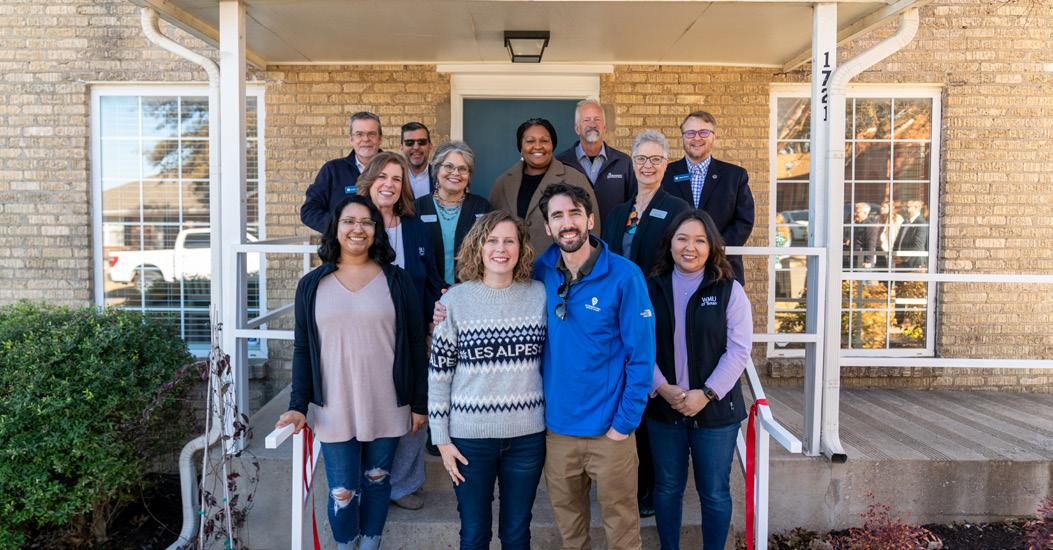
Ian Buntain, director of the World Missions Center and associate professor of missions in the Roy J. Fish School of Evangelism and Missions, opened the conference by welcoming the attendees who represented over 20 churches. Buntain referenced how his life was personally changed by the work done by Southern Baptists when he said, “my eternal life was

forever changed because Southern Baptists exist to send.”
Buntain, a native of Canada, explained that his mother was converted to Christianity through a Southern Baptist missionary who was called to serve in Canada. “My mother was a communist who hated many things,” said Buntain. “She met a missionary who shared
the Gospel with her and changed her life.” After his mother became a Christian, she shared the Gospel with “some drunk who stumbled into a Baptist church” who eventually became Buntain’s father.
For the Sending Church Conference to be a success, Kirsten Burns, coordinator in the WMC and Master of Divinity student from
Apex, North Carolina, described the planning as a collaborative process as the WMC was able to “talk with churches about the need for conferences like this,” as well as the Southern Baptists of Texas Convention, the International Mission Board, and the Send Network of the North American Mission Board.
In the first large group session, Stu Cocanougher (’92), share strategy pastor at Southcliff Baptist Church in Fort Worth, Texas, spoke on “How to be a Missional Church.” He said because the church as a whole exists to be the hands and feet of God’s blessing to the earth, “missions should not be a specific area of your church ministry plan; it is a reflection of the nature of God.” Cocanougher stated that a large problem with American churches today is that they “believe the Great Commission only applies to a select few.”
During the breakout session on sharing
AMONG THE 21 SOUTHWESTERN BAPTIST THEOLOGICAL SEMINARY AND TEXAS BAPTIST COLLEGE (TBC) STUDENTS who participated in Revive the Nation during Spring Break, one slept on a pig farm and began his day by feeding the pigs while other students stayed in more traditional accommodations, even some quite nice. As the students and three professors from Southwestern and TBC stepped into various pulpits in 11 states around the nation, they entered into a 50-year tradition at Southwestern that seeks to take the Gospel to various parts of the United States while simultaneously providing students an opportunity to put their classroom lessons to work.
Trey Cole, a Master of Divinity student from Iola, Texas, preached revival services at Cameron Baptist Church in Cameron, West Virginia, and experienced unique accommodations staying at a pig farm with snow every day.
“The church had been so faithful and had been praying for 13 weeks,” Cole said, adding that “a lady prayer walked around the church” praying for revival prior to his arrival. “It was such a cool opportunity just getting to see the power of their prayer.” Cole was excited to experience 10 baptisms, two of which included a 41-year-old and someone over 60 years old. Also included in the number of salvations was the pastor’s brotherin-law, whose wife had been praying for him for more than 30 years.
Revive the Nation, which has existed under a variety of names for over five decades at Southwestern Seminary, allows male students to fill the pulpits to preach revival services at churches that request a preacher.
“Revive the Nation personifies the evangelistic and pioneering spirit
Christ among cultures and religions, Bruno Molina (’04, ’18), director of interfaith evangelism for the Southern Baptists of Texas Convention, shared his experience from his many years of cross-cultural evangelism. Molina said that “even though all Christians are called to go, many aren’t leaving the walls of their church into their community.” He emphasized churches need to know their communities and the various cultures so they can share Christ well and not offend people’s cultural backgrounds in the process.
Buntain gave some closing remarks encouraging the churches and attendees who were part of the conference. He thanked them for seeking ways to help grow missions in the Southern Baptist Convention and let them know that what they did at the conference “may seem weird to some, but it is beautiful in the sight of the Lord,” he concluded.—J.D.
of Southwestern Seminary,” said Matt Queen, interim provost and vice president for academic administration and professor of evangelism. “I thank God for introducing ministry partners to Southwestern who have provided gifts that ensure the perpetuity of this innovative initiative. After hearing the testimonies of our student preachers, I’m convinced that this program not only informs their current and future ministries, but encourages the churches and pastors who hosted them.”
The students saw God at work as they witnessed salvations, recommitments to Christ, baptisms, and new commitments to be dedicated to being involved in church again. The blessings from their week at Revive the Nation were shown in many ways.
At Sawdust Road Baptist Church in Spring, Texas, “the Gospel was preached and people responded to it by personally coming to testify that the Word touched their lives,” said Omotayo Adetutu, a Doctor of Ministry in biblical counseling student from Nigeria, who spent the week preaching at the southeast Texas church. “They would pray daily for the sinners in their neighborhoods and witness as the Spirit of God moved them.”
“Being able to get away from the seminary and the laser focus of accomplishing schoolwork to go serve with normal people who are very excited to have you is an incredibly refreshing and motivating experience,” said Glenn Melvin, a Master of Divinity student from Curtis, Nebraska. Melvin preached at First Baptist Church in Ferriday, Louisiana, and experienced “the constant outpouring of love from the host church.” Christopher Williams, a Master of Divinity student from Madrid, Spain, went to Primera Bautista Church, the first Hispanic church in the United States, located in Laredo, Texas. “It is such a blessing to put yourself out there and really force yourself to trust God to move through you. It can be daunting, but God is faithful,” said Williams.—E.B.
“
Missions should not be a specific area of your church ministry plan; it is a reflection of the nature of God.
It can be daunting, but God is faithful.
WHILE MANY STUDENTS SPEND THEIR TIME GOING TO THE BEACH, GOING ON VACATIONS, OR JUST CATCHING UP ON REST, 10 WOMEN from Southwestern Seminary and Texas Baptist College spent their Spring Break serving the Lord in New York City where they saw both human “brokenness” and God at work. Sponsored by the World Missions Center and working through SEND Relief, a partnership of the North American Mission Board and the International Mission Board, the women spent four full days serving alongside Graffiti 2 Baptist Church and its ministries in the South Bronx.
Ashley Allen (‘03, ‘09), assistant professor of women’s ministries at Southwestern, led the group of six graduate-level students representing the seminary’s four graduate schools and three students from the undergraduate college on the mission trip.
school program for elementary through high school students. “It was a joy to help with the kids,” said Cristina Aguilera (‘19, ‘21), a Doctor of Education student who is originally from Columbia. “This place is a refuge for some of the children and teenagers where they are loved, encouraged and they learn about the Lord and the Gospel.”
Though the mission trip showed how God was moving in the city of New York, there were still some things that were tough to experience for the group. “The women’s trip to New York City was life-changing for me,” said Catherine Chan, a Master of Divinity student who is from Malaysia. “For the first time, I was up close with people suffering from drug addictions. All my life, I have lived in a safe neighborhood, and I have never seen so much brokenness.”
Through the stop-and-care ministry, the team was able to spend specific time sharing the Gospel and providing for the physical needs of the homeless people in Mott Haven. “I walked around this neighborhood with our team and talked with several homeless people,” said Hannah* a Master of Music student from East Asia. “We initiated conversations with them, connected them to the church, distributed hot coffee and food kits to them, and shared the Gospel with them.”
While some can be distracted by the depictions of New York City from various media outlets and movies, one Master of Divinity student from Southeast Asia, Alexandra*, said she saw the “darker picture” of the city. “Before I went on this trip, I never thought New York City had this dark-
The group worked in the neighborhood of Mott Haven. Alongside the pastor, Andrew Mann, the group was able to serve the church in specific ways to meet their needs, not to simply lead a special project.
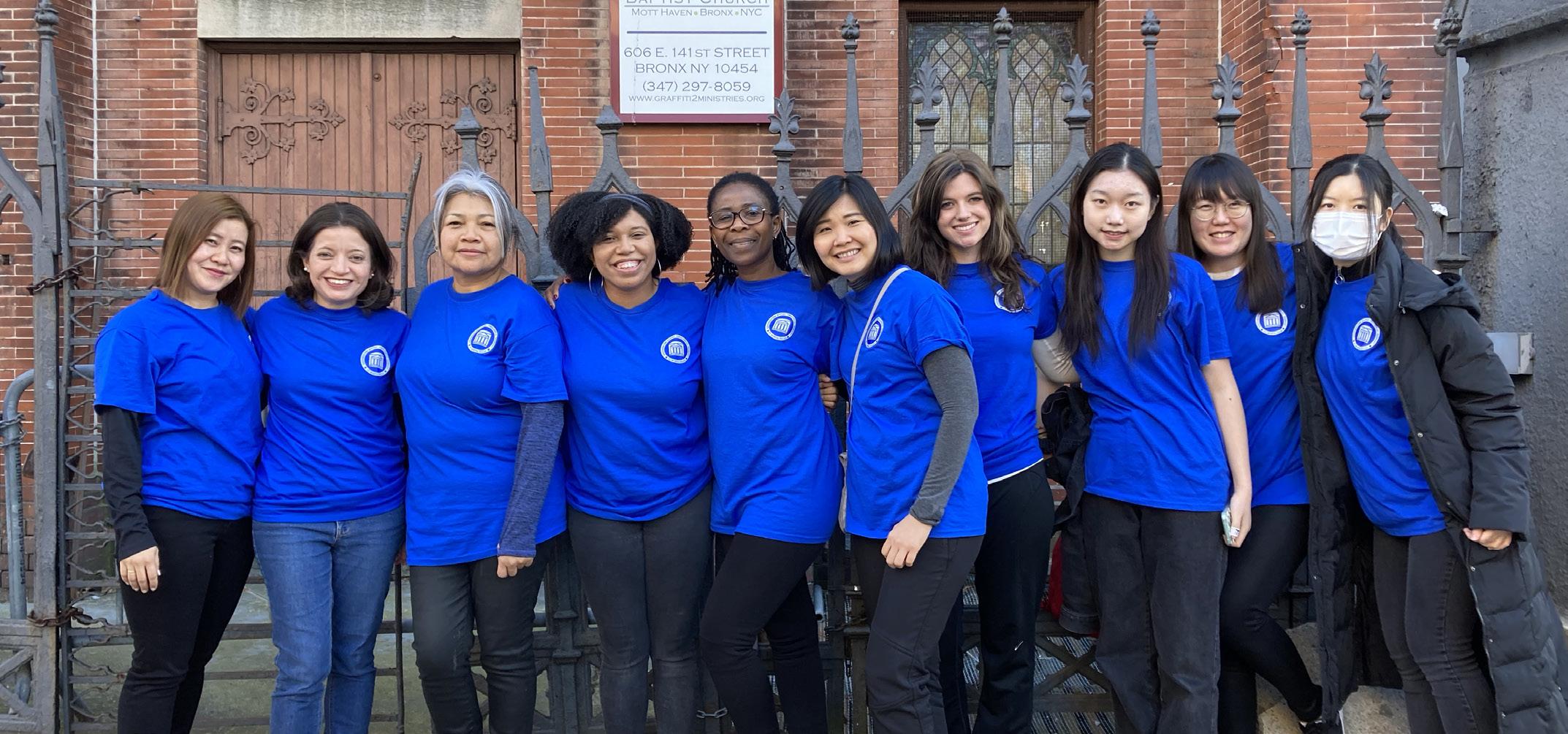
The team of women was split up among different areas to help the church reach its community as a whole. Daily the students were either handing out coffee to people in the community to use as an evangelism and outreach tool, going to a local school to help do any tasks they needed help with, or would work with the church’s stop-and-care ministry which seeks to help the homeless in their community have various things needed for their everyday life.
The entire team would come together to assist with the church’s after-
ness,” said Alexandra. “I always thought that New York was this place where everyone had a beautiful life.”
After seeing this city, Alexandra said she knows that “there are many souls” who need “the Gospel” and “who need to be shown the love of Christ.”
“I pray that God [will] send light to those people who are in darkness,” said Alexandra. “And if God wills it, I would love to be the one to show that light.”—J.D.
*Names changed for security reasons and to protect future mission work.
SOUTHWESTERN SEMINARY FACULTY SPENT TIME TEACHING, TRAINING, AND EQUIPPING PASTORS AND MINISTRY LEADERS on four different continents in recent months. In December of 2022, Jonathan Okinaga (’16, ’19), assistant professor of biblical counseling, traveled to Japan to help train pastors, lay leaders, and missionaries to counsel God’s Word to a lost and broken nation. “I’m blessed to be part of a rich tradition of Southwesterners who are able to minister the Gospel to all nations,”
Okinaga said.
Over two international trips in the month of March, Juan R. Sánchez, associate professor of theology, was able to encourage and care for pastors in Argentina and Ireland. Sánchez spoke at a gathering of Baptist pastors in Ireland and at the 9Marks Weekender conference in Argentina. He said he was “encouraged” by “their hunger and their desire to learn to know what the Bible says.”
Malcolm Yarnell III (’91), research professor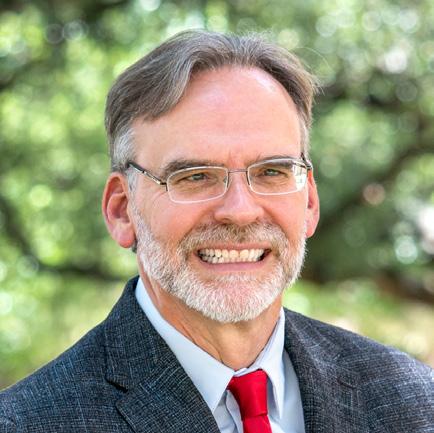
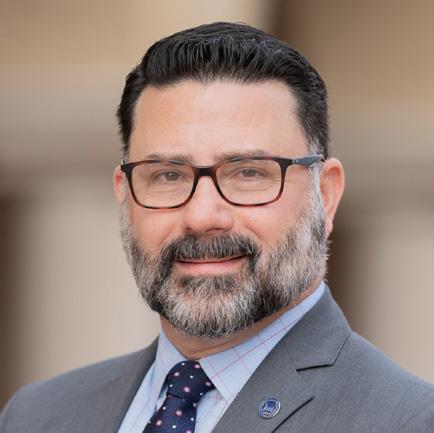
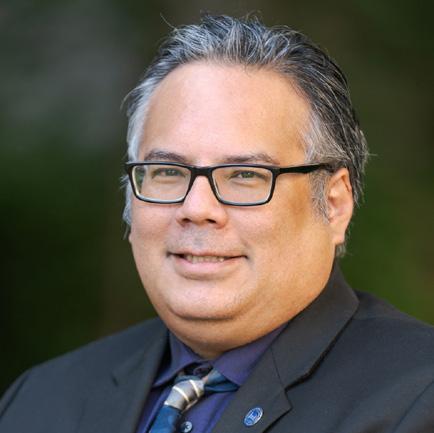
of theology, journeyed to Budapest, Hungary, to present at three different meetings of Hungarian Baptists in April. During his trip, he spoke at the Scientific Memorial Conference, Úzpest Baptist Church, and the Hungarian Baptist Theological Seminary. “I was encouraged by how much the Hungarians valued strong theological education as we Southern Baptists do,” said Yarnell.—J.D.
MORE THAN 130 PEOPLE PROFESSED FAITH IN CHRIST AS 84 STUDENTS enrolled in Southwestern Baptist Theological Seminary’s Introduction to Missiology and Contemporary Evangelism practicums shared the Gospel almost 1,100 times during the fall 2022 academic semester, seminary leadership announced today.
“Southwestern Seminary professors offer students weekly scheduled times through ‘Everyday Evangelism’ so they can join the professors to evangelize the greater Forth Worth community in its neighborhoods, parks, and local college campuses,” said Interim Provost Matt Queen. “In addition, a number of practicum students utilize the seminary’s relationship with NeedHim Global, in order to share the Gospel over digital platforms. However, the vast majority of students’ evangelistic encounters occur by their own initiatives.”
On average each student enrolled in the practicums shared the Gospel almost 13 times during the semester, which was more than twice the number of Gospel presentations per student enrolled in the practicums during the spring 2022 academic semester.
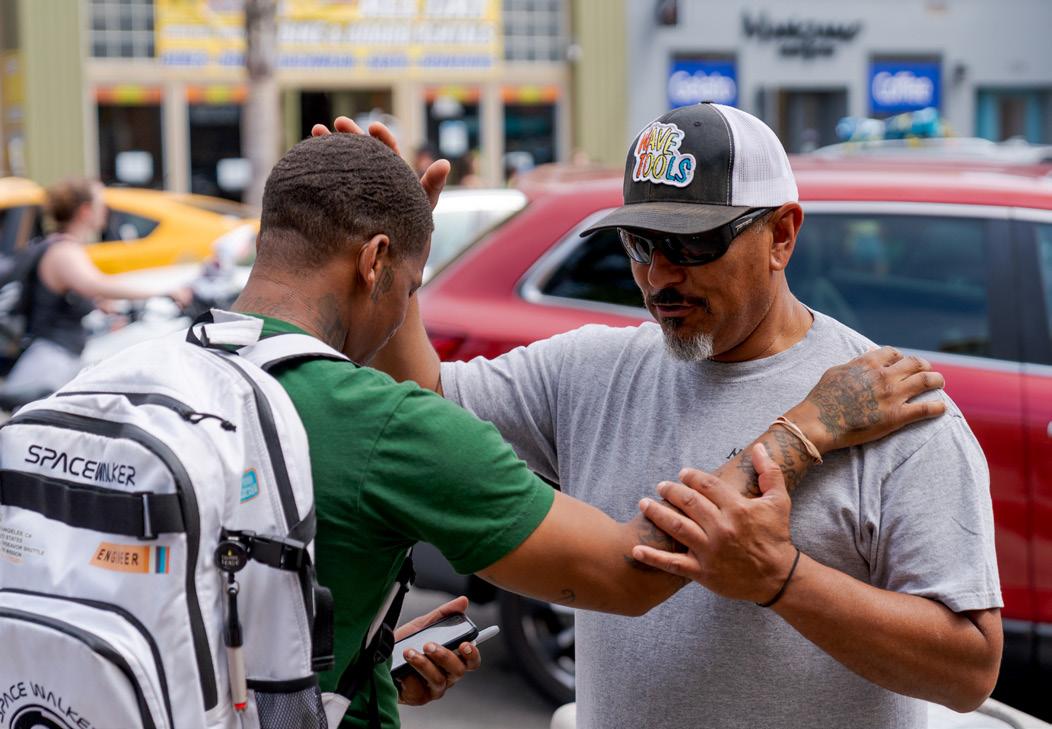
Ying Mao* (’22), a student from East Asia who enrolled in the practicum during the fall semester before her December 2022 graduation, said she was “very familiar” with the Great Commission in Matt. 28:18-20 and “some evangelism tools and training like Three Circles and Four Spiritual Laws” but wondered “how often and where I should go to witness.”
Mao, who shared the Gospel 64 times and saw two salvations during the semester, challenged herself to “witness in a park for one hour a week by using a one-verse evangelize card.” She explained she consistently went to the park which allowed her to have multiple conversations with the same individuals, including one man who was Jewish who “believed in the Law rather than the Gospel.” Mao began to pray for the
man and on a subsequent visit with him, she read the Old Testament passage from Micah 7:18-19 to him.
“I told him that God has compassion on us and will not remember our sins when we put our faith in Jesus,” Mao recalled. “He said, ‘Amen, Amen! This is from Torah!’”
“I was just going to check off a seminary assignment to share the gospel with 12 people,” Mao concluded. “I was thinking ‘it is an easy assignment for me because I enjoy knowing people.’ However, I realized that my goal is not to check off a task but to continue a task that has already been assigned to us by our Lord Jesus Christ.”—A.A.
*Name changed for security reasons.
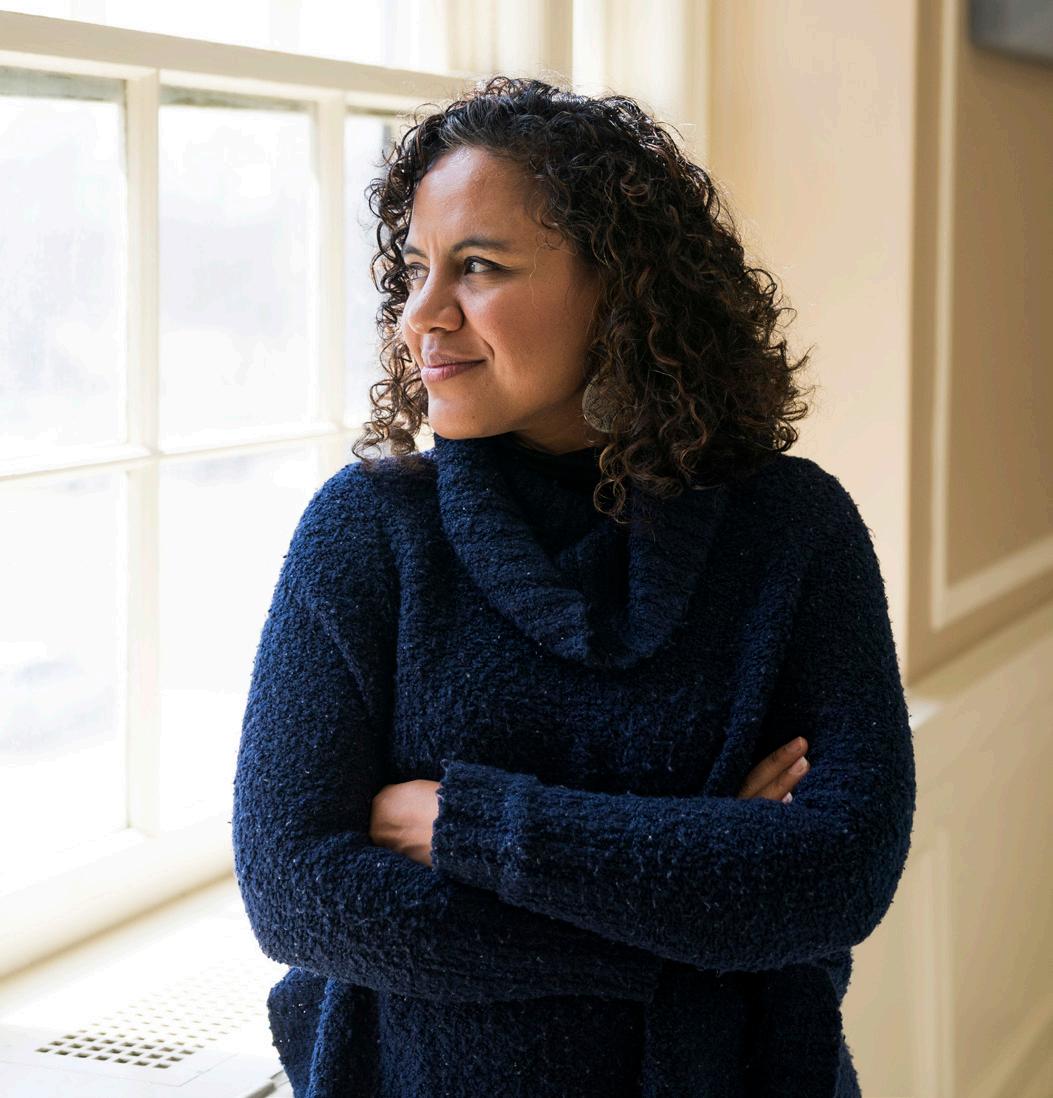
“I CHOSE SOUTHWESTERN BECAUSE OF THE WONDERFUL MUSIC PROGRAM THEY OFFERED. When I read the three main areas of focus in the School of Church Music and Worship, I knew God was calling me to be trained here. The music school seeks to train leaders that are biblically faithful, musically excellent, and ministry driven. That’s what drew me to Southwestern, because that’s the need I saw in so many churches regarding worship ministry. However, it wasn’t until I started my studies here that I realized how rich the learning experience would be. I’ve found an outstanding balance between theology classes, worship studies, and music practice that has given me a wider scope of what it means to engage music for the kingdom of God. What’s more, I’ve found a loving and passionate community of faculty, staff, and students that encourage me to follow Christ and stay the course in loving God and loving others. For that, I am deeply thankful that God brought me here.”
“I LOVE TEACHING AT MY ALMA MATER, SOUTHWESTERN, because it is a Great Commission seminary. Being a part of the faculty of the Fish School of Evangelism and Missions is a special opportunity to be a part of a faculty that is teaching and preparing students from around the world in multiple languages to proclaim the Gospel to all the nations. My students in Hispanic Programs are an inspiration to me and a strategic force in fulfilling God’s mission.”
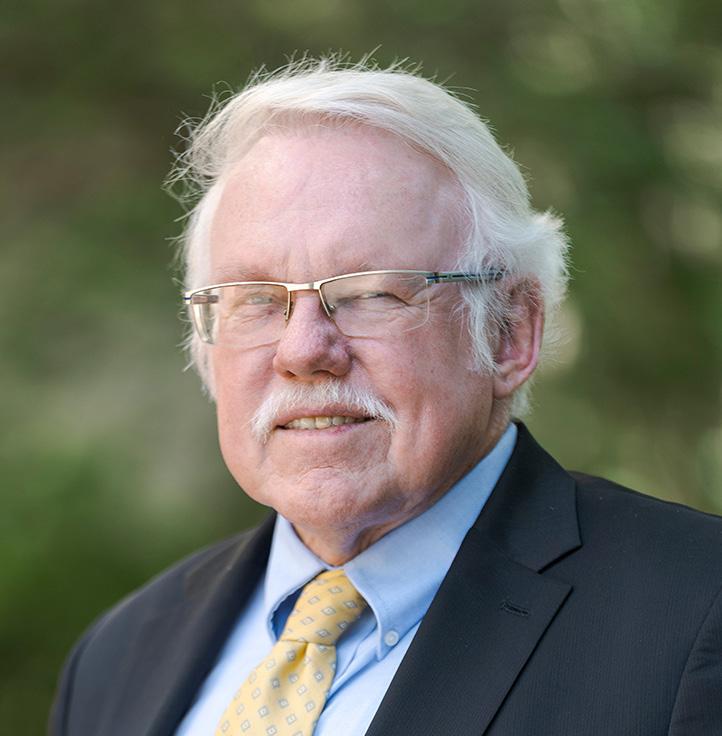
Southwestern Seminary exists to train people for the work of ministry. And it’s the people who make Seminary Hill a special place. It’s easy to see why.

Master of Arts in Christian Education, 2004; Women’s Ministry Specialist, Arkansas Baptist Convention
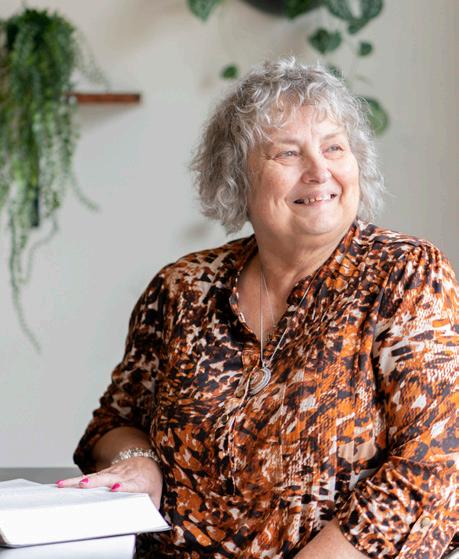
“MY JOURNEY TO SOUTHWESTERN STARTED WITH A BOLD PROMISE in a moment of surrender, ‘Lord, I will do whatever You tell me to do.’ Of course, I never intended for seminary to be part of the equation. I grew up with dyslexia and felt out of place in academic settings. I remember my first day at the Little Rock, Arkansas, extension campus. I was a young wife and mom with plenty of irons already in the fire. So, I decided that if I made it through my first day of orientation, that would ‘count’ as attending seminary. I am thankful God had other plans! Semester after semester, my family trusted God to provide financially for my education and academically for me to succeed. As I walked across the stage to receive my diploma, it was a testimony to God’s goodness and the support of family, friends, professors, and our local church. Twenty-two years later, I thank God for my education and the ministry relationships I made at Southwestern. I am grateful for my time at Southwestern. I was equipped for ministry and trained to be a life-long student of the Word.”
“I WAS INTRODUCED TO SOUTHWESTERN BY DR. JACK TERRY. He promoted Dressed for Service in our Sunday School class during its infant stage. I began giving what little extra I had to help dress the ladies. This evolved into my being invited to attend Women’s Auxiliary and later Widow's Might events. I was invited to be a mentor for the Dressed for Service shopping days. I have met many ladies from all over the world, learned about their family stories, sacrifices to
allow their husbands, and many times themselves, to travel to Fort Worth to be a part of Southwestern. God blessed me to be able to give additionally toward the remodel of the Naylor preschool facility several years ago. As God continues to provide, I continue in giving to ministries at Southwestern. This is one of my ways of reaching the world for Jesus. I thank God and cherish each friendship I have made with Southwestern staff, students, and wives.”
Donor“My journey to Southwestern started with a bold promise in a moment of surrender, ‘Lord, I will do whatever You tell me to do.’”ROBERT CALDWELL Professor of Church History
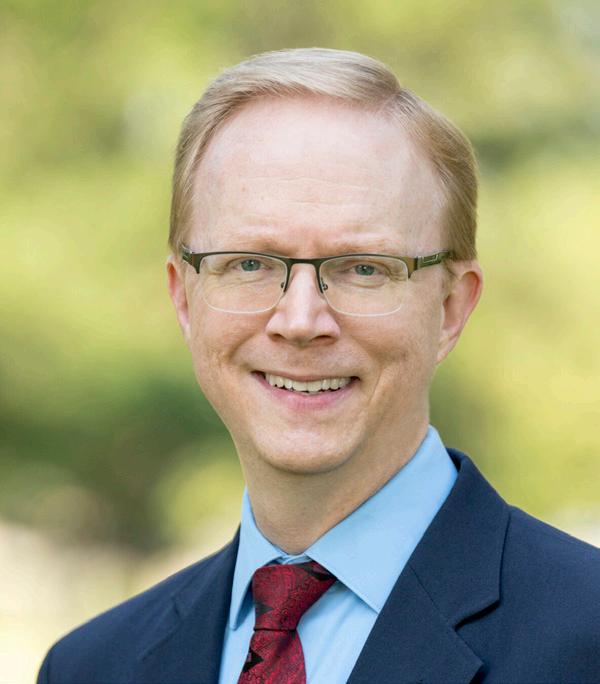
“I ENJOY TEACHING CHURCH HISTORY because it is a lot like passing down wisdom; more specifically theological, spiritual, and practical wisdom from Christians in times past. They weren’t perfect, and we aren’t perfect, but we can learn from their mistakes and stand confidently on their shoulders when they stood firm for Christ and His Word. I enjoy seeing students come to realize that the great stories of church history really do connect with and inform the personal stories of students’ lives and their ministries. This is what keeps me coming back to teach church history semester after semester. It’s what drives me to dig further into the topic and refine my teaching. And hopefully it helps in building up the church to the glory of God.”
Master of Arts in Christian Education student
“I’M SO GRATEFUL FOR MY TIME AT SOUTHWESTERN BAPTIST THEOLOGICAL SEMINARY. Coming out of college, I was working in an internship at a church in North Dallas, and there was really no question where I would attend seminary. To me, Southwestern was the only option. The whole idea of the ‘sun never setting on the ministry of Southwestern’ inspired me greatly. I loved its rich history, the emphasis the school placed on missions and evangelism, and how passionate the professors were to train and influence their students to go out and make a difference in the world. The courses I took helped prepare me for ministry at the local church level and the friendships that I made while attending the school still hold strong today. There is no doubt that I am a better pastor and preacher because of the investment Southwestern made in my life.” STUDENT
“I DESIRED TO GROW INTO A BETTER MINISTER TO KIDS AND FAMILIES BUT WAS APPREHENSIVE ABOUT GOING BACK TO SCHOOL. After a conversation with Dr. Shirley on a campus tour, I knew that studying at Southwestern was the right step for me. I count it an honor to learn from people like Dr. Shirley or Dr. Kennemur, some of the best practi-
tioners in family ministry, and have already seen countless times how experiences in the classroom have helped me more effectively partner with parents in pointing kids to Jesus. I am grateful for the investment of faculty in my life and ministry - there is no better place to study family ministry than Southwestern.”
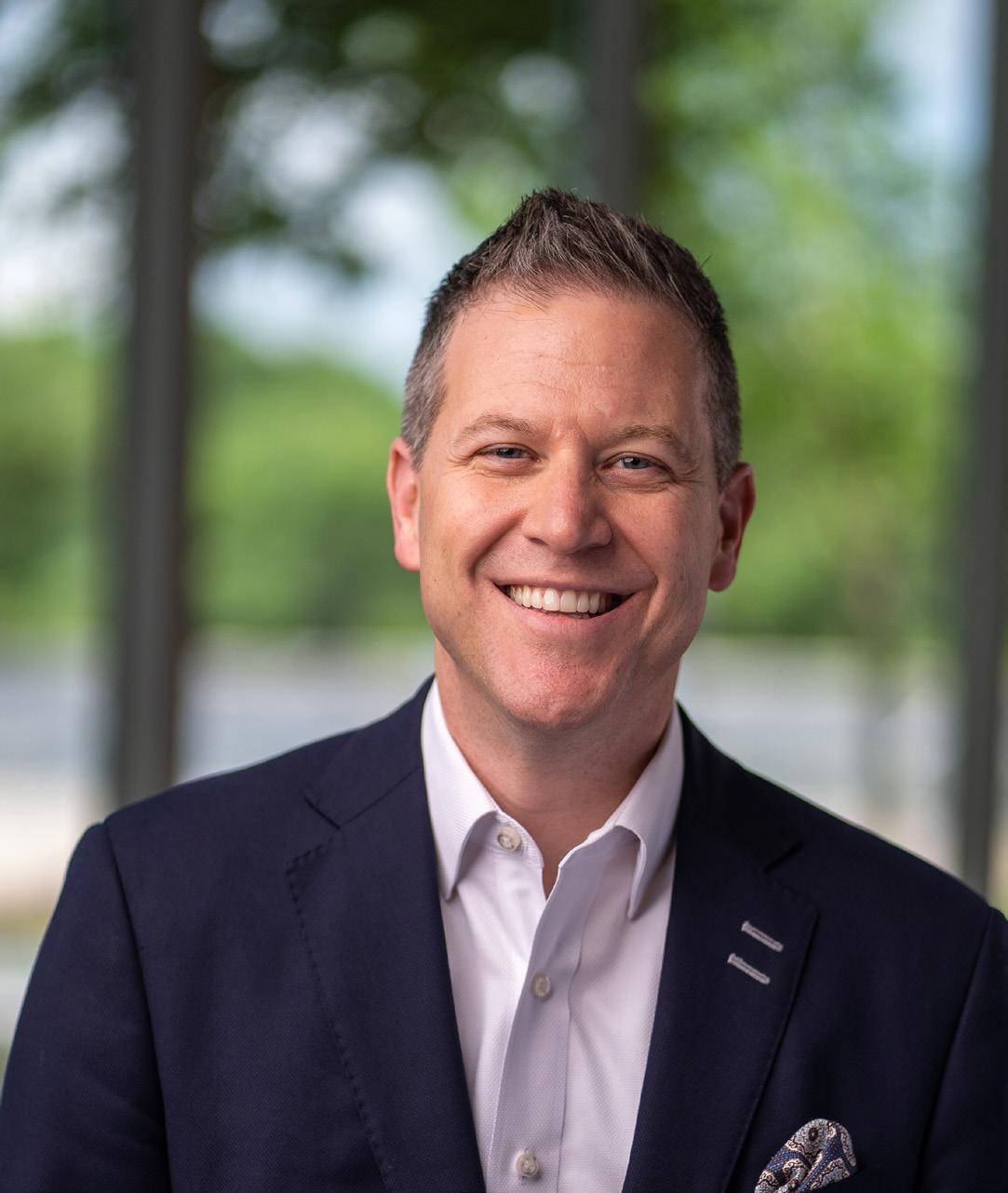
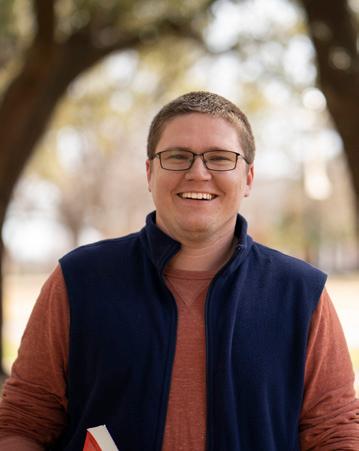
“I enjoy teaching church history because it is a lot like passing down wisdom; more specifically theological, spiritual, and practical wisdom from Christians in times past.”


MOST STUDENTS WANT TO EVANGELIZE, BUT THEY HAVE INADEQUATE PREPARATION FOR AUTHENTIC GOSPEL ENGAGEMENT. Eightythree percent of Generation Z are more open to sharing their Christian faith than their Millennial predecessors. However, the group's primary approach to evangelism is through their lifestyle over verbal proclamation. So, how can we both inform and prepare students for genuine Gospel engagement? The following are three keys to getting students to participate in authentic Gospel engagement.
Encourage students for authentic Gospel engagement.
Identify reasons for students' involvement in evangelism. Students often do not participate in evangelism because adults have yet to give adequate reasons for evangelism. Let them know that their willingness to share the Gospel finds motivation from the two great commandments of Scripture, love for God and others. Additionally, supply observable motivations for Gospel engagement. Supply various statistical age-group data demonstrating how
sin and lostness manifest in brokenness. The areas include pregnancy, suicide, drug abuse, and other issues plaguing youth. Providing biblical and practical motivations help students disregard the idea that verbal proclamation is intrusive but rather necessary.
Equip students for authentic Gospel engagement.
Give students a simple yet effective means to share the Gospel. In Acts 26, Paul gives his salvation testimony which, by implication, describes the three stages of every person's life. The components include 1. The student's life as a sinner before accepting Christ, 2. How and why they accepted Christ, which includes the Gospel they believed and 3. How their life changed after accepting Christ. The method is easy to memorize because it is the student's experience. Additionally, it's organic and relational because we naturally share life events as we converse. The student's salvation testimony effectively lets their peers know how they received salvation and that it is available to them.

Provide students with opportunities and examples for authentic Gospel engagement.
For all of the church's attempts to promote the necessity of evangelism to youth, often they end up communicating the opposite. Adults' lack of Gospel engagement communicates to students that "evangelism is not that important." Additionally, we have expected students to go alone to find opportunities. However, best practices and the method of Jesus demonstrate that we must serve as an example to students. Thus, we should provide opportunities for them to watch, learn, and participate. The opportunities should include a natural rhythm of evangelism in the community and mission trips prioritizing evangelism.


MANY PEOPLE SEEKING GOD’S WILL FALL INTO THE TRAP OF “PARALYSIS BY ANALYSIS” AS THEY OVERTHINK THINGS. No one wants to miss God’s will or choose the wrong thing. The result for some is that a decision is not made at all for fear of displeasing God. No doubt the Lord wants us to please and honor Him with our lives and decisions—but how can we know that a potential decision or action will accomplish just that?


The Word of God is a sufficient guide and a sure foundation, even if it does not provide specifics for specific situations. Looking to God’s Word, here are three truths to consider when seeking to know God’s will:
First, delight in the Lord.
Psalm 37:4 says, “Take delight in the LORD, and He will give you your heart’s desires.” Some read this verse and conclude that God will give
us what we want if we delight in Him. But could it be that God will produce in us desires that please Him, if we find our pleasure first in Him?
A Godward delight reflects a trusting heart, regardless of our circumstances: “Rejoice always, pray constantly, give thanks in everything”—and Paul declares—“for this is God’s will for you in Christ Jesus” (1 Thess 5:16-18).
Second, make God’s kingdom a priority.
Matthew 6:33 says, “But seek first the kingdom of God and His righteousness, and all these things will be provided for you.” God knows what we need and He will richly supply. Yet our focus should not be on “stuff,” but on serving Him and walking in His ways. Too often our attention is more on seeking God’s will than doing God’s will!
God’s will is to be found in the crucible of our sanctification (1 Thess 4:3), seeking God’s righteousness above our selfish desires. Perhaps our difficulty in knowing God’s will is truly a battle of desires (James 4:1)—wanting our own way rather than wanting God’s kingdom more.
Third, ask God for wisdom.
James 1:5 states, “Now if any of you lacks wisdom, he should ask God—who gives to all generously and ungrudgingly—and it will be given to him.” God doesn’t want us to wrestle in uncertainty and doubt, so He promises to lavish wisdom on us if we ask Him for it. God graciously responds to those who ask, seek, and knock (Matt 7:7-12).
We should trust the Lord to guide us with wisdom, and we can rest in the truth that He is involved in the details in ways far greater than we can see.
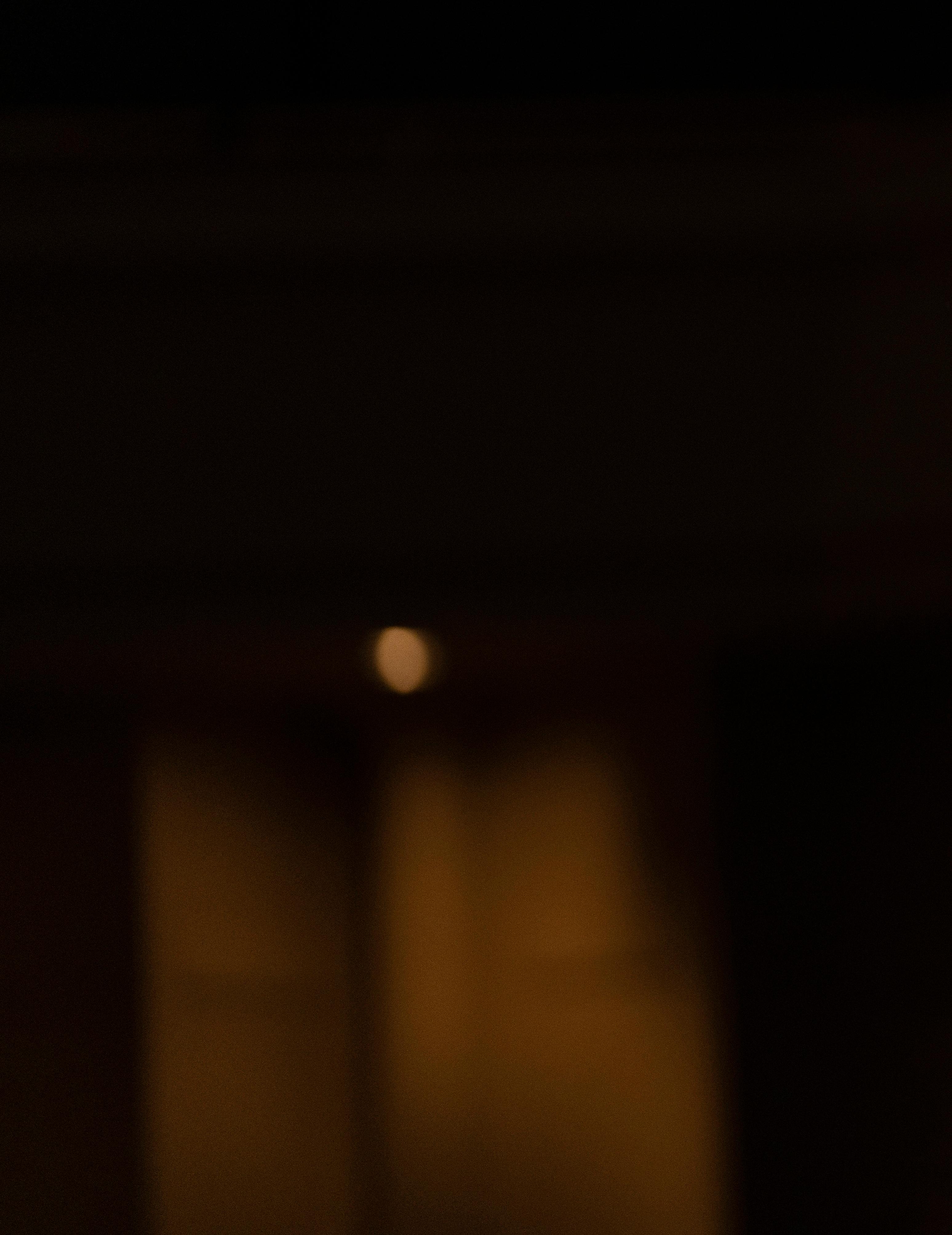
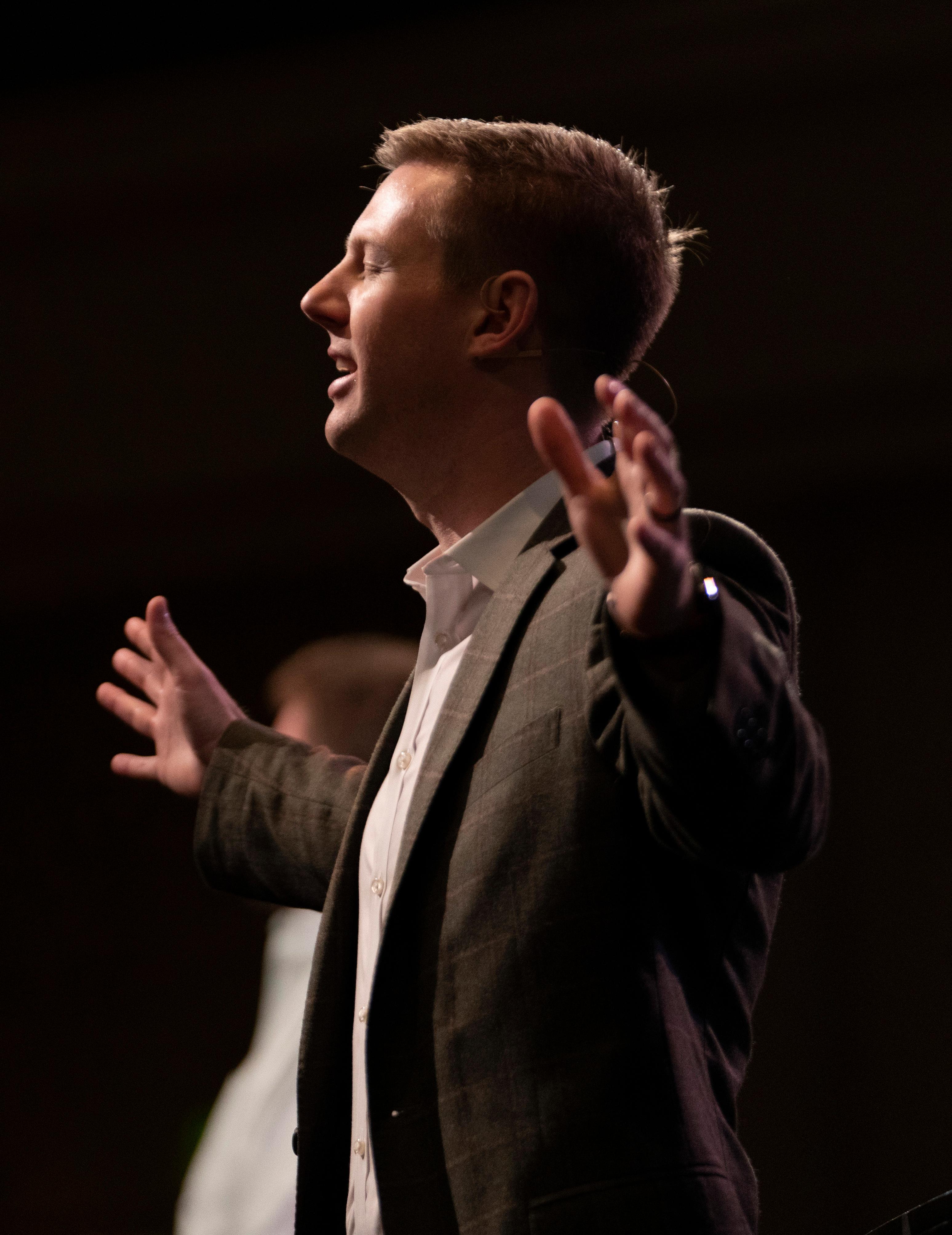
In the ninth chapter of the Gospel of Luke, verse 62, Jesus said, “No one who puts his hand to the plow and looks back is fit for the kingdom of God.” Many seminarians, pastors, and missionaries have studied this verse and embraced it as both a caution and an encouragement to steady their hearts and minds as they embark on the journey of obediently responding to God’s call on their lives.
When he left his home state of South Carolina in 2012 to pursue a Master of Divinity at Southwestern Seminary in Fort Worth, Texas, Daniel Dickard (‘14, ‘17) fixed his eyes ahead, ready to follow God’s calling – regardless of where it might take him.
“When God calls you into ministry, you go wherever He tells you to go,” Dickard says.
For a time, that meant Dickard would serve churches and students while he earned back-to-back degrees at Southwestern. In his role as director of student and church relations, Dickard functioned as a liaison between churches searching for qualified ministers of the Gospel, and students who were actively preparing to live their calling. He helped oversee aspects of the annual Spring Revival Practicum (now called “Revive the Nation”) – a program that began in the mid-20th century at Southwestern with the purpose of sending revival preachers out over spring break to preach in churches across the United States.
Appointed as dean of students in 2017, Dickard continued to invest in the spiritual formation and growth of students both in and out of the classroom. He taught preaching classes, in addition to his other roles, until God called him as senior pastor of Friendly Avenue Baptist Church in Greensboro, North Carolina, in the spring of 2018.
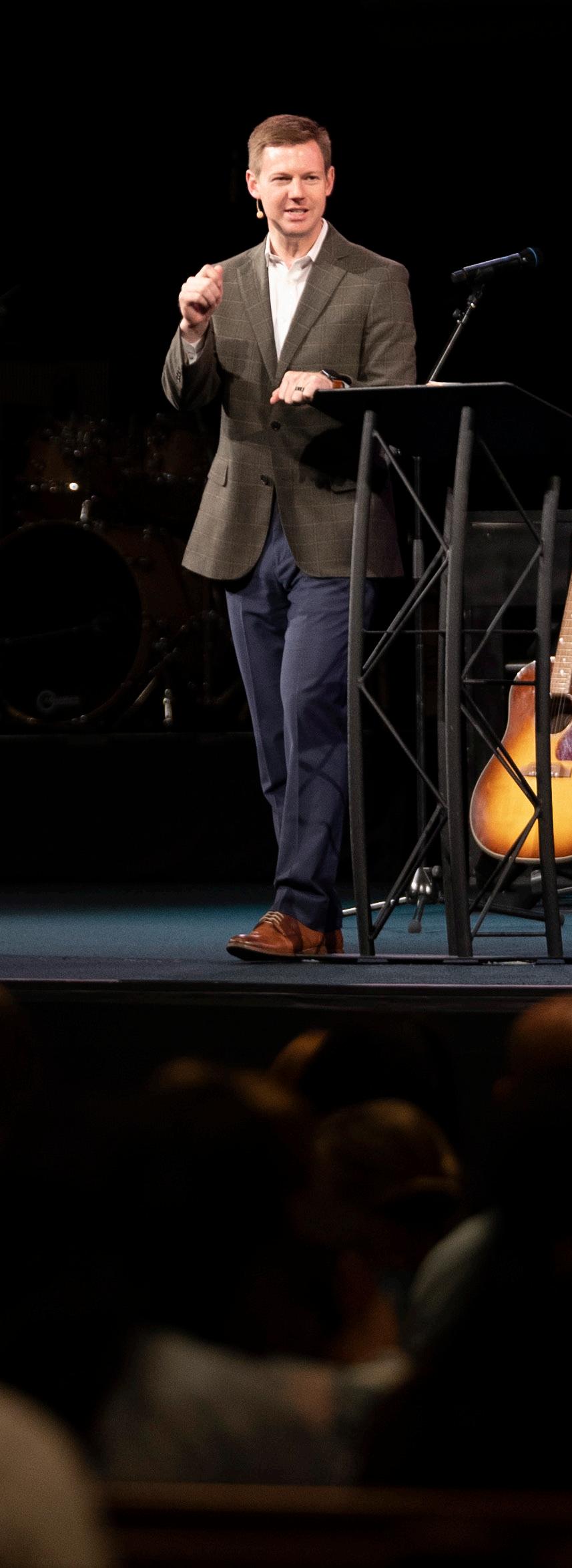
Dickard pastored Friendly Avenue through the COVID-19 pandemic and developed relationships with people at the church that will “last a lifetime.”
Last year when he was approached by a mentor in ministry about submitting his resume for a denominational role, Dickard declined the offer, certain God had called him to be a pastor. The last thing he thought God would ask him to do is to leave the church he had pastored and loved for five years. But when God made it clear that he was amid a transition to another church, Daniel and his wife, Cassie, committed to pray and follow His leading.
In one of the long, carpeted hallways along the outside of the worship center of Shandon Baptist Church in Columbia, South Carolina, Dickard stood with his family while they waited for an answer. Moments prior, in front of a packed worship center, he told those gathered what his ministry would focus on if they were to call him as their next pastor: the Word of God.
“My ministry is not a ministry of innovation or creation,” he told the congregation in his first sermon, preached in view of a call on January 22, 2023. “My ministry is a ministry of declaration – to declare to you what is in God’s Word.”
Ten minutes later, the chairman of the pastor search committee welcomed the Dickard family back into the auditorium to a room full of thunderous applause. The decision was unanimous to call him as the senior pastor of Shandon Baptist Church.
“To see how God and His sovereign and perfect plan saw fit, that I’d be able to come back to my home state, and to be able to lead a church that is making a difference among not only the next generation, but the
When God calls you into ministry, you go wherever He tells you to go.
DANIEL DICKARD
current generation,” Dickard explains. “There’s something special about coming home and seeing God work in your state.”
Eleven years after he moved out of the state, Dickard returned to South Carolina to serve as lead pastor of Shandon but, in many ways, his time at Southwestern Seminary laid a foundation for the ministry to which God had called him.
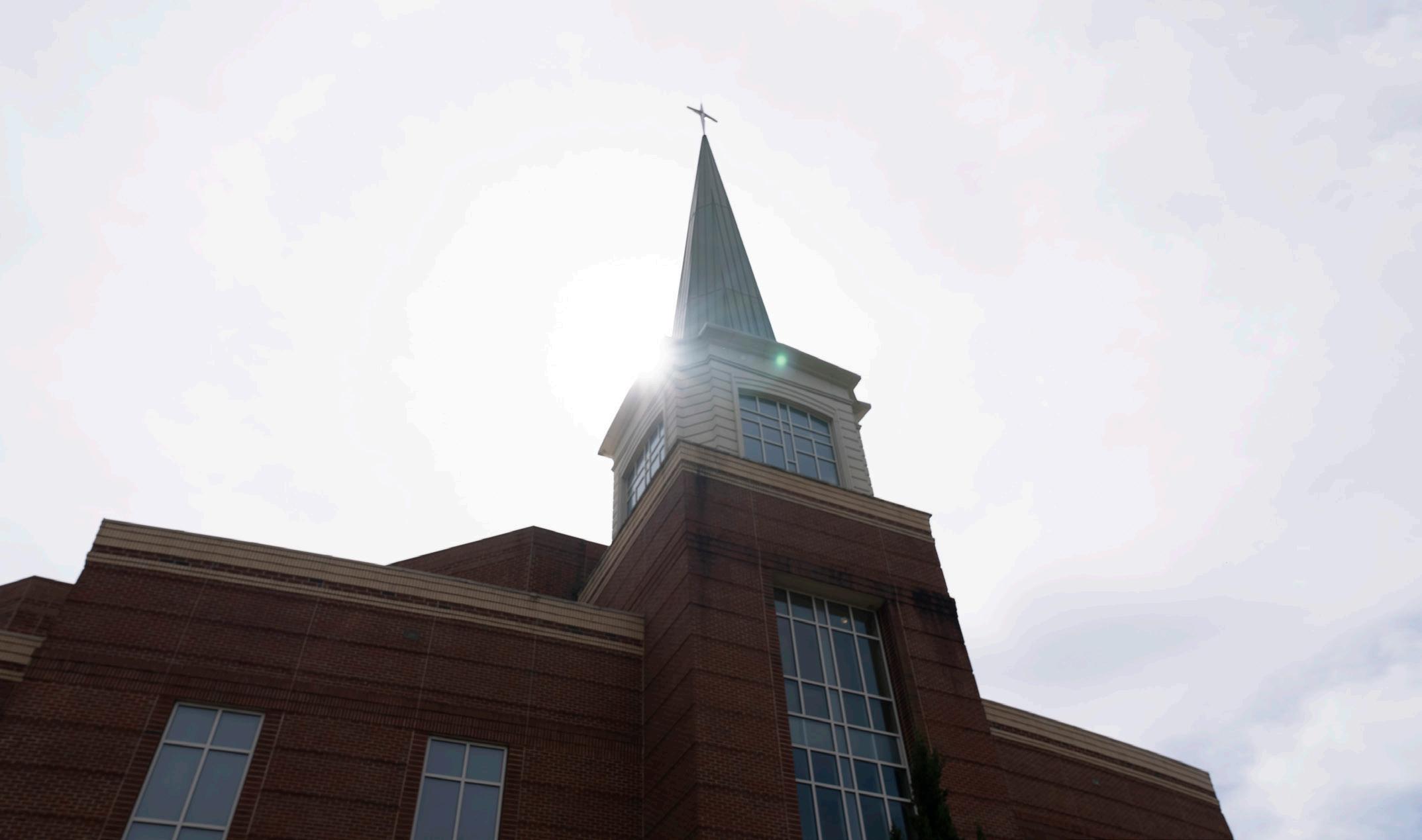
“During my time at Southwestern not only did I gain a love for God, but I gained a love for God’s Word,” Dickard says. “The professors at Southwestern Seminary taught me that before I could be effective in pastoral ministry it begins with loving God and His Word.”
Dickard recalls that his professors taught him that God’s Word is the foundation for ministry. Lessons about ministry were not strictly taught in the classroom but were caught around plates of Mexican food and during discussions in the hallways with professors who weren’t just teachers but became “mentors and family.”
And those lessons have continued to yield fruit in how Dickard has approached his calling as a pastor.
“Southwestern Seminary taught me that it’s the height of arrogance for a pastor to think he has something more to say than what’s in God’s Word,” Dickard asserts. “Our job is to communicate God‘s Word … we are sharing the truth of God‘s words.”
Matthew McKellar (‘85, ‘91), professor of preaching and occupant of the George W. Truett Chair of Ministry, is one of the many professors who had a significant impact on Dickard. McKellar, who served as a pastor for more than 28 years before coming to Southwestern as a professor, supervised Dickard’s doctoral work and taught many of the classes he took.
McKellar considers the fourteen years he has taught preaching at Southwestern Seminary to be one of the “greatest blessings in my life.”
Meeting students in an introduction to preaching class and walking through advanced courses and doctoral supervision, much like he did with Dickard, he gets to see them progress, grow, and have a first-hand view of how “God just opens up their gift.”
“To be a part of that process,” McKellar says, “I don’t know that there’s anything sweeter than to have that opportunity.”
“He set an example of what it means not just to love preaching, but to love the people to whom you preach,” Dickard explains. Cultivating a love for the people to whom he will preach is a priority Dickard is focused on in his first few months at Shandon.
During my time at Southwestern not only did I gain a love for God, but I gained a love for God’s Word.
DANIEL DICKARD
From the moment he arrived at Shandon, Dickard set aside time each week to get to know the members of his church and to hear from them. A conviction he brought with him to Shandon is that a shepherd should smell like the sheep, and he has eagerly sought ways to “be among the sheep.”
When his deacons asked to gather with him every Sunday morning to pray before the service, Dickard requested that they meet early in the morning so he could be out in the worship center among the congregation prior to the start of the service.
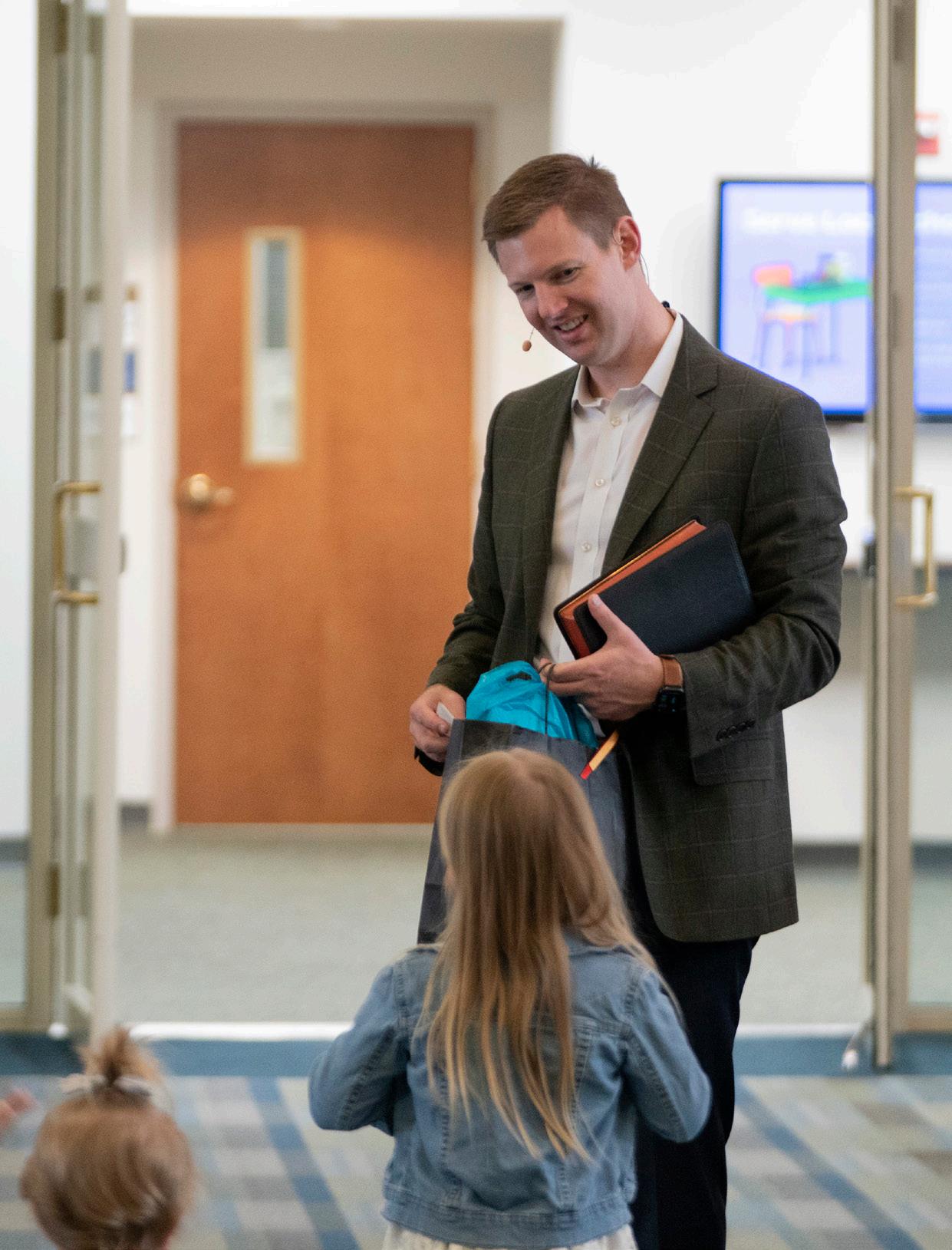
Joe Eudy, a 91-year-old deacon who has been a member at Shandon for 40 years, says this is one of the things he already loves about Dickard: “He’s out among our people before the service, talking to them, loving them, learning their names. He’s being a pastor before he’s a preacher.”
Dickard also implemented a weekly practice he has called, “Cottage Prayer and Listening Sessions.” Modeled after a practice of family ministry notable to the 17th century English theologian and pastor Richard Baxter, Dickard meets with various groups of people in the church once a week during the day and a second time during the week in the evenings to do two things: to listen and to pray together.
During these listening sessions and prayer times, Dickard wants to learn several things – what those in attendance love about Shandon, how they feel ministries of the church can be enhanced, and what they can do to collectively reach their city for Christ. These forums provide an additional way for the pastor to develop relationships in the body of Christ and include a time of prayer.
Dickard recognizes that the “public ministry” of preaching must be firmly undergirded by a strong pastoral ministry and truly getting to know the people. Through the cottage prayer initiatives, he recognizes “we’re seeing the fruits of the labor are getting to know the people that you preach to every week.”
“People are not just an aspect of our ministry; people are our ministry.”
Situated at the near geographic center of South Carolina, the city of Columbia was approved as the state capital in 1786 and is home to the South Carolina State House, the University of South Carolina, and Fort Jackson, an army training center responsible for basic combat training for at least half of all soldiers who enter the United States Army. The second largest city in the state, Columbia was developed at the confluence of the Broad and Saluda rivers where they combine into the massive Congaree River.
Shandon Baptist Church has been rooted in the city of Columbia since it was founded in 1907. The first sanctuary the church met in was built on the corner of Woodrow and Preston streets in a neighborhood district referred to as “Old Shandon.” Originally less than two miles from the State House, Shandon Baptist Church is now located a few miles further east on Forest Drive, a stone’s throw from the front gate of Fort Jackson.
In the 116-year history of the church, Shandon has been an “evangelistic church that is biblically based with a heart for the city.” This heart for the city, and on-going fervor for evangelistic outreach in the community, is part of what God used to draw Dickard’s heart to this city and church.
“What excited me about Shandon was the Great Commission potential,” Dickard said. People come to Columbia for a variety of reasons –some to study at USC, some to be involved in government service in the
People are not just an aspect of our ministry; people are our ministry.
“
DANIEL DICKARD
state capital, and others who have made a commitment to defend their country. But ultimately, what Dickard sees that they all have in common is a need for the Lord.
“Columbia is certainly a place that needs the Gospel; [Columbia] needs the Lord. And I think that Colombia is stronger when Shandon is stronger. It’s our goal that through our ministry here that not just the church would benefit, but we would see the city become healthier and stronger in the Lord, because of what God is doing here,” he explains.
In addition to the major transition from one church to another, and a move across the state line, Dickard has also been entrenched this year in the work of preparing for the 2023 SBC Pastors’ Conference in New Orleans. It’s a work into which he has thrown himself. In considering the
nomination for the role of president of the Pastors’ Conference, to which he was elected at the 2022 SBC Annual Meeting in Anaheim, Dickard wanted the conference to reflect two things he has spent years of his ministry focused on: expository preaching and encouraging pastors.
“It seems like in so many pastors’ conferences today that there is a doom and gloom approach, that ministry is difficult,” Dickard noted. “But these are great days to be in pastoral ministry because we live in a culture where there are people who have much to live with, but not much to live for.”
The theme for the conference, “Character in Ministry Matters,” initially emerged while Dickard was preaching through a series in the Beatitudes at Friendly Avenue Baptist Church. He said God impressed on his heart that expositional sermons from Matthew 5 in tandem with sermons about the fruit of the Spirit from Galatians 5, would provide “two lanes” that comprise the program for this year’s Pastors’ Conference.
“And so, I hope that pastors at this year’s convention … will walk away encouraged, but also remembering that any ministry that’s eternal begins with Jesus’s life in and through us – that we are simply the conduit, allowing Jesus to use us to bless others.”
Dickard believes that his education at Southwestern Seminary prepared him to lead a church like Shandon because of the first-hand view he had of professors loving their students, loving the Lord, and focusing on the Word of God. His simple formula for every pastor to follow is encapsulated in three things:
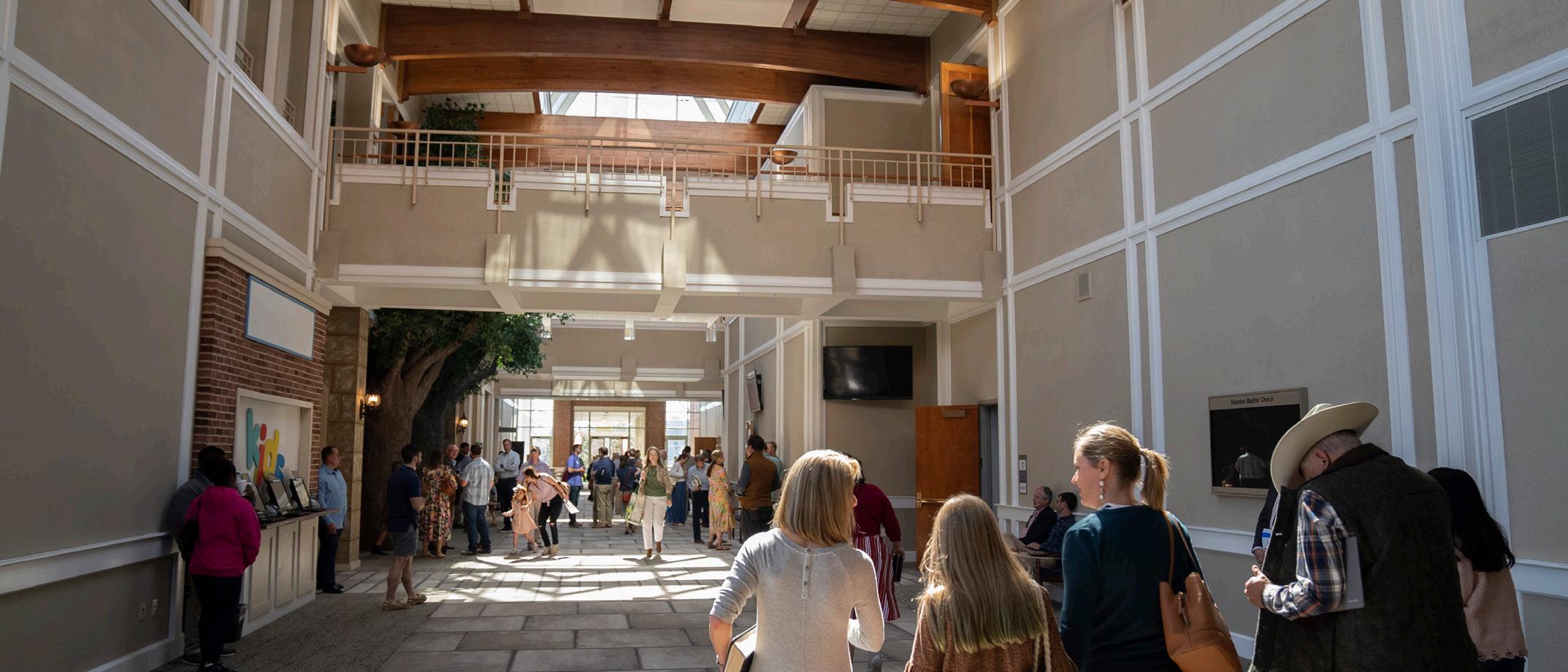
“Love God, love people, preach the Word, and trust that the Spirit of God will use the preacher of God, as he’s preaching from the Word of God – in order to share the will of God – so people can know the mind of God.”
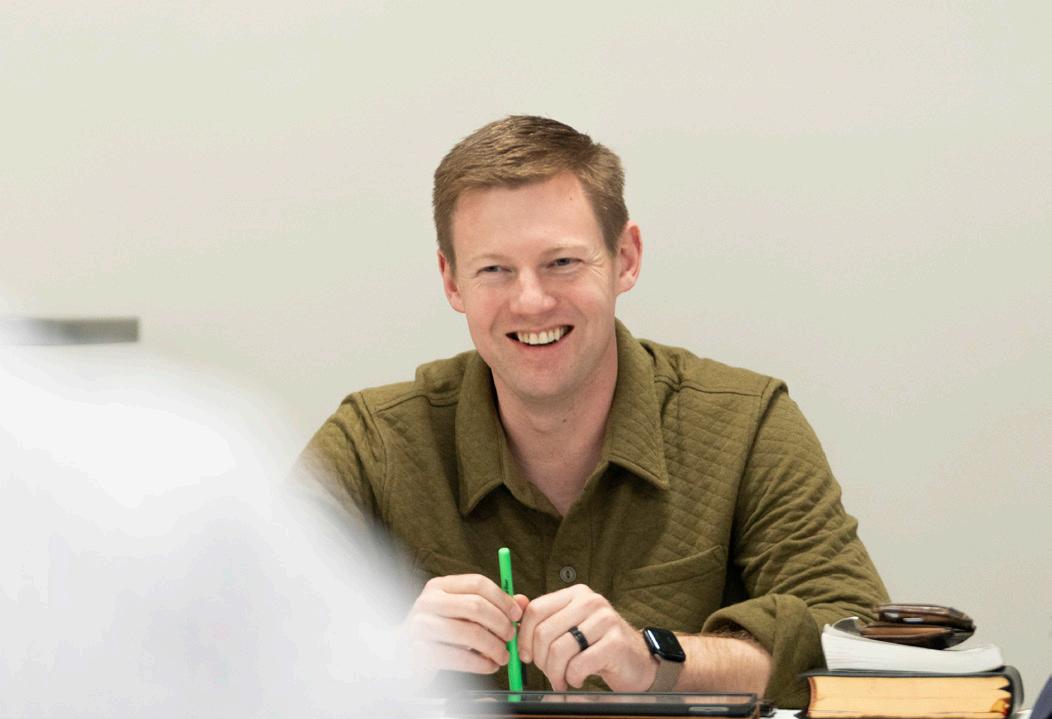

When talking to Andrew Bristol (’93, ’99)*, one would never know the native Texan has spent the past 20 years living overseas, immersed in international culture and can speak Farsi fluently.
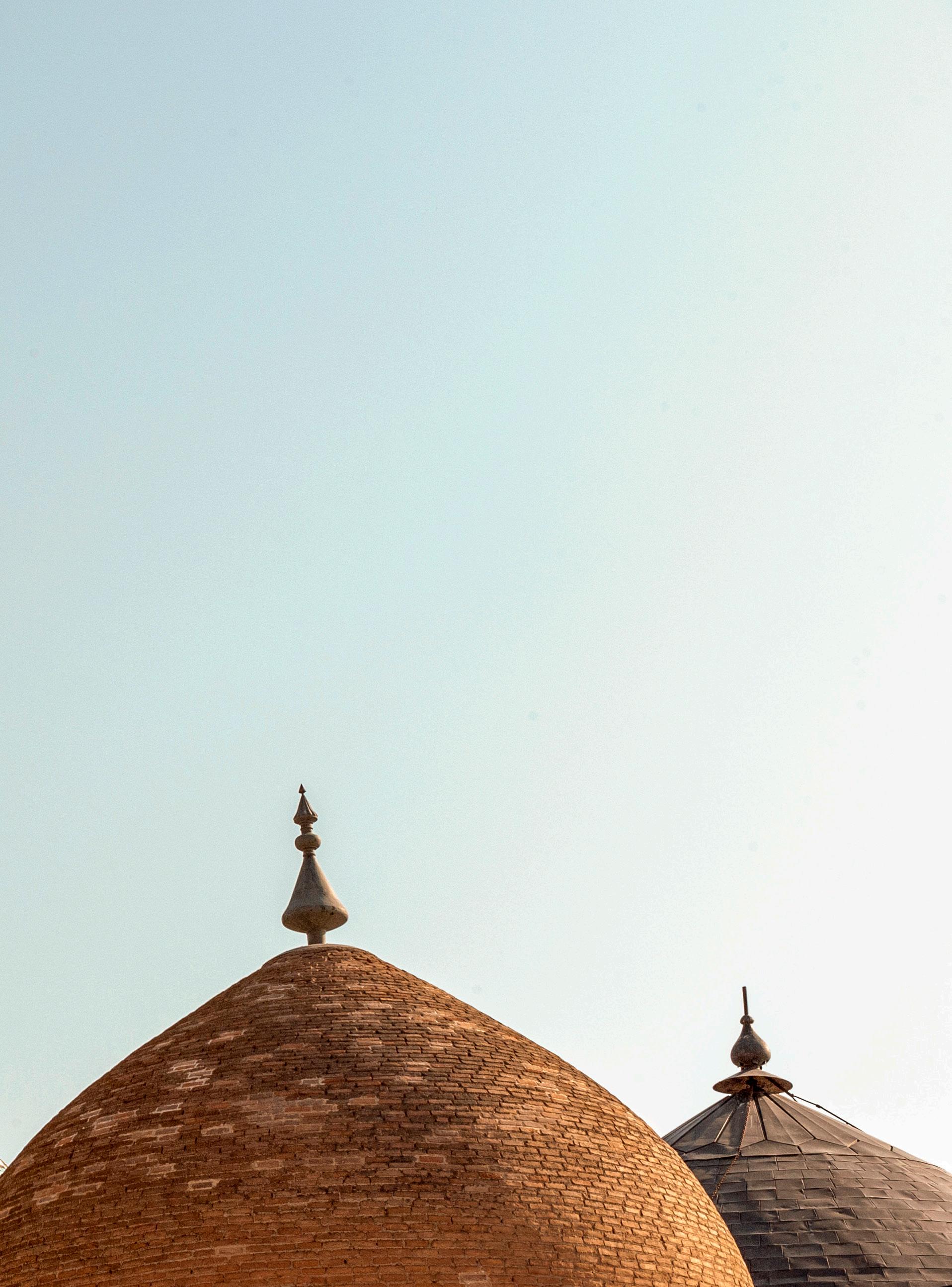
Andrew believes that teaching leaders how to read and teach the Bible is the “paradigm for ministry” and he uses this framework as he seeks to spread the Good News across the world as he serves through the International Mission Board.
“At the end of the day, I’m called to be a Bible teacher,” he says, and Southwestern Baptist Theological Seminary is the place where he learned how to do that.
Andrew’s degrees from Southwestern have been the fuel he needed to travel and serve the Lord wherever opportunities have been made available. He has called several different countries home and lets neither diverse languages spoken nor changes in culture deter him from clearly painting the Bible in a vivid way for his students to understand.
Andrew grew up in Irving, Texas, where he was a member of Plymouth Park Baptist Church. He credits the “regular church attendance” providing him the opportunity to “build peer relationships centered on faith,” which was “helpful” to him as he “tried to live out” his “faith well in middle school and high school.” His youth minister, Don Guthrie (’79), “made quite an investment into me and others who indicated interest in vocational ministry,” he says.
After graduation from MacArthur High School in Irving, he attended Hardin-Simmons University in Abilene, Texas, where he majored in biblical studies. It was there, in the midst of Greek fraternity and sorority life, that Andrew met Josie*. After their first date, they only had eyes for each other and were married in December 1986.
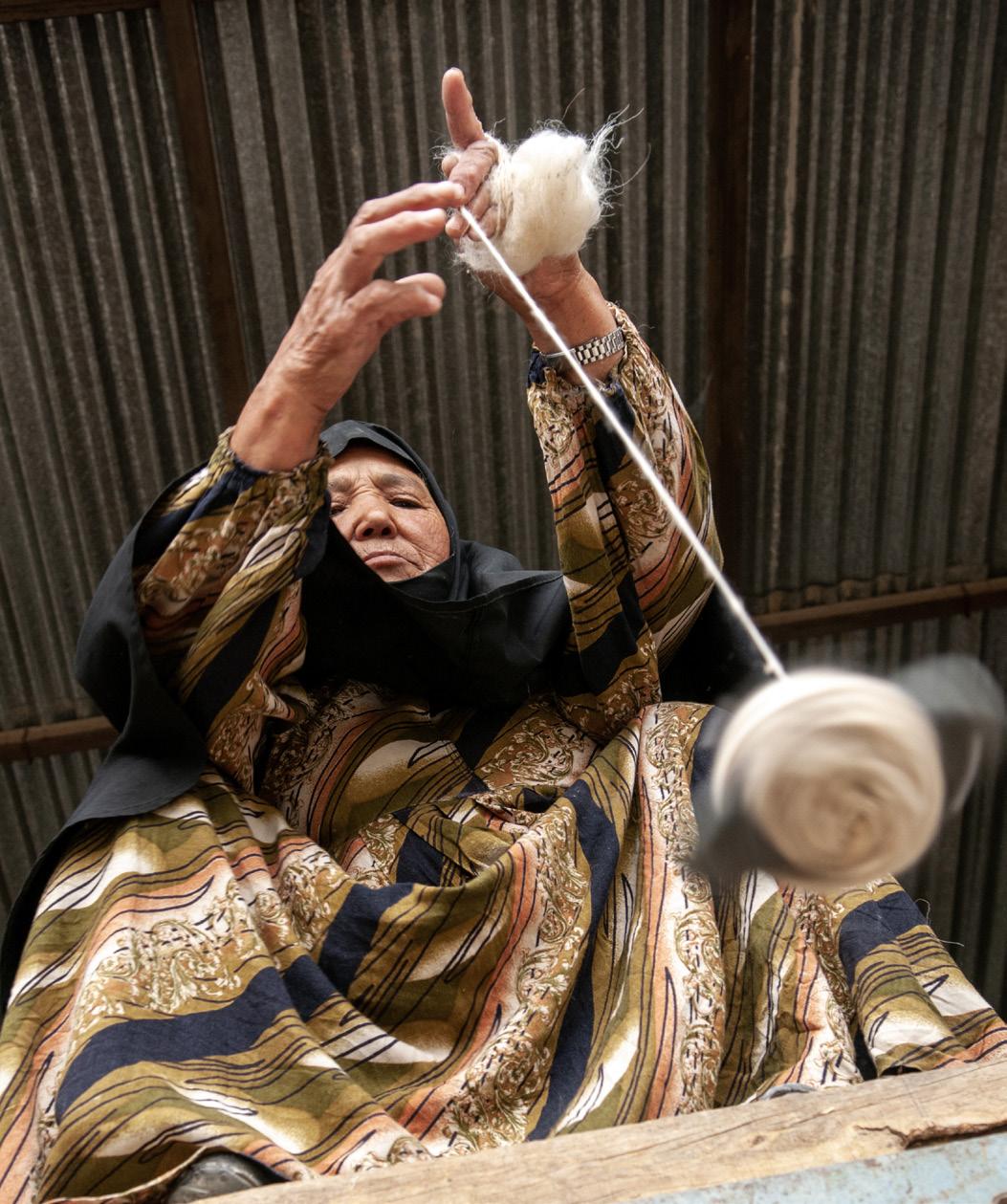
As a Texan, Andrew made Southwestern Baptist Theological Seminary his choice for theological education. “Since I am from the DFW area, Southwestern was coming back to a place that I knew and where I would have family,” he says.
Andrew, who earned a Master of Divinity in 1993 and a Doctor of Ministry in 1999, loves Southwestern. He says his “ministry ambition was the pulpit” and academic studies at Southwestern “reflected that,” adding that he “chose Bible and preaching classes as much as possible and that has served me well, especially as I train nationals” in the role God ultimately had for him as a global missionary.
One of his doctoral seminars in missions “fanned the flame” even further towards missions, Andrew recalls. He remembers that one of the books assigned to him to read was Let the Nations Be Glad, by John Piper, which had a “big impact” on him regarding missions. A classmate in a doctoral seminar, who was also a missionary, also had a significant impact on Andrew’s call to missions. “He regularly advocated for advancing the Gospel cross-culturally. His passion was displayed with tears. He was passionate about shifting resources from the United States to the unreached places. His attitude towards missions made me evaluate my own ministry trajectory,” recalls Andrew.
Andrew remembers the late David Garland, distinguished professor emeritus of Old Testament, and his teaching of the book of Isaiah, “specifically how to see Christ in the Bible,” as being influential during his time as a student. “I remember being moved by his presentation of Isaiah 6,” Andrew says, adding the way Garland taught the chapter “was so powerful I cried. He had a certain passion that came out differently.” He also remembers James Heflin (’68, ‘74), professor of preaching and pastoral ministry, who “gave more gravity to the ministry of preaching” and G. Lacoste Munn (’55, ’59), retired professor of New Testament, who was his Greek professor whom he describes as “awesome.”
Andrew recalls the depth of this appreciation for his Southwestern training not being realized until he was in the ministry work much later as he observes, “I really have appreciated it over the last 20 years, being able to look back and see how important it was. The institutional part of my education really has played a role in shaping how I approach the work.” He says the teachers he had were “wonderful” and “instilled in me that kind of passion for Bible first in ministry.”
Andrew’s first job as a pastor upon graduation from Southwestern was at a church in the “small, cotton community” of Haskell, Texas, where he preached the Word faithfully for almost ten years. After that, he worked in a variety of ministry roles such as youth and recreation pastor, college pastor, and lead pastor, culminating in 20 years of working at churches
His passion was displayed with tears. He was passionate about shifting resources from the United States to the unreached places.
ANDREW BRISTOL
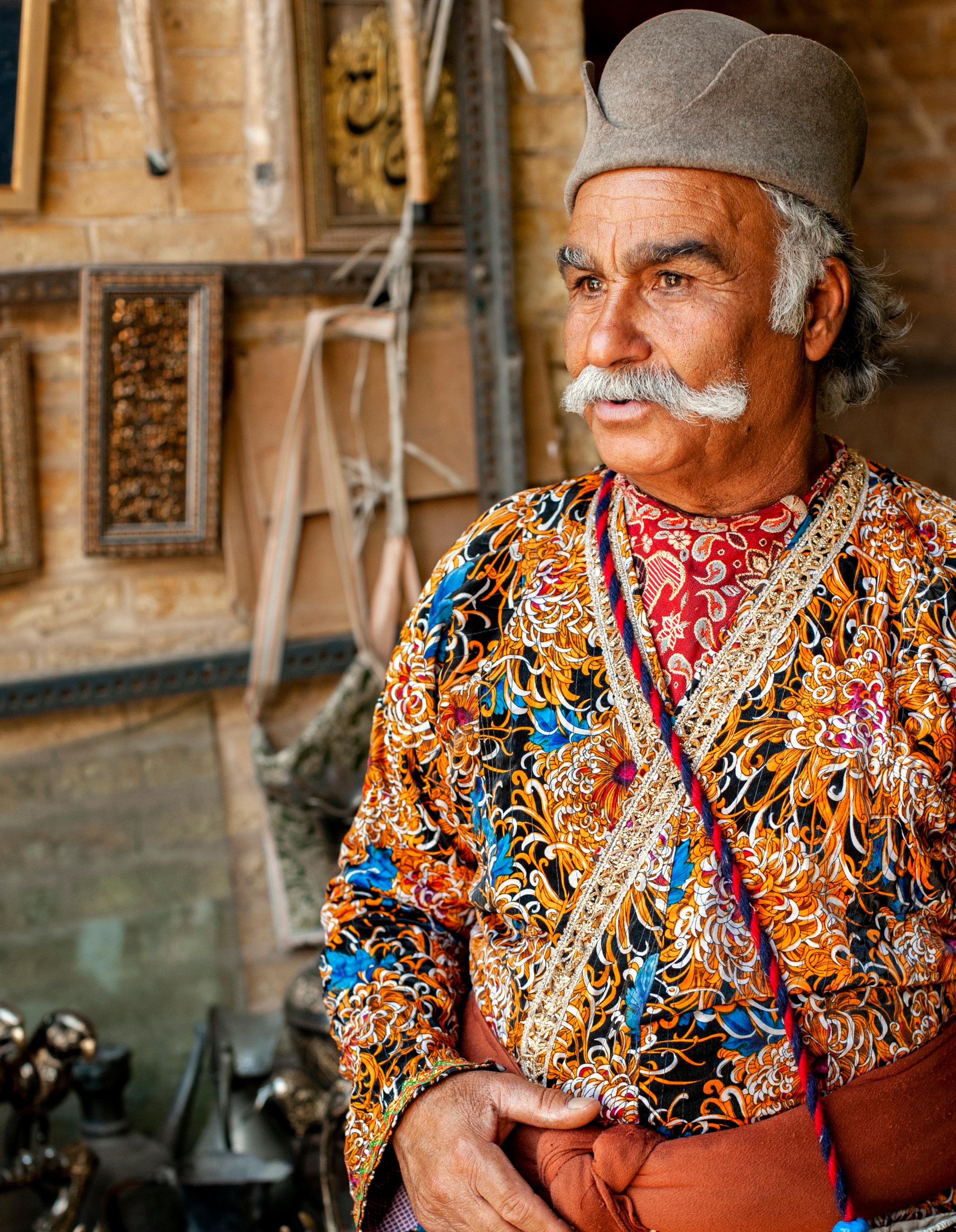
in Texas before becoming a missionary with the IMB.
While pastoring a church in West Texas, Andrew and Josie went on a mission trip to Romania, which sparked their call to missions. Andrew remembers the “spiritual interest and conversations” in Romania as being “so different.” He saw that “there was much more openness, and the needs were much more apparent. There was also a sense in which you come away and say, ‘We could do this!’ Mission trips make the mission enterprise accessible,” Andrew says.
After returning from the mission trip to Romania, Andrew and Josie were wrestling with the decision to go on the mission field or accept an invitation to join another church staff. He remembers “it was a real watershed moment for us because it was, ‘Are you going to go kind of the route that I wanted to all my life’ and doors were opening for me to do pulpit ministry or would I do missions?” It was “difficult” for the Bristols to come to an agreement and decide, but eventually they decided to become missionaries with the IMB.
Andrew and Josie’s missionary journey overseas began at the invitation of their then-pastor, Glenn Watson (’86, ’93), of Hurst Baptist Church in Hurst, Texas, to visit the Lisbon Theological Seminary in Portugal. However, due to unforeseen circumstances, they were diverted and ended up joining a team to help with Persian people. Josie’s experience as a professional marriage and family therapist and Andrew’s theological education were a perfect match for the needs of working with the Persian people. Their professional backgrounds and expertise were helpful and so they went where they were needed. Josie worked in IMB member care for several years until five years ago when she transitioned to working alongside Andrew, spending time with ladies, ministering, giving care to their team members, and conducting marriage and family training for Persians.
The Bristols' missionary journey has taken them to many different places such as the Middle East and Europe. Andrew began his current position in 2017, leading theological education among Central Asians and Middle Easterners from around the world including refugees and settlers. His team covers a wide geographical range including Europe,
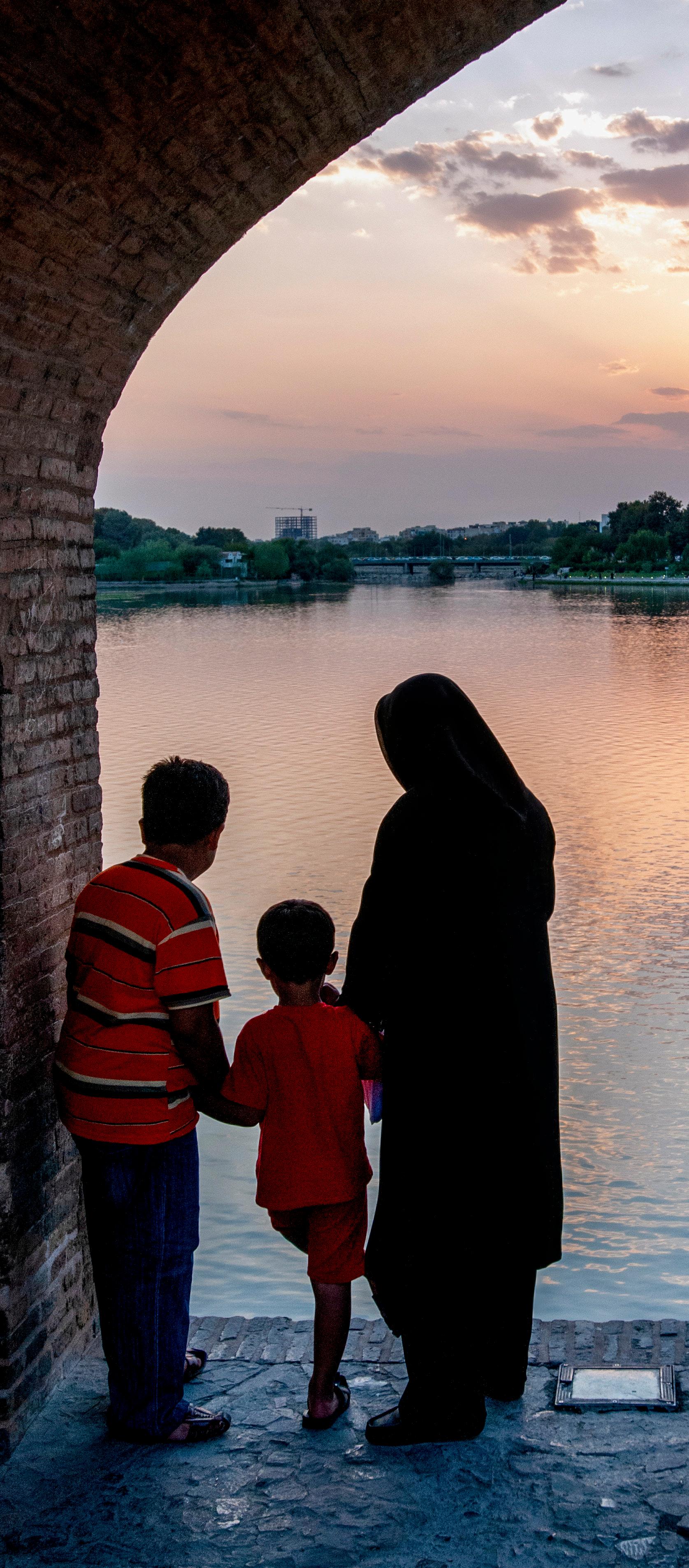
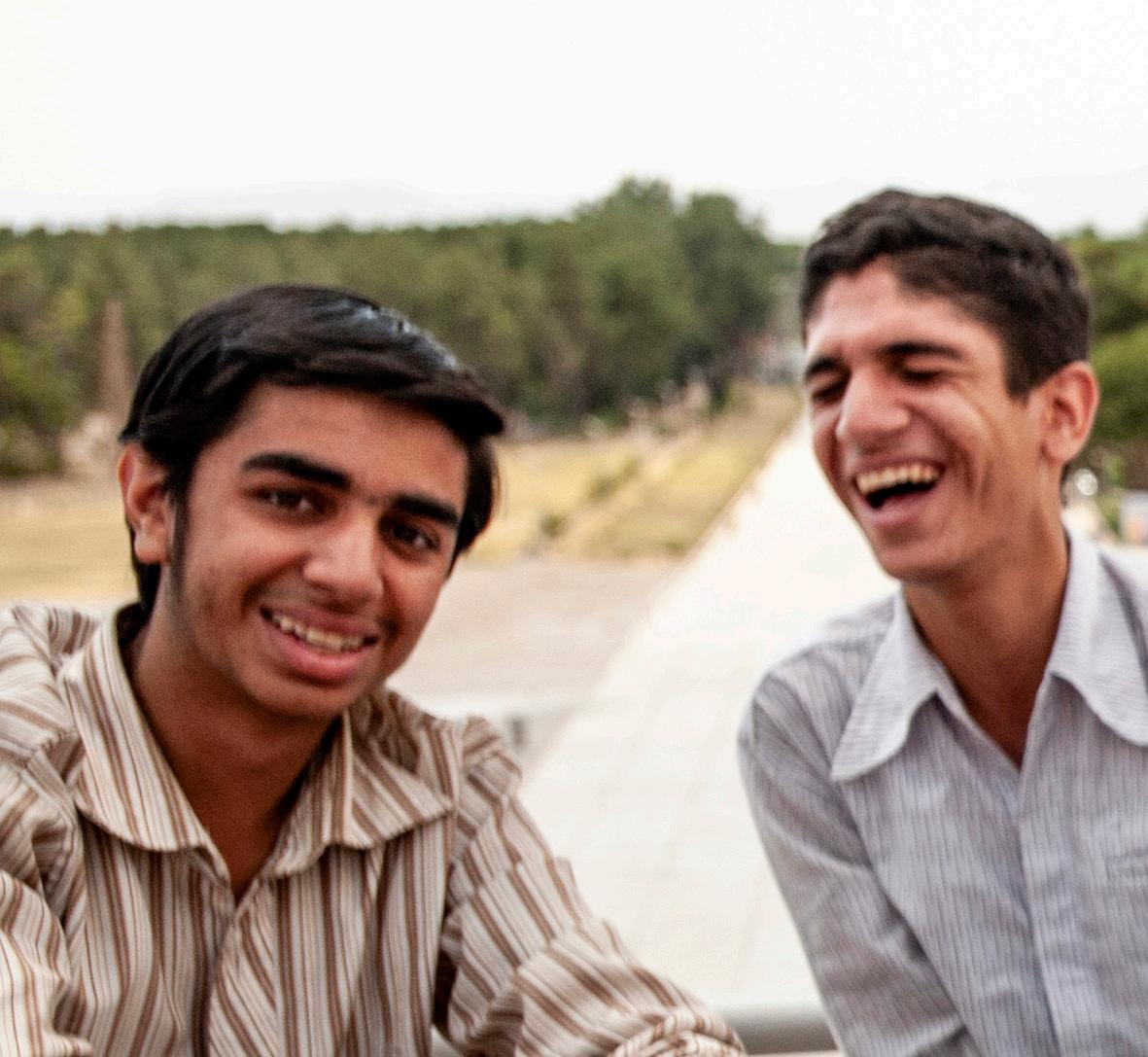
the Middle East, Asia, South America, and Canada.
Andrew’s specific focus is Bible teaching, both online and in-person. He helps lead a theological seminary for Persian speakers which he helped create through a partnership with Southeastern Baptist Theological Seminary in Wake Forest, North Carolina.
“At the end of the day, I’m called to be a Bible teacher. That’s our paradigm for ministry. If you want to teach church leaders, teach them how to read the Bible well and then help them teach the Bible to their people,” Andrew explains. The topics of his teaching include expository Bible teaching, biblical hermeneutics, and ecclesiology. “We have to be able to know how the Bible works, to know how the church works, and [to] know how the Gospel is the fruit of those things,” he says.
Of the three Persian languages, Andrew primarily speaks Farsi. When working with refugees, his team implements a variety of activities to reach out to people in the community and have spiritual conversations. Often his team will “rent spaces near the refugee centers” and they “set up a tent” and provide a variety of things for the refugees such as refreshments, haircuts, or Vacation Bible School events.
The “settled Persians are pretty hungry for the Gospel and are open. For us, ministry looks like an investment into Persian leaders. We have a lot of Persian work that’s at the training, theological level helping leaders develop so that they can lead their people well in a community of faith,” Andrew explains.
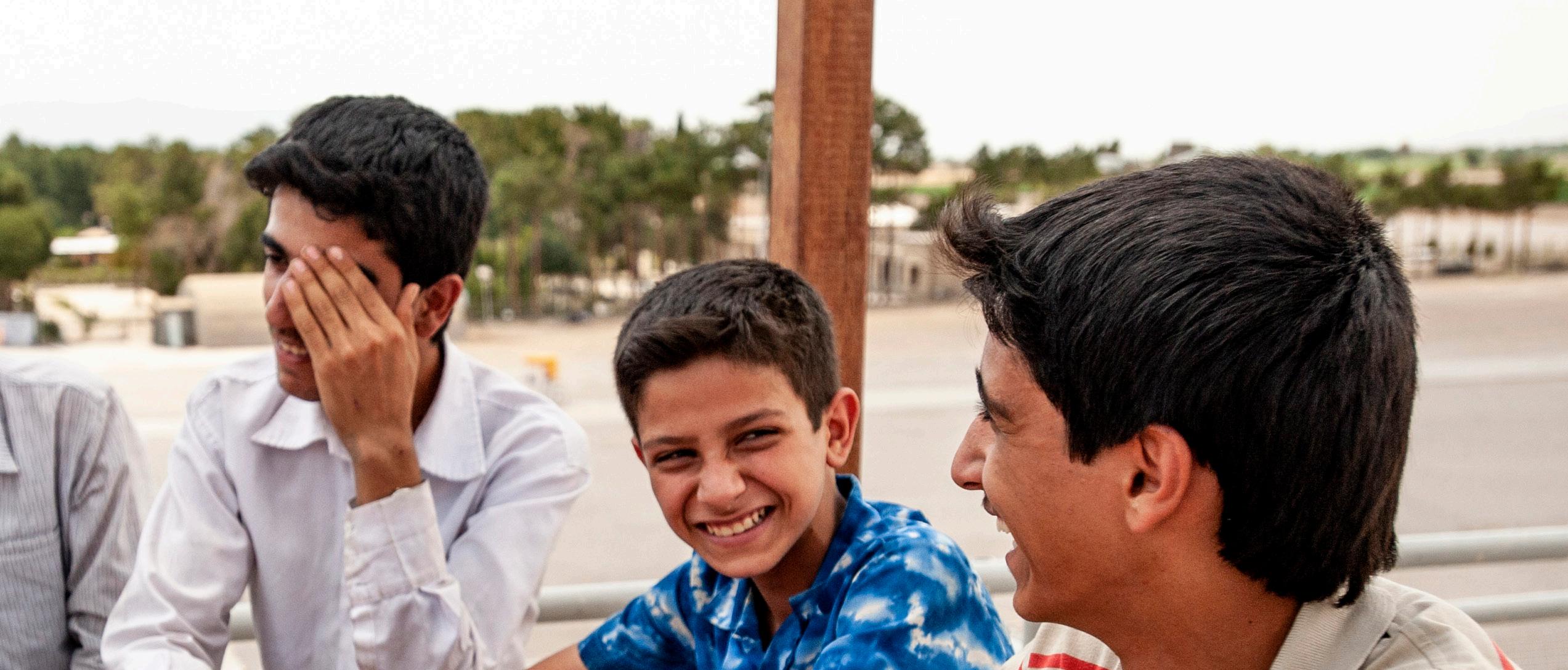
In December 2022, the Bristols arrived in Texas to begin a stateside assignment. While there, Andrew and Josie will continue to work, but in different ways. While Andrew will still be able to continue teaching his classes online and communicating with students, he and his wife will
also spend time across the state representing the IMB.
Due to the changing landscape of American demographics and recognizing that “the world is changing” with “even small cities having a lot of international access,” he urges students and pastors to understand that “the local church must have a cross-cultural element.” Andrew encourages leaders to ask themselves, “How does my church engage cross-culturally?” His advice for current Southwestern students in pastoral ministry is to “consider how local cross-cultural ministry can add value to fulfilling their Great Commission mandate. For the local church to have generational influence, it needs to add a strong cross-cultural element.” Andrew sees the “dramatic shift in human populations into the United States” as an opportunity to “open doors for church growth.”
Throughout Andrew’s work, he clings to the Word of God as life support and his most cherished Bible verse, Ephesians 1:3, as an anchor for his soul.
“This verse fights my never-ending struggle to find some measure of sufficiency within myself to secure God’s favor,” Andrew concludes. “It is a call to look to Christ for all that satisfies and increases my faith. It reminds me to make Christ the object of my confidence and comforts me, especially as I get older, and my deficiencies are more evident.”
Elizabeth Bennett is a news writer for Southwestern News. Photos for this article were provided by the International Mission Board.
*Names changed for security reasons.
It is a call to look to Christ for all that satisfies and increases my faith.
“
ANDREW BRISTOL
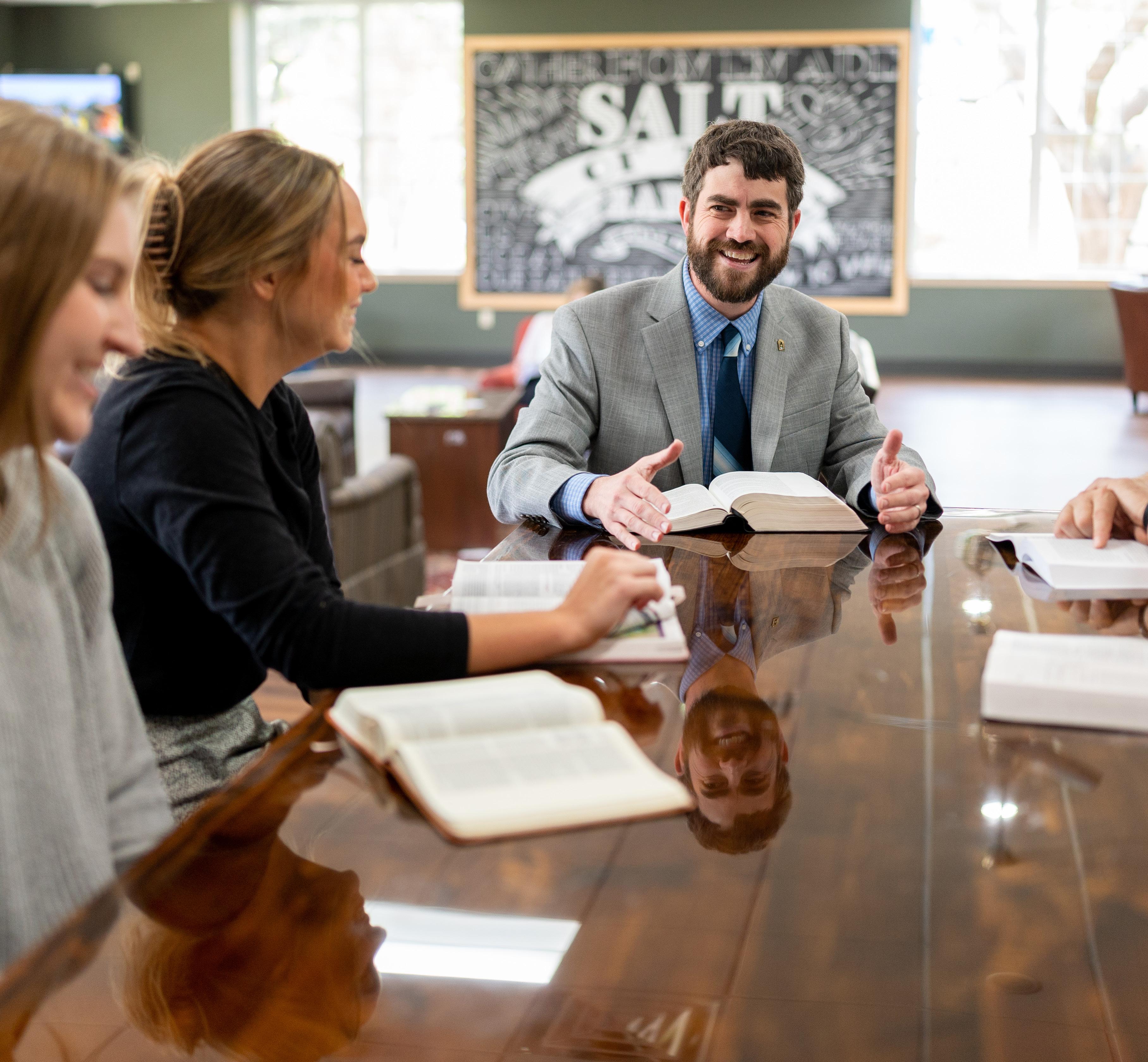 BY JAMES DUGGER
BY JAMES DUGGER
Teaching in higher education is a special calling in life that not many have. Blake McKinney, assistant professor of history and humanities at Texas Baptist College, has felt this calling since he was in his undergraduate program at Union University in Jackson, Tennessee. McKinney earned a Bachelor of Arts with a double major in music and Christian studies while at Union. Though McKinney has experienced many changes in his life, he has always felt called to impart knowledge and wisdom through teaching in higher education.
Growing up in Hendersonville, Tennessee, McKinney was raised in the church. “For as long as I can remember, my church growing up was Long Hollow Baptist Church,” says McKinney. While he grew up in the church, it took a sermon from a Southwestern alumnus, Ronnie Hill (’93), at an evangelistic event to lead him to a relationship with Christ. McKinney says that Hill’s sermon touched him and he wanted to “rededicate” his life. He says that Hill saw through his façade and told him, “You can’t rededicate what you don’t have.” It was then that McKinney gave his life to Christ.
After entering into a relationship with Christ, McKinney was able to learn what it means to truly love the Lord and follow in His will through his pastor and youth pastor, the late David Landrith, and Lance Taylor (’89), respectively. “Lance had a really intentional discipleship model,” McKinney recalls. “He didn’t tell us he was walking us through spiritual disciplines, but he would walk us through them in the way he taught us.”
After being discipled by Taylor, McKinney began to feel something change in his heart. “Through a series of conversations with mentors and diving in God’s Word, I felt what I thought was a call to ministry,” says McKinney. “I sat down and had a lot of conversations with David Landrith,” McKinney recalls. Landrith encouraged McKinney that if it were God’s will that he end up in ministry, God will make the path known to him.
McKinney describes Landrith as being “cautious towards pastoral ministry.” He said that Landrith was encouraging him to choose “anything else” if that other thing could make him happy while doing it. This calling in McKinney’s life was further refined in 2002 while he was on a mission trip with his church to New York City.

While on that trip, McKinney began to consider going to a Christian college rather than a state school. McKinney says that the rest of his family “has always gone to Austin Peay State University,” a state school outside of Nashville. He decided to visit Union University in Jackson, Tennessee. While visiting the school, he met Southwestern alumnus George Guthrie (‘84, ‘91), who was serving as the chair of the Christian Studies department and was the Benjamin W. Perry Professor of Bible. “Dr. Guthrie made me feel very comfortable at Union and I wanted to be surrounded by a Christian learning environment,” says McKinney. During his time at Union, McKinney felt God narrowing the call he felt for his life. “I was always hesitant to committing to pastoral ministry,” says McKinney. “I preached a few times, but I really considered myself a spot-starter like in baseball.” In a class with Guthrie, McKinney says he “began to realize” that God was calling him to “academia, not vocational ministry.”
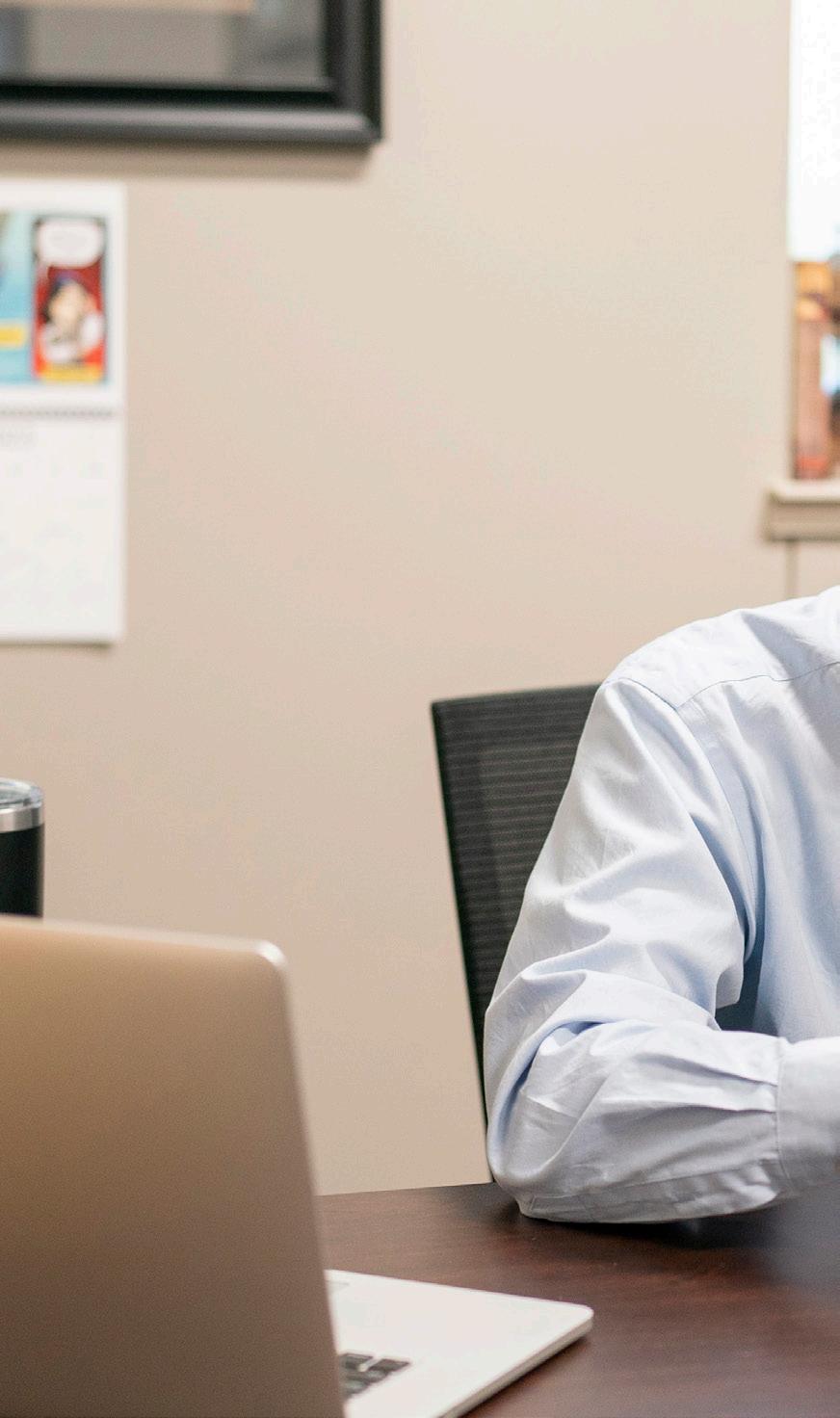
This realization was furthered while he served as the minister of music at the First Baptist Church of Linden, Tennessee, while in college. “I enjoyed leading worship, but I did not sense the Lord was calling me to music ministry,” McKinney recalls. “I was there for about three and a half years, but I began to realize that God was calling me to ministry in the academy.”
While pursuing his undergraduate degree at Union University, McKinney met his wife, Jennifer, while on a choir trip to Germany. “Our first date was actually in Germany, but our second date was at Steak and Shake in Jackson, Tennessee,” says McKinney. “We dated for three years in college and then got married right after I graduated.”
After getting married, the McKinneys moved to Louisville, Kentucky, so he could pursue a Master of Divinity at Southern Baptist Theological Seminary. While at Southern Seminary, McKinney felt God calling him to further his studies, but not in the theological field. McKinney shifted gears slightly after graduating with his Master of Divinity and earned a Master of Arts and Doctor of Philosophy from the University of Alabama in Tuscaloosa, Alabama. Both of his degrees from UA were in European history and religious history.
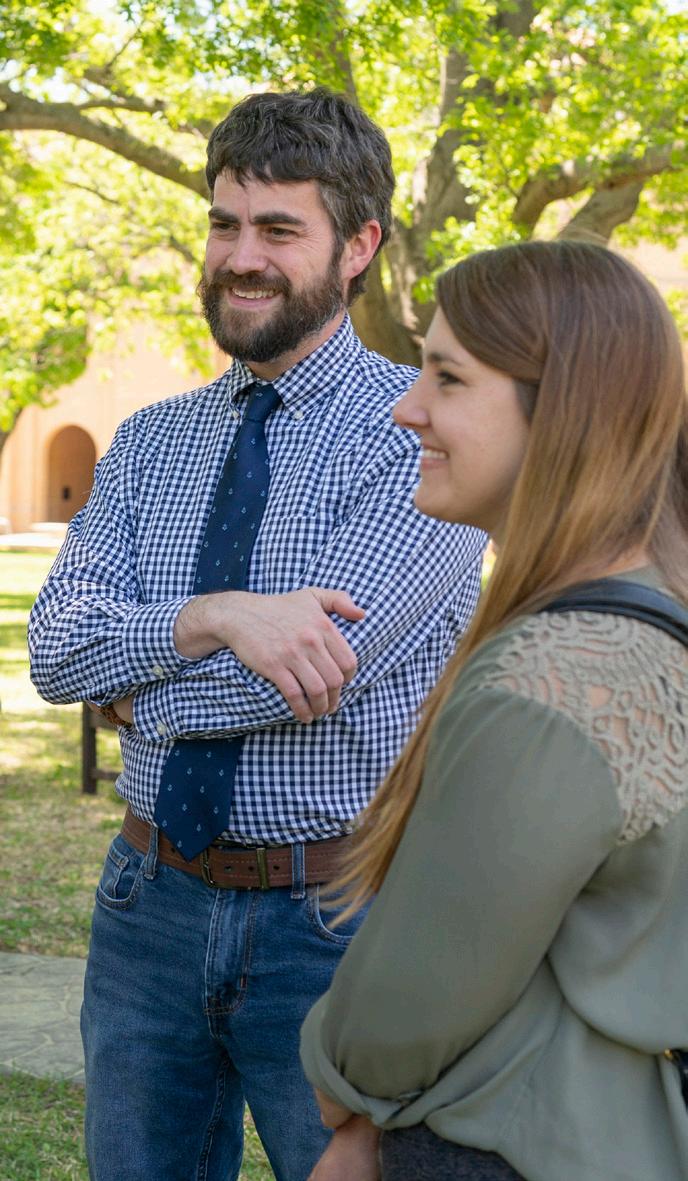
“My family did not have strong ties to a college football team, so I quickly became a big Alabama fan,” McKinney explains. “I am just glad that I do not have to betray any family ties and that I get to be a fan legitimately.”
At that point in his life, McKinney did not have any direct ties to Southwestern Baptist Theological Seminary, but he had been shaped by many
I was always hesitant to committing to pastoral ministry...I preached a few times, but I really considered myself a spot-starter like in baseball.
BLAKE MCKINNEY
people who were alumni of the school, including Landrith, Taylor, Hill, and Guthrie.
One other Southwesterner who played an integral role in getting McKinney to Southwestern was President David S. Dockery (’81). Dockery was the president of Union University when McKinney earned his undergraduate degree. When McKinney was not sure where to look for job openings in higher education at the end of writing his dissertation, he went straight to his former president.
“I reached out to Dr. Dockery and he graciously gave me an afternoon and talked me through what it looks like on the job end, and he was really helpful in that,” says McKinney. He explains when Dockery was interim provost at Southwestern, Texas Baptist College was “looking for a historian and I got an interview.”
McKinney described his ultimate goal in the academic field was to “work under David Dockery.” When Dockery retired as president from Trinity International University, where he served from 2014-2019, McKinney remembers he thought, “Well, there goes my academic life’s goal.” However, he explains “through God’s providence and sense of humor, I’m working with David Dockery.”
Since joining the faculty of TBC in the fall of 2021, McKinney has tried to “engage students” as best he can. “Most people do not like history classes,” says McKinney. “I ask students if they like TV shows, movies,
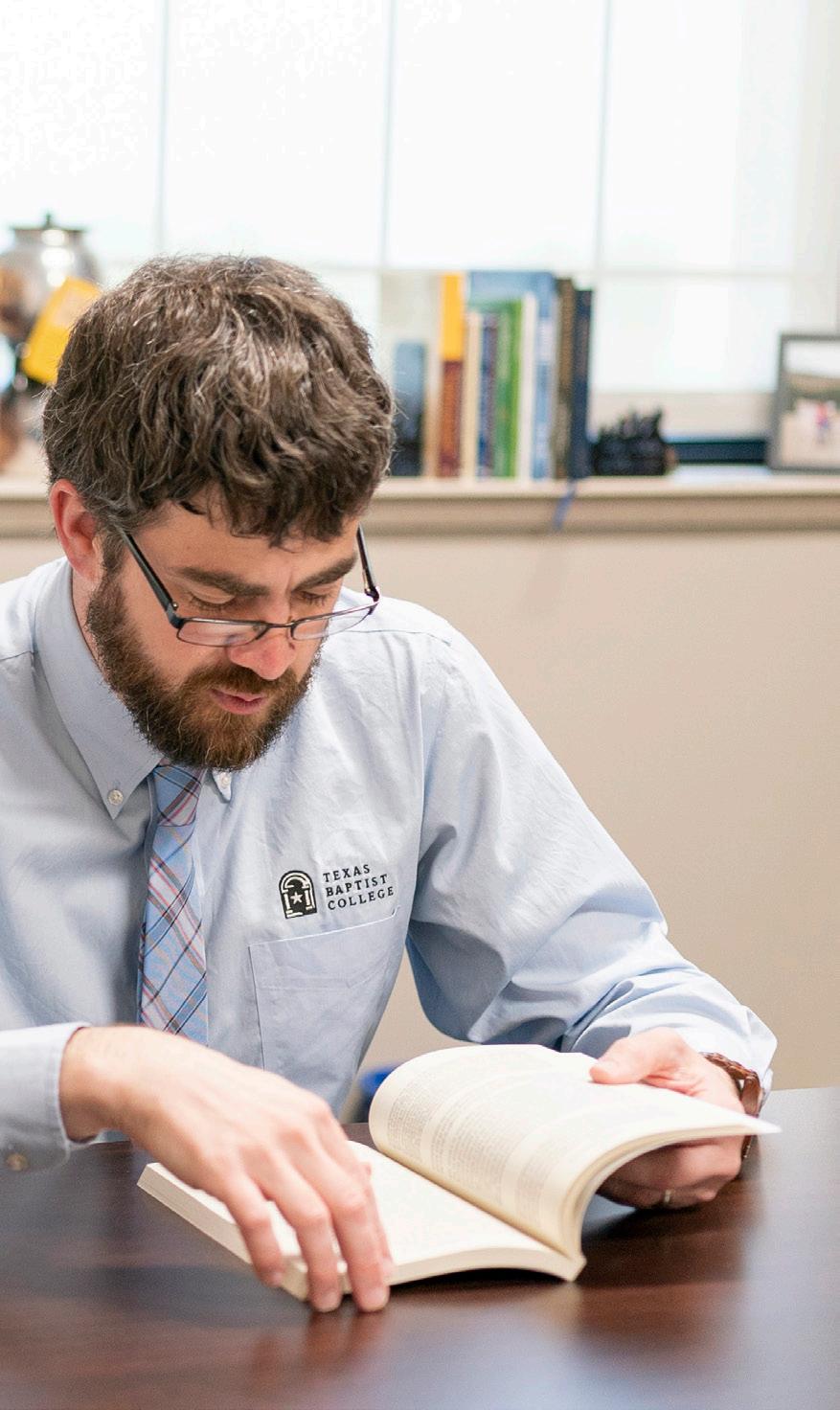
or podcasts. I do this because I want them to know that they like stories and history is just that: a story.”
McKinney does not want students to “simply know facts” when he teaches. While he says that “knowing things is important,” his ultimate goal is for students to be able to “trace ideas and influences throughout history.”
“I have the wonderful opportunity to help students love God with all of their minds,” says McKinney when talking about why he enjoys teaching. “In history and humanities courses I get to help students not be conformed to the pattern of this world but to be transformed by the renewal of their minds.”
For McKinney, the classroom is not the only place to meet students and engage with the Fort Worth campus. “In my undergrad, I was in professors' homes and I still have professors I can call,” says McKinney. “I want to be that way for our students here.” He says that he enjoys interacting with students beyond the classroom by going to trivia nights, faculty versus student softball games, and going to student recitals so that he can show students that he wants “to be invested in their lives, not just their studies.”
“One way I love to reach students is when I see them at church, worshipping with my family,” says McKinney. “I am not a leader in the church and I am not a minister in the sense of being a pastor or preacher, but I
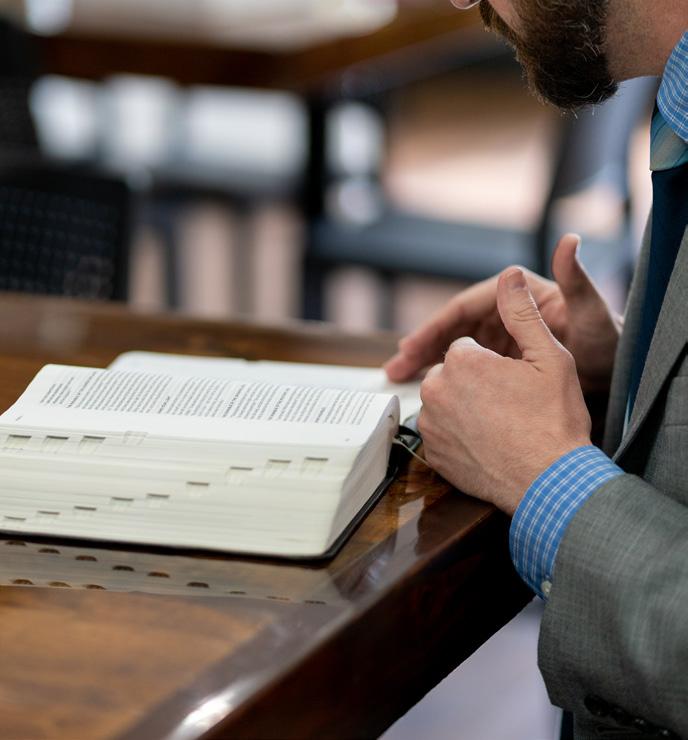
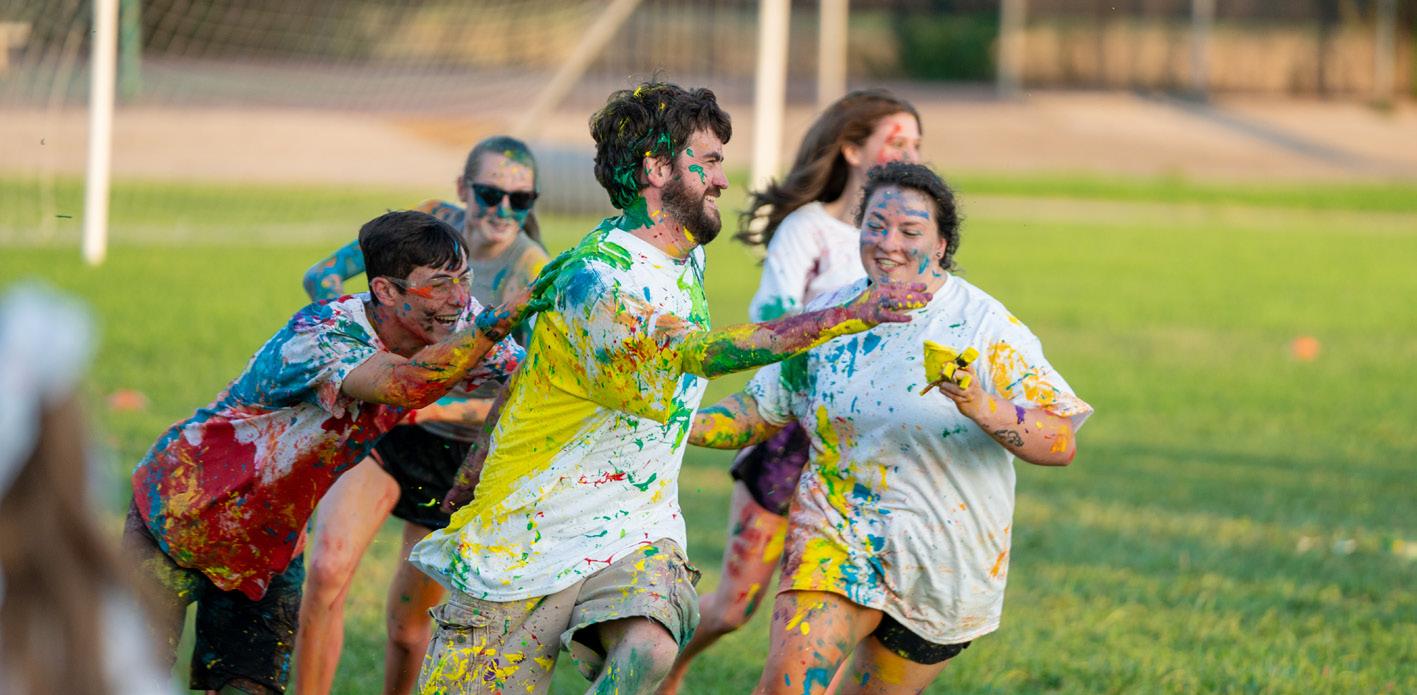
want to be an example to my students that you can be a good steward of the time God has given to you by being in church consistently.”
“I am grateful to serve Christ and His church at TBC,” says McKinney. “It is my joy to teach my students with the goal and prayer that the Lord will use their time at TBC to conform them to the image of Christ.” McKinney feels that his role is to help students “think more Christianly about the world” and adds that TBC “is a wonderful Christian academic community that supports local churches.”
McKinney also enjoys doing things for the Office of Student Life on the campus of Southwestern and TBC. “I just go to the coffee shop to talk with students and then I end up getting roped into doing things for Student Life,” says McKinney. “But it is a joy getting to do life with these students.”
McKinney has previously been involved with campus events such as the Fall 2022 Student Life Paint War when TBC students and faculty had the chance to throw paint at each other on the intramural fields beside the Recreation and Aerobics Center. “I just love being able to have fun and be away from the classroom environment with students,” says McKinney.
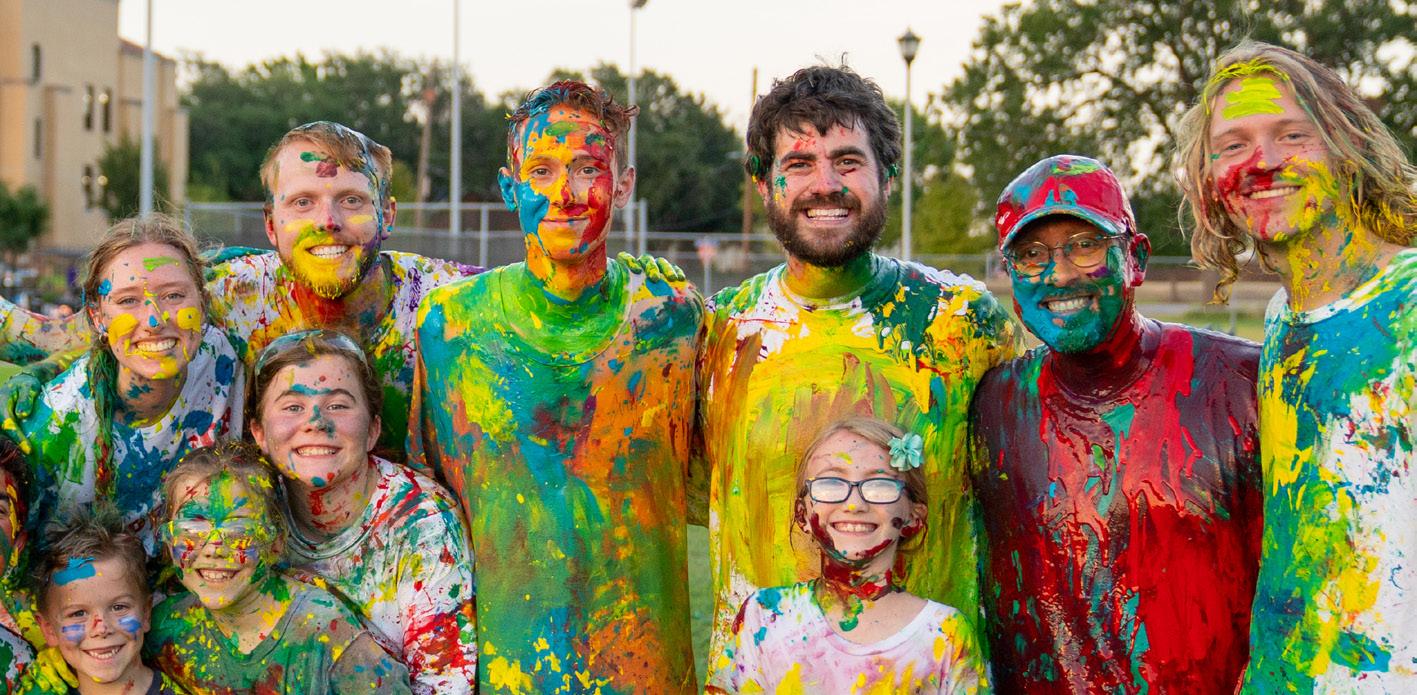
Academics and music are not the only things that McKinney is interested in, however. One of his greatest interests outside of the church and the classroom is baseball. While he grew up in the greater Nashville area, he has been a Chicago Cubs fan since he was a young child.
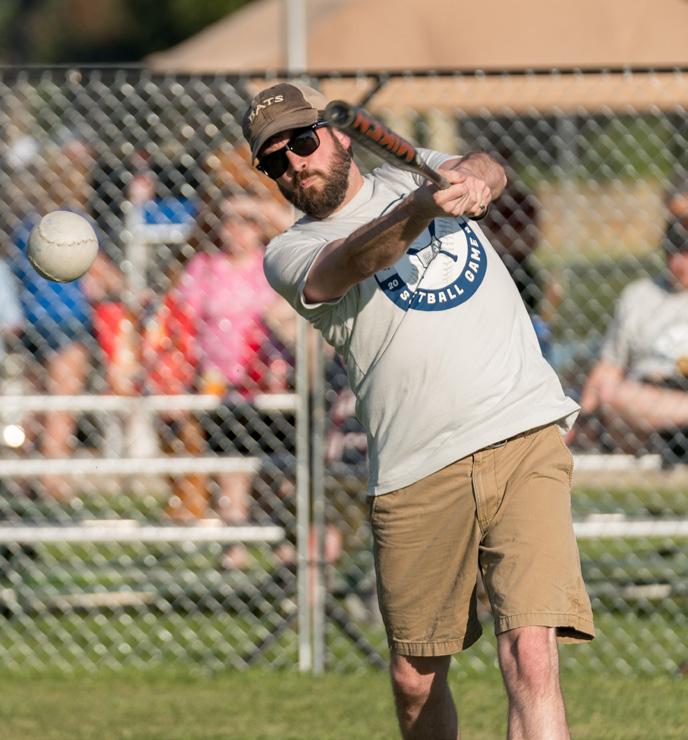
“In Tennessee, everyone picks one of the major market teams or one of the teams closest to Tennessee,” McKinney explains. “I fell in love with the Cubs at a young age, but baseball became so much more to me when I sat down with a former pastor who could predict every play on the diamond.” McKinney says that he loves every single moment of baseball.
One piece of memorabilia that McKinney is very proud of is a counterfactual pennant from when the Cubs participated in the National League Championship Series but did not win. The pennant reads “Chicago Cubs,
National League Champions.” McKinney says, “My wife got me that pennant and I love it, but it is also kind of depressing for a Cubs fan.”
McKinney says that he has “an open office policy” as much as he can. When students walk in, they see all of his Cubs memorabilia, bookshelves filled completely with books, and various decorations like maps and posters. McKinney says that he wants students to “know that I care for them, pray for them, and know what’s going on in their lives.” One way McKinney enjoys connecting with his students is through his passion for his sports teams.
Coming from a musical background, McKinney enjoys how intentional the School of Church Music and Worship at Southwestern is with the way they assist in the leading of chapel services. “Every chapel is scripturally driven, including the worship aspect,” says McKinney. “We’re reading Scripture together, everything is intentional, and it all coincides with what is being preached.”
Throughout all of the changes in his life, McKinney has felt one constant calling: teaching in higher education. He uses his knowledge and pedagogical style to help students find joy and pleasure in studying. He also tries to be involved in the lives of students as a way to give honor those professors who poured into his life during his own academic studies. McKinney serves the Lord in ministry by preparing future church leaders not only from behind a podium, but through interacting with students outside of the classroom as well.
James Dugger (‘23) is a news writer for Southwestern News.It is my joy to teach my students with the goal and prayer that the Lord will use their time at TBC to conform them to the image of Christ.
BLAKE MCKINNEY
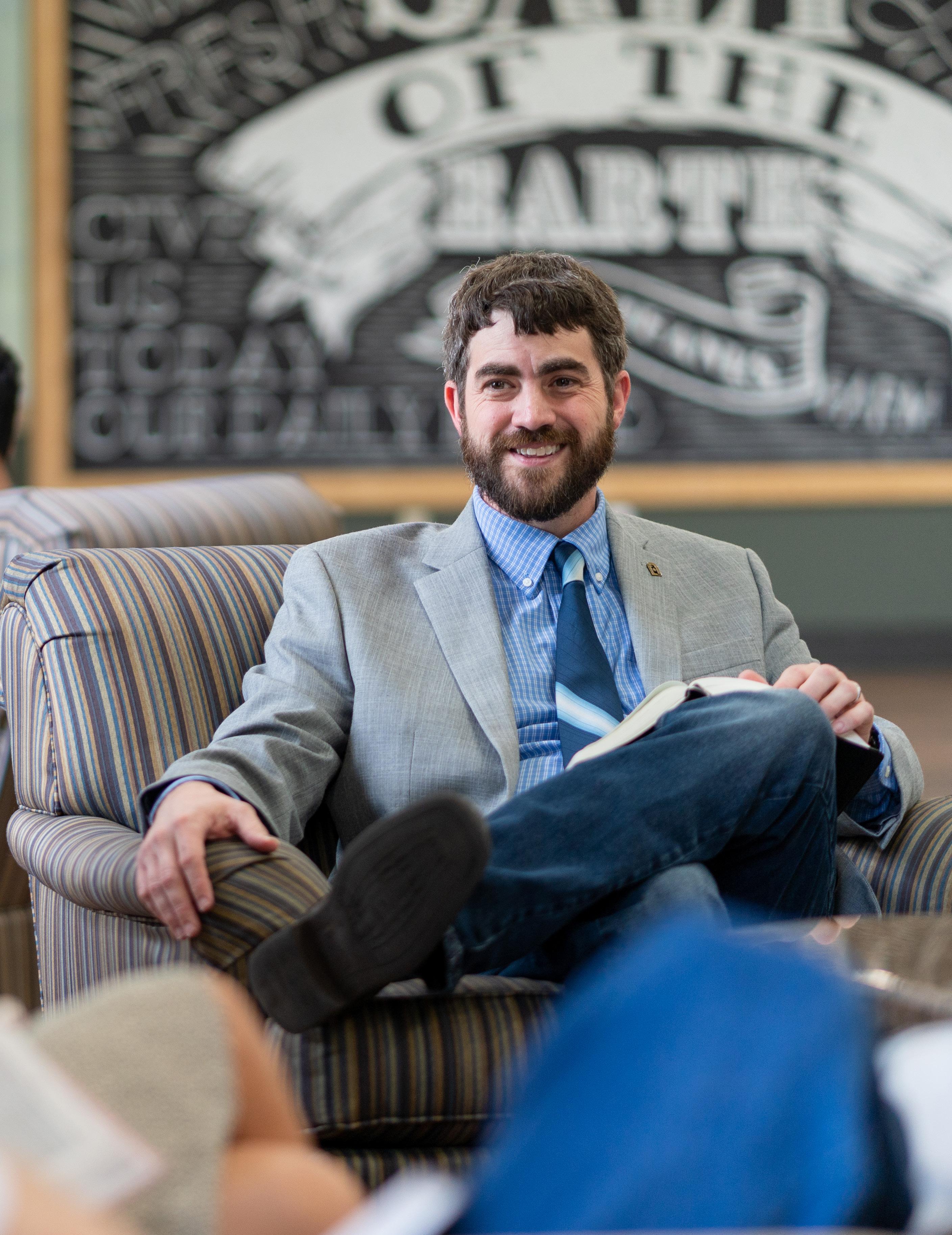

Among the 350,000 students who populate the 35 campus classrooms and online learning environments that have active Baptist Collegiate Ministry in Georgia, Beverly Parrish Skinner (‘98), collegiate ministry catalyst with the Georgia Baptist Mission Board, knows one thing, “The future leaders of politics and medicine and education and agriculture, and churches - every area of society - the leaders of those segments of society are sitting in a college classroom today.”
Skinner, a 1998 Master of Divinity graduate of Southwestern Seminary, says college years are a “pivotal” time in a person’s life when students are “setting the course of their life.”
“For a young adult who comes to campus, as a Christ follower, almost every one of them is going to go through some crisis of faith while they are a student where they decide, ‘Will I continue walking forward in this faith or will I choose a different path in life?’” Skinner explains, adding that “for the Christ-following student, this is a critical time of solidifying their faith.”
However, she notes the college years also provide opportunities to share the Gospel with students who are not Christ-followers, describing the non-believing students as “open,” “seeking,” and “willing to engage in conversation.”
Whether it is termed Baptist Collegiate Ministry (BCM), Baptist Student Union (BSU), or Baptist Student Ministries (BSM), Skinner says college campus ministers “have an opportunity to share the truth of Jesus with thousands and thousands of young adults at probably the most formative time of their life.” She adds students are “making their own choices about their formation, and where they are the most receptive to listening and learning.”
For Skinner, who has served with Georgia Baptists in various capacities since 2014 before assuming her current ministry role in the summer of 2022, the lifetime formation that college students experience today is not unlike the same she experienced as a telecommunications undergraduate at Baylor University in Waco, Texas.
Raised in Houston, Texas, Skinner grew up in a mission church or what is called a church plant in the current vernacular. She explains the church began with 70 people, including her parents, and watching the church grow “very much … influenced my understanding that church is not just something we go to, it is part of who we are, and we invest our lives in that.” Today the church, Bear Creek Baptist Church in Houston,
has more than 5,000 members.

Skinner, who prayed to receive Christ as a 13-year-old during a youth revival service, recalls that “being on mission and being a part of God’s work in my neighborhood and community was just a natural part of our life growing up.” She carried this same ministry mindset to Waco as a Baylor freshman who was “very involved in Baptist Student Union … from day one.”
Skinner says God used her experiences within the BSU, Baylor community and environment, and her church, and when she “was a junior, I began to sense that God might be calling me to collegiate ministry,” adding that her “call to ministry was pretty clear early on that it was a call to collegiate ministry.” She adds since the Lord called her to collegiate ministry slightly over 30 years ago her “passion for it has not waned” and “it has not changed.”
Through an internship with Baylor’s BSU during her senior year of college, Skinner had the opportunity to travel across the state of Texas to visit other colleges and universities and their BSU ministries. She recalls the experience was “part of the Lord clarifying that call” for her as it helped her determine “if BSU was different than my experience at Baylor that I still felt like that’s what God was calling me to do.” Skinner recalls campus ministers at Baylor Shawn Shannon (‘83) and George Loutherback (‘68) were “instrumental” in her calling.
Being on mission and being a part of God’s work in my neighborhood and community was just a natural part of our life growing up.
BEVERLY SKINNER
Following graduation, Skinner “didn’t yet have a strong sense or peace about going to seminary,” so for the next three years she continued to “explore” her calling with the Lord. During one of those years, as she served as the campus minister at two community college campuses just south of Houston, Alvin Community College and Brazosport College, she says the Lord confirmed “this is what I needed to invest the rest of my life in and that I needed to go to seminary in order to be properly prepared for that ministry career.”
A couple of months later, in the spring of 1995, Skinner joined a friend to sit in on a class at Southwestern Seminary when “the Lord really affirmed not only that seminary was the right path for me, but that this was the right school for me,” she recalls, adding that it “was one of those moments of just knowing that I know this is the right place.”
The theological training and “the ability to think in theological terms” she learned at Southwestern have aided Skinner in her ministry to college students because “many students ask really hard questions and really deep and insightful questions.”
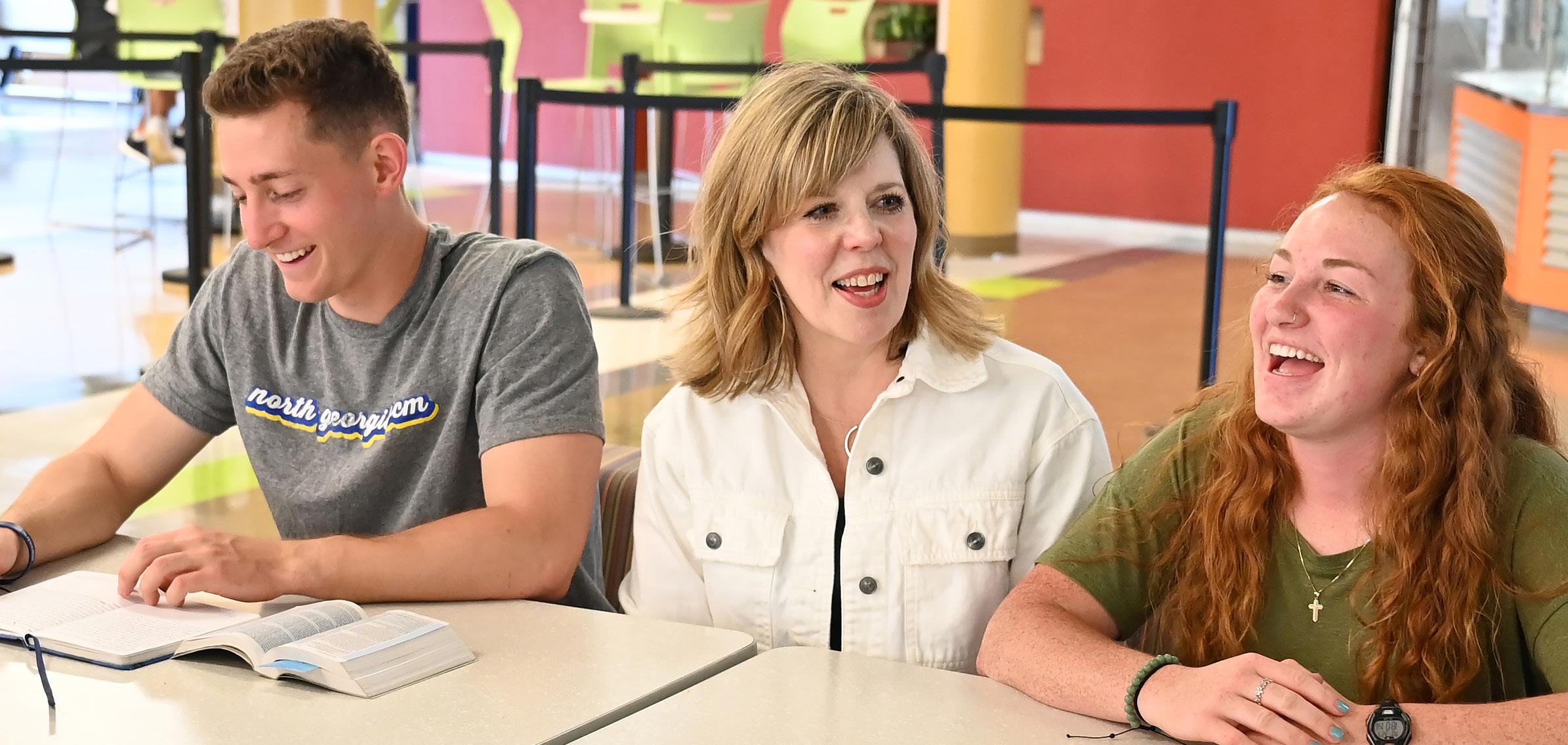
“My degree made such a difference in feeling equipped to be able to answer questions, but even when I didn’t have answers, feeling equipped and knowing how to research and find answers,” Skinner explains, adding that even when she did not know the answer, she knew a professor or a resource that could assist.

Skinner says the relationships she formed with her peers and professors while at Southwestern are “one of the most valuable things” from her experience on the Fort Worth campus. The relationships with her seminary colleagues were a “lifeline during those years” as she and her friends “learned together,” “challenged each other,” and “encouraged each other not only in our walk with the Lord but in our pursuit of theological education” and today they are still “supporting and encouraging one another and seeing how God is working in one another’s lives and being used in the Kingdom today,” she says.
While the network of friends and colleagues were important during Skinner’s time at Southwestern, many professors influenced Skinner

My degree made such a difference in feeling equipped to be able to answer questions, but even when I didn’t have answers, feeling equipped and knowing how to research and find answers.
BEVERLY SKINNER
with skills she continues to use in ministry, including Grant Lovejoy (‘84, ‘90), associate professor of preaching, whom Skinner had for hermeneutics; the late Jack MacGorman, distinguished professor of New Testament; Dan Crawford (‘67, ‘73, ‘81), senior professor of evangelism and missions and chair of prayer emeritus; the late Calvin Miller, professor of communication and ministry studies; the late Burt Dominy, professor of theology; and Karen Bullock (‘87, ‘91), associate professor of church history, whom Skinner says “had the most impact on me personally.”
While she was working on her Master of Divinity degree, Skinner served with Texas Baptists in the BSM student missions office where she helped assign college students from Texas to summer missions opportunities. As a college student at Baylor, Skinner had the same opportunity when she served as a summer missionary in Germany.
Following graduation from Southwestern, Skinner moved to Oxford, Mississippi, where she began serving as the associate BSU director at Ole Miss. For the next three years, she ministered to students in the Magnolia State as she applied the theological lessons she learned in the classroom at Southwestern with the practical ministry experience she gained serving in Texas. In July 2002, the Lord moved Skinner back to Texasthis time to College Station and Aggieland where she served the next six years as the associate BSM director at Texas A&M University. However, in 2008 the Lord directed Skinner’s steps back to Mississippi where she served as the associate director of collegiate ministry for the Mississippi Baptist Convention located in Jackson.
Through the role with Mississippi Baptists, Skinner was responsible for the Mississippi BSU Summer Missions Program where she worked with Southern Baptist mission boards and missionaries, as well as with other organizations, to identify missions opportunities and place students from colleges and universities in summer missions positions. Through the role, Skinner met her husband, Warren, who was serving as the BSM director at Georgia Institute of Technology, more commonly known as Georgia Tech, in Atlanta. After they were married in December 2012, she moved to Georgia.
While living in the Peach State, the Lord opened an unexpected door of ministry that would ultimately lead to Skinner’s current ministry role. In February 2014, a position with Georgia Baptist Women became available. As the young women and women’s ministry consultant, where she served until January 2022, Skinner utilized her ministry skills and experience in reaching young women to equip women’s ministry leaders in the churches of the Georgia Baptist Mission Board to reach young women with the Gospel and begin to disciple them. However, at the beginning of last year, the Lord brought Skinner back to her original calling as an undergraduate student at Baylor: collegiate ministry.



Serving as the director of campus expansion for six months before being named the collegiate ministry catalyst, Skinner now oversees the work of all collegiate ministries on the campuses of 35 colleges and universities in Georgia. She adds there are “87 campuses in Georgia that
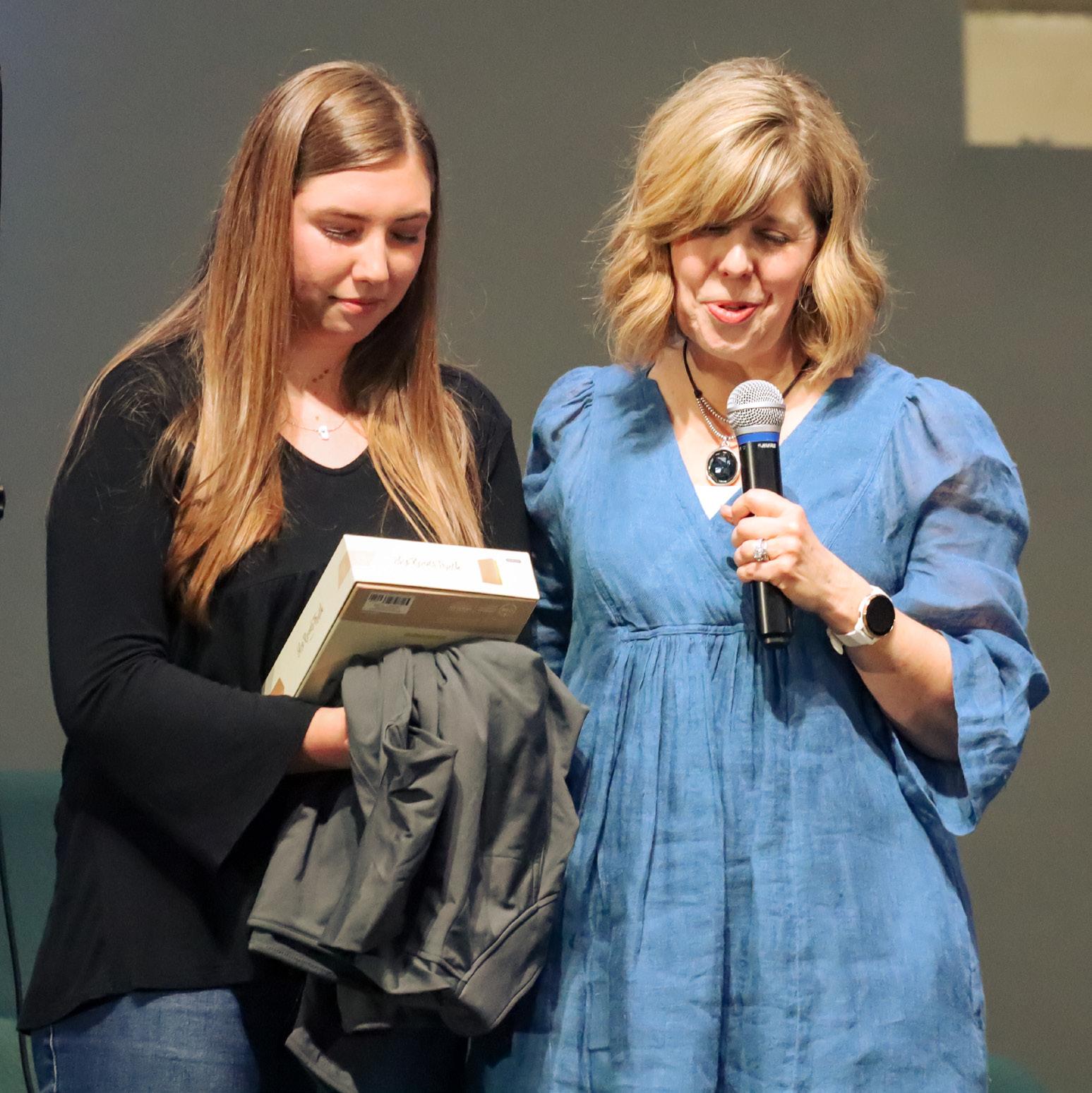
We are about training and equipping them to engage their culture and I think that’s a lifetime skill that we’re giving them that the Lord will use wherever they go.
BEVERLY SKINNER
BEVERLY

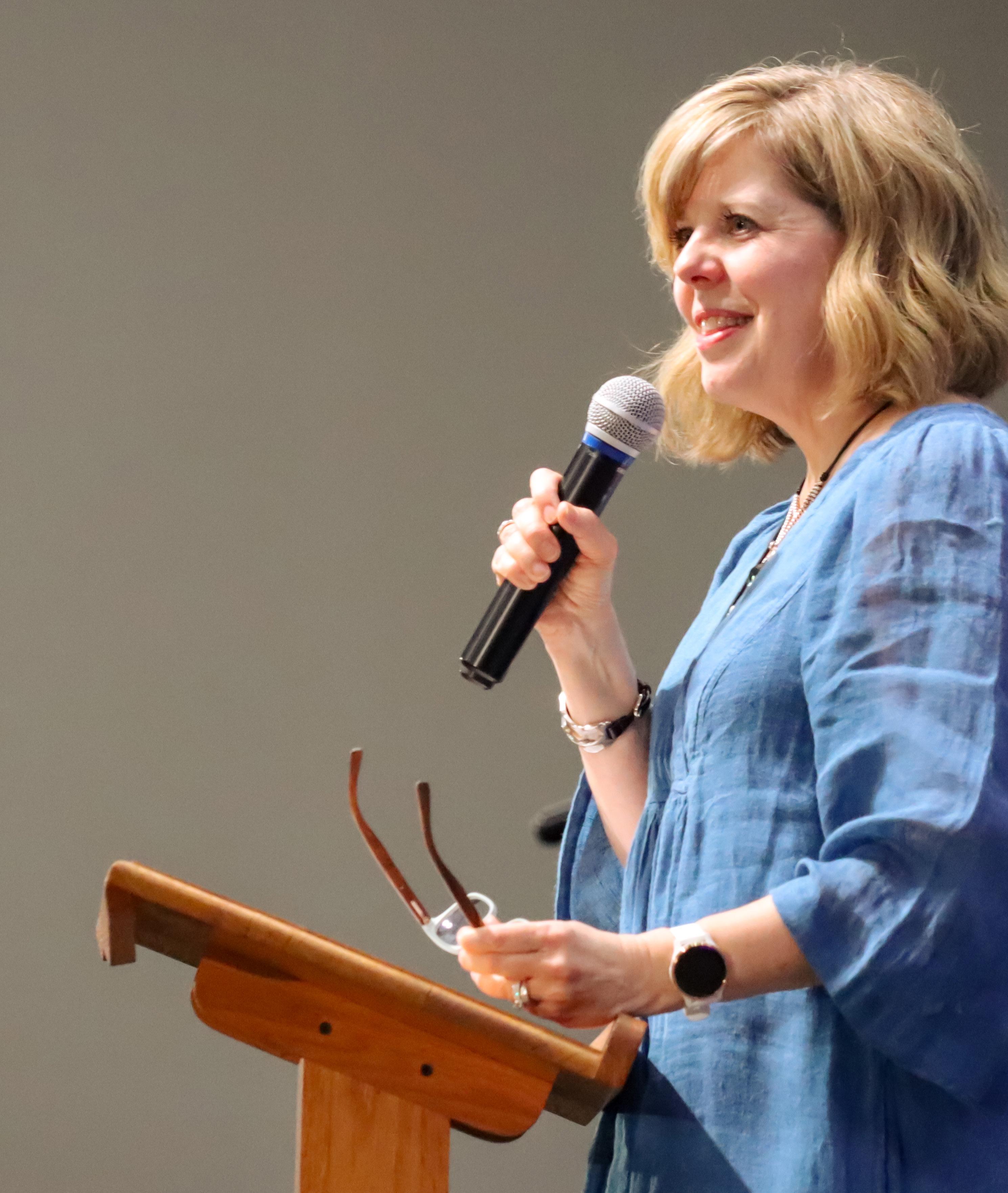
Seeing students come to know Him and live out the unique plan that He has for each one of them -- that's it for me.
SKINNER
are viable locations for BCM,” meaning they are “traditional schools or technical schools where we might be able to establish BCM.” While BCM is established on 35 of those 87 campuses, Skinner explains there are “another 29 campuses with BCM in process of some stage of development” that are “moving” in the direction of a “fully functioning BCM.”
As the collegiate ministry catalyst, Skinner gives “leadership” and “direction to all of our campus ministry in Georgia” as she provides “support” for the full-time, part-time, and volunteer campus ministers throughout the state.
“I help set the course for … our mission or values or priorities in BCM, our goals that we’re working toward every semester, or every school year in BCM, and leading our staff and volunteers, toward accomplishing those goals on our campuses,” she explains. A peripheral element of her ministry role includes helping churches that want to engage college students and BCM learn how to do so, she says.
Over the course of her lifetime serving through BSU, Skinner says she has a “general feel” that “across the country” the ministry is “far more focused on engaging campus rather than providing a refuge for Baptist students or Christian students on campus.”
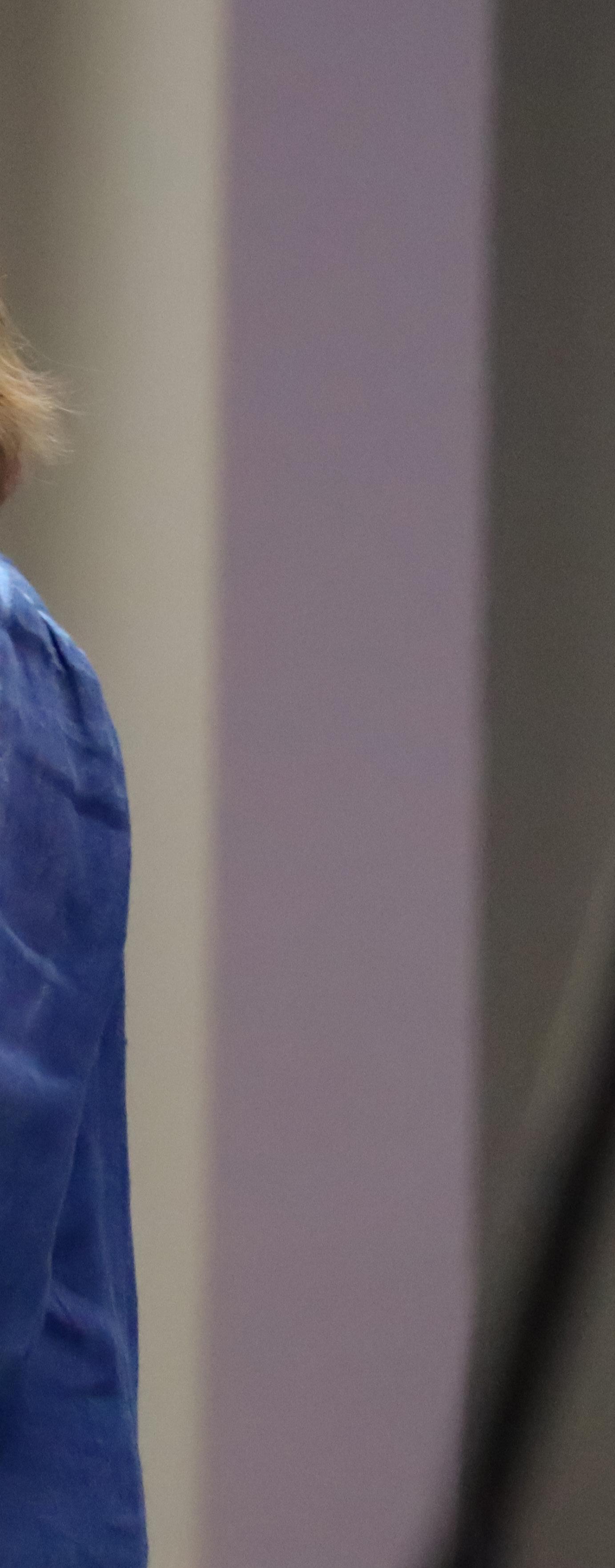
“We are about training and equipping them to engage their culture and I think that’s a lifetime skill that we’re giving them that the Lord will use wherever they go,” she adds, citing the example of one of her students from Texas A&M who came from a Christian background and taught English to international students through the BSM in College Station. Today, the same student is an engineer in Houston who works with international colleagues “and she shares the Gospel with them in ways she learned as a student in BSM at Texas A&M,” Skinner says.
“That’s the kind of life change we like to see,” Skinner continues.
“That’s a student that came to us as a Christian, but then to think about students who come to us that we meet on campus and we share the Gospel, and they become Christ followers, and they grow as disciples. And then they, in turn, … do the same thing. They become missionaries themselves because they heard the Gospel in college.”
For more than 30 years Skinner has been involved in collegiate ministry, but the passion she has in the daily aspects of the ministry continues to find its roots in “the life change that we see happen when students discover and embrace God’s love for them.”
“Seeing students come to know Him and live out the unique plan that He has for each one of them - that’s it for me,” Skinner reflects, while adding the passion continues as she knows “the incredible things that God can do in and through their lives for a lifetime. When they become fully devoted followers of Christ as college students their lives are changed, but the lives of everyone they impact for years to come are changed as well.”
In some ways, Skinner’s life has come full circle. As a college student who was impacted by BSM, she is now part of impacting the lives of college students who are now trying to figure out life, and that thought is met with gratitude.
“I really am very grateful for the opportunity to serve in collegiate ministry every day,” Skinner concludes. “I hope everybody believes this about the thing that they’re called to do, but I really believe this is really Kingdom work that is on the front edge, the leading edge of ministry, and it’s just really important.”


An education at Southwestern Baptist Theological Seminary and Texas Baptist College is designed to equip men and women to discern, understand, and live their calling. Education at Southwestern Seminary and Texas Baptist College, which is focused on carrying out the essential teaching task commissioned by the risen Christ (Matt 28:1920), seeks to be grace filled, Christ centered, Scripturally grounded, confessionally guided, student focused, and globally engaged.
Preparing men and women for their calling is a holy privilege, granted from our gracious God. The goals of this institutional calling are threefold: to build up men and women to serve the church, to lead them to maturity in faith, and to encourage them toward Christian unity (Eph 4:1-16, 11-16).

Calling in Scripture takes on various forms. All who have placed their faith in Christ have been called to salvation (Rom 8:29-30; Eph 1:4). Christ called people to be His disciples (Matt 4:18-22). Moreover, the New Testament emphasizes that some have a distinctive calling to service, including the apostles (Mark 3:14, Rom 1:1; 1 Pet 1:1) and the Apostle Paul (Acts 9). The Old Testament also points to some who had a special commission from the Lord such as Moses (Exod 3:14), Samuel (1 Sam 3), and Isaiah (Isa 6:1-8). Others, like Abraham, received a new name, which was tied to their calling (Gen 12; 17). The Bible portrays God as calling His people to salvation and service, while appointing some to specific tasks.
Education at Southwestern Seminary and Texas Baptist College is not merely career preparation as often found among other professional educational approaches. The uniqueness of a thoroughgoing Christian approach to education points beyond skill enhancement to character development and Christian worldview formation that challenges the predominate secular way of seeing life and work.
We want to equip the mind, form the heart, and prepare the hands by inculcating truth and developing graduates who will enter the world with the good news of the Gospel. We certainly want professors, staff, and students who are competent in their skills, but who are primarily convictional in their confession, caring in their relationships, and prepared to contend for the truth of God that is foundational for life and living, doing so with gentleness and respect (1 Pet 3:15).
This educational approach, with a commitment to revealed truth, was once the hallmark of the large majority of educational institutions in this country. Sadly, it is no longer the case with the rise of secularization and specialization in the nineteenth and twentieth centuries. The result has been a separation of heart from head, faith from knowledge, revealed truth from discovered truth, and careers from calling. What happened was a loss or distortion of worldview across the academy. Instead of seeing all types of work or service as vocatio (the Latin word for calling), the idea of calling became quite limited or lost altogether. Contrary to this trend, we desire for the concept of calling to permeate the Southwestern community’s view of education, pedagogy, and service.
There are several implications for our work on Seminary Hill. Faculty and students should be more attentive teachers and learners because our motivation for learning is different. We want to learn more about God and His world, His purposes, and His activities as they shape our calling and focus. The purpose of learning is transformed from something beyond that of merely getting a job, as important as this may be. Education shaped by a Christian understanding of calling and worldview thinking can help restore the loss of morality and accountability in our society. This full-orbed understanding of education can help us to become more faithful followers of Christ, more reflective and mature people, as well as better family members, neighbors, and citizens. It provides a framework for life, helping us become better people since education involves more than information; it points to formation and transformation as well.
Such an educational approach values content but also character. Students can know what is right as well as do what is right. Discerning, understanding, and living our calling develops from an educational approach that not only desires to inform the mind, but to renew the heart and will as well.
Certainly Genesis 3 tells us that sin has corrupted and degraded the concept of work and calling. It specifically states that because of sin, work will change its character, thus at times embodying the idea of weariness, trouble, and sorrow according to the writer of Ecclesiastes. Let us not miss, however, that prior to the entrance of sin into the world, the Genesis story intimates that God had invited humans to get in on the work, to tend the garden that God created.
The Christian tradition has historically affirmed that all honorable callings are divinely ordained. Martin Luther, the great sixteenth-cen-
Preparing men and women for their calling is a holy privilege, granted from our gracious God. The goals of this institutional calling are threefold: to build up men and women to serve the church, to lead them to maturity in faith, and to encourage them toward Christian unity.
“
DAVID S. DOCKERY
tury Reformer, attacked medieval monasticism by saying one need not be a monk or a nun to serve God. Thus, the servant, the plowman, and the maid, he claimed, all do their work and carry out their calling for the glory of God.
Luther’s understanding of vocation, however, is not to be seen as a glorification of human activity. It is rather a celebration of the continuing creativity of God. Luther’s emphasis was not on jobs, but on calling, which involves doing everything for the glory of God. Our work and service should be seen as worship. We do on Monday what we do on Sunday, which is to seek to glorify God in all that we do (1 Cor 10:31).

What does this mean for students at Southwestern Seminary and Texas Baptist College? It means they can glorify God by studying hard.
work of the college has broader implications. Still, we recognize that all honest professions are honorable. We learn from biblical examples like Adam, who was a gardener; Abraham, a rancher; Joseph, an administrator; Deborah, a judge; David, a shepherd; Lydia, a businesswoman; and Paul, a tentmaker.
Students have been called to the vocation of student. They have been given gifts and graces that come from God for study and for carrying out God’s call on their lives. Study is not just for the self but so that one can better contribute to others through study. So, we urge students to be faithful in their studies for it is their current calling.
As we diligently seek to prepare students to live their calling, we want to encourage the right motivation in seeing their lives, ministry, service, and work as being done unto the Lord. Thus, our work is connected with our calling, and understood as a blessing from and unto the Lord.
Our calling at Southwestern Seminary and Texas Baptist College is to equip ministers, missionaries, musicians, counselors, educators, and leaders, and others as well, recognizing that Jesus is Lord of all. We are committed to the preparation of students since we recognize calling, work, and service as gifts from God (Gen 2:15). We believe that these various callings are to be pursued with excellence, for they are to be carried out for the glory of the Triune God (1 Cor 10:31; 2 Thess 3:6).
While the distinctive work of the seminary is focused on the preparation of Gospel ministers for various roles in the church, in education, and on the mission field, among other ministry opportunities, the

We affirm that the gifts and abilities that men and women have been given find their source in the goodness of God, who is the one who has called us to salvation and to service (Rom 12:3-8). We also believe that all blessings associated with one’s calling come from God (Deut 8:18; Ps 75:6). One discovers one’s calling from both the inner guidance of the Holy Spirit (1 Cor 9:17) and the external confirmation of God’s people, often demonstrating itself in a desire to serve both God and others.
The apostle Paul encourages followers of Christ to prepare well for their calling (2 Tim 2:15), pursuing excellence to honor the Lord in all that they do (Col 3:23-24). The biblical pattern is that preparation precedes presentation (Mark 3:14; Gal 1:11-24). Christ followers are responsible to plan and prepare well, to utilize and mobilize the resources, the capacity, the intellect, the motivation, the expectations, and all that God has given us, using them to the fullest in order to serve with God-honoring faithfulness.
As the wise teacher said almost three thousand years ago: “Whatever your hand finds to do, do it with all your strength” (Eccl 9:10). And, we would add with the apostle Paul – do it all for the glory of God. Let us pray that the Southwestern and Texas Baptist College community will faithfully live our calling for the good of the church and the advancement of the Gospel among the nations.
David S. Dockery (‘81) serves as the tenth president of Southwestern Seminary and Texas Baptist College.
We want to equip the mind, form the heart, and prepare the hands by inculcating truth and developing graduates who will enter the world with the good news of the Gospel.
DAVID S. DOCKERY
New release features contributions of Southwestern faculty
Co-edited by President David S. Dockery (’80), A Handbook of Theology is written for students, pastors, and church leaders and examines six elements of theology, including foundations, types of theology, history and geography, Christian doctrine, the Christian life, and theology and culture. Published by B&H Academic and released in April, A Handbook of Theology contains chapters from Southwestern Seminary School of Theology faculty including Andrew Streett on hermeneutics, J. Scott Duvall (’84, ’91) on biblical theology, Justin Wainscott on pastoral theology, D. Jeffrey Bingham on patristic theology, W. Madison Grace II (’06, ’12) on modern theology, Malcolm B. Yarnell III (’91) on the Trinity, Jacob Shatzer on humanity, and Craig Blaising on last things.
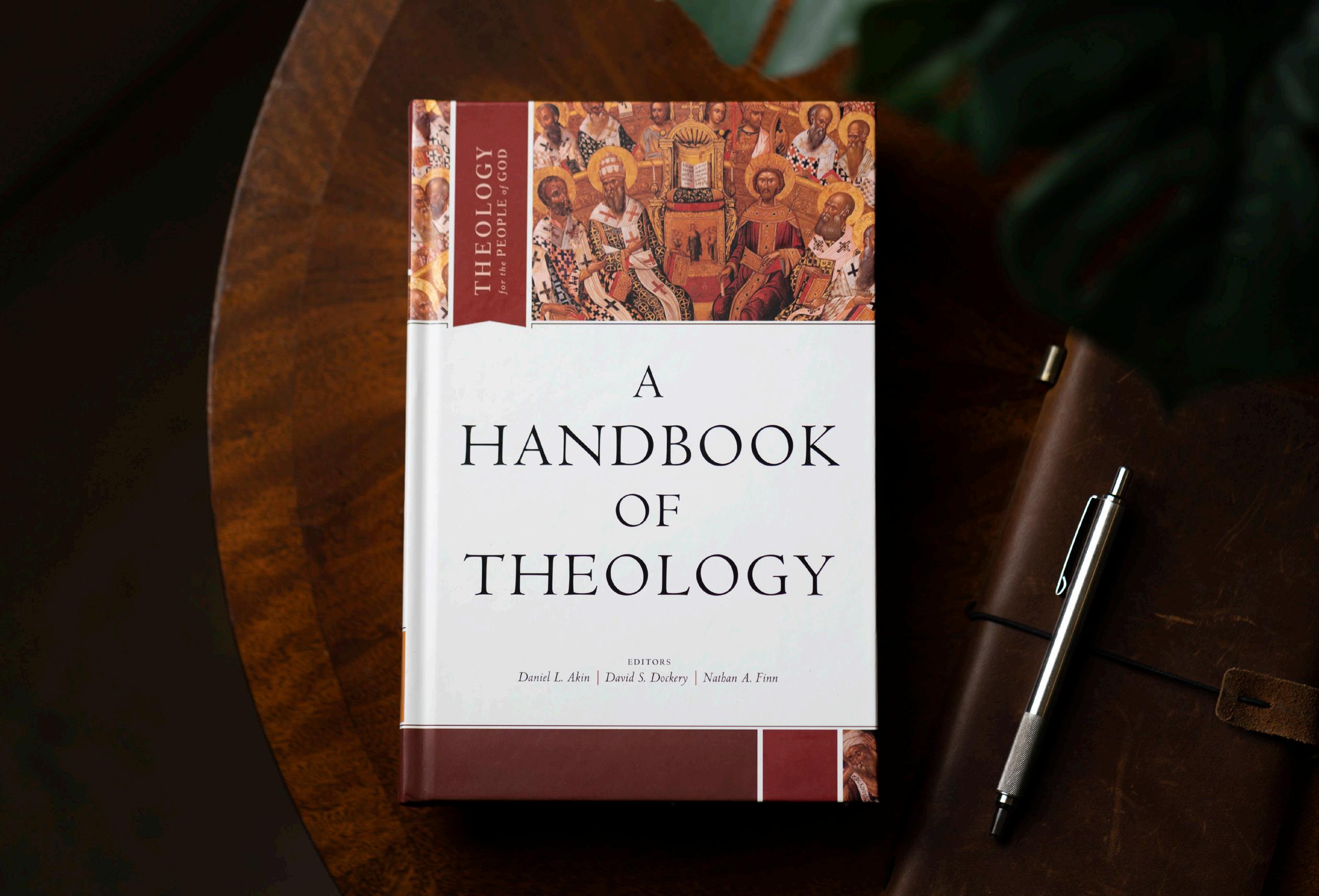
Examining what it means to be created in the imago Dei, or image of God, and the worth and value this biblical truth gives to people, President David S. Dockery (’81), alongside Lauren McAfee, has brought together leading experts to speak about human worth and dignity and the implications this has on today’s culture. In Created in the Image of God, scheduled to be released by Forefront Books in August, readers will be given an examination of the creation of man and woman, the fall, and redemption in Christ Jesus. The content provides an application to human dignity issues and how to address them in light of today’s culture.
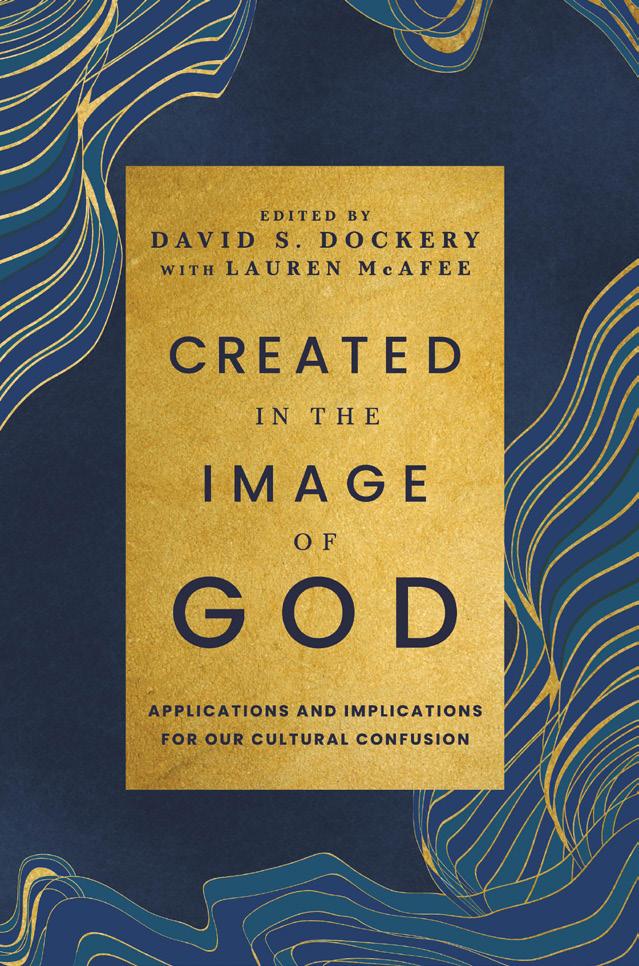
Matt Queen interim provost and vice president for academic administration
“From time to time, God distinctly superintends circumstances at particular places to prompt Christians to evangelize. In such a case the Holy Spirit internally impresses upon a believer that he or she must share the gospel with a specific person.” (on baptistpress.com)
Michael Copeland ('18) assistant professor of missions
“As Han Christians continue to engage in Christian mission, understanding their interaction with Uyghur Muslims gives insights into growing barriers and future possibilities. Oral histories and relevant historical sources qualitatively explain the challenges and opportunities involved in Han Christian interaction with Uyghurs Muslims.”
THE PROMISE CODE: 40 BIBLE PROMISES EVERY BELIEVER SHOULD CLAIM
Thomas Nelson Publishers, 2022
O.S. HAWKINS (’74, ’20) Hawkins adds another book to his Code Series in which he encourages believers to claim and stand in 40 different promises found in Scripture as they find the joy and peace that is only found through an understanding of God’s promises.

FAITH WORKING THROUGH LOVE: THE THEOLOGY OF WILLIAM PERKINS
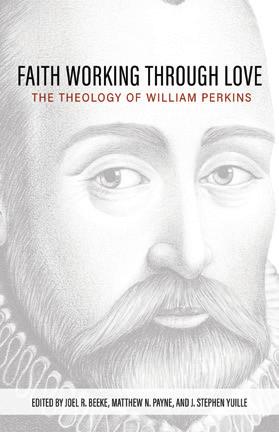
Reformation Heritage Books, 2022
J. STEPHEN YUILLE, CONTRIBUTOR
William Perkins played an integral role in the English Puritan movement. Yuille and 11 other contributors dive into the works and theology of one of the top English practical theologians. Yuille specifically discusses marriage from the perspective of Perkins’s works.
LEADING FROM THE FOUNDATION UP Reformation Heritage Books, 2023
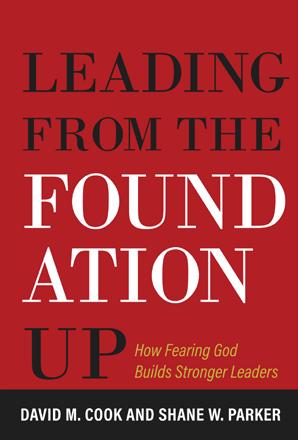
SHANE W. PARKER Parker and co-author David Cook discuss what the biblical answer is for why some leaders are able to grow in wisdom and why some fall into sin. The book walks readers through the process and elements of what will help followers flourish under strong Christian leadership.
(on brill.com)
Joseph R. Crider dean of the school of music and worship
“As churches moved away from children’s choirs, youth choirs and even adult choirs, musical opportunities and training within a ministry context diminished significantly. Therefore, generations of young people were not exposed to music making in the church for the purpose of helping lead others in worship.”
(on thealabamabaptist.org)
SOUTHWESTERN SEMINARY ALUMNUS, JERRY RANKIN (’69), was honored by his undergraduate alma mater by having most of his life’s writings, resources, and memories exhibited in the Rankin Missions Center in the Baptist Student Union at Mississippi College in Clinton, Mississippi, in a dedication ceremony on Oct. 28, 2022.
Rankin, who served for more than 20 years on the mission field in Indonesia and South Asia with his late wife, Bobbye, served as the president of the International Mission Board from 1993 until he retired in 2010 and was subsequently named president emeritus. While at
MC, Rankin served as the president of the BSU and served the Lord on multiple mission trips including to New York and the Philippines. He graduated from MC in 1964 with his Bachelor of Arts and earned a Master of Divinity from Southwestern in 1969.

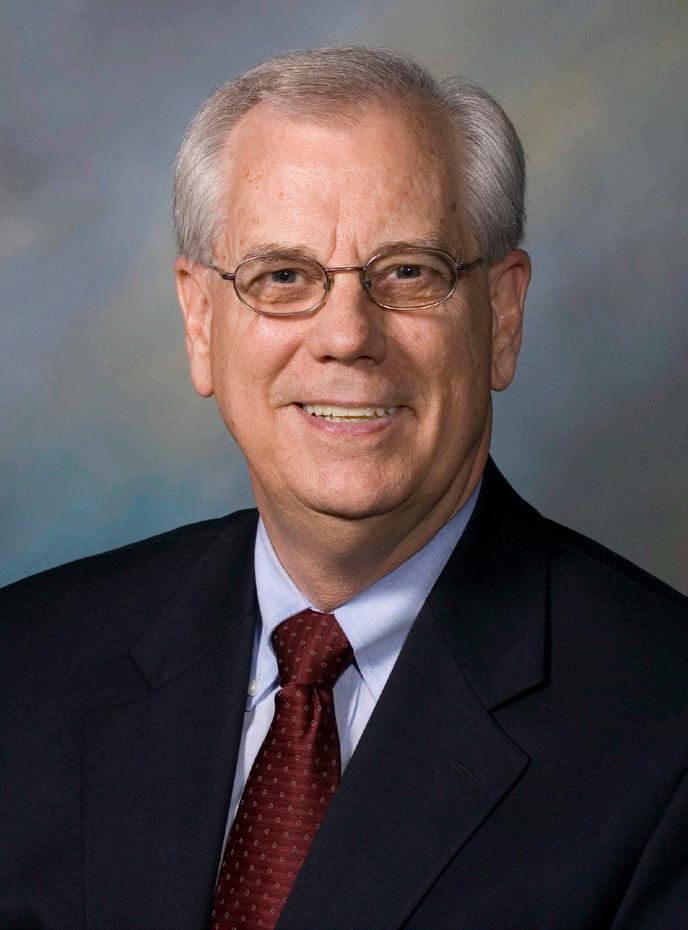
Former president of Mississippi College, Lee Royce, suggested that Rankin could allow the school to show off his accomplishments through an archive of his many works. While Rankin was initially hesitant, he discussed with current MC President Blake Thompson the possibility of placing the archive in the BSU.
Many different churches and seminaries offered to create a similar archive, but Rankin decided to honor what was his first stop in ministry: the Mississippi College BSU.
—J. D.
MILTON A. HOLLIFIELD, JR (’80) AND K. ALLAN BLUME (’75) WERE AMONG 16 HONOREES OF THE NORTH CAROLINA BAPTIST HERITAGE AWARDS at an awards ceremony April 4 in Greensboro, North Carolina. The awards, which are co-sponsored by the North Carolina Baptist Foundation and the Baptist State Convention of North Carolina (BSCNC), honor men and women who have given exemplary service to N.C. Baptist statewide causes.
A native of Swannanoa, North Carolina, Hollifield, who earned his Master of Divinity from Southwestern in 1980, was awarded the heritage award from the BSCNC. Serving a cumulative 28 years with the BSCNC, Hollifield served as executive director-treasurer of the state convention from 2006 until his February 2021 retirement. Hollifield led the state convention staff and ministries with an emphasis on prayer, evangelism, disciple-making, and church planting, all of which he modeled from his own life and walk with the Lord. Prior to serving as the executive leader, Hollifield was the state convention’s evangelism director for 13 years. Following retirement, he and his wife, Gloria, returned to their native
western North Carolina. Hollifield serves in a part-time role with the North American Mission Board as special assistant to the president for state conventions.
Blume, who served as the editor and president of the Biblical Recorder, the news journal of North Carolina Baptists, was awarded the heritage award on behalf of the Biblical Recorder. Blume led the statewide Baptist newspaper for eight years until his retirement in 2019. The Charlotte, North Carolina, native was the senior pastor of Mount Vernon Baptist Church in Boone, North Carolina, from 1994-2011. A respected leader in North Carolina Baptist life, Blume served multiple terms as the chairman of the BSCNC’s board of directors, president of the N.C. Baptist Pastors’ Conference, and as a member of the Southern Baptist Convention’s Executive Committee (2009-2011). Blume, who serves as a contractor in the ministry area of pastoral transitions with the BSCNC, lives in Chapel Hill, North Carolina, with his wife, Pam.
—A. A.
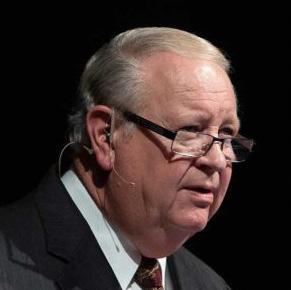
1970
John C. Bowling (MDIV 1973, EDD 1978) to Northern Seminary, IL as Acting President.
1980
David Wayne Hardage (MDIV 1983) to Texas Baptist Men in Dallas, TX as Director of Church Engagement.
Harold Tribble Kitchings Jr. (MARE 1986) to Easthaven Baptist Church, MS as Pastor.
Greg S. Gosselin (MARE 1988) to Crossroads Community Church in Elmore, AL as Preschool and Children’s Pastor.
Barry Keith Lowry (MARE 1988) to Park Cities Baptist Church in Dallas, TX as Discipleship Pastor.
Albert Verner Elmore, Jr. (MARE 1989) to First Baptist Church in Mount Olive, AL as Senior Pastor.
1990
Jeffrey Scott Stith (MM 1992) to First Baptist Church in Birmingham, AL as Music Minister.
Charles Nelson Teague (MDIVBL 1995) to Sardis Baptist Church in Boaz, AL as Minister of Education, Outreach, and Media.
2000
Christopher David Dale (MAMC 2000) to First Baptist Church in New Boston, TX as Music Minister.
Gerald David Burris (MDIVBL 2000) to the Georgia Department of Defense, GA as State Chaplain.
Louis Ryan Carpenter (MDIVBL
2003) to Village Parkway Baptist Church in San Antonio, TX as Senior Pastor.
Joshua Guy Wilson (MDIV 2009) to Southside Baptist Church in Andalusia, AL as Pastor.
Dave Allan Wright (MACE 2009) to Northbrook Baptist Church in Cullman, AL as Discipleship Pastor.
2010
Jair Fernandes Santos (MDIV 2014, PHD 2018) to Leadership Outreach in Feira de Santana, Brazil, as Regional Coordinator.
Bradley Neal Jett (MACM 2011) to Hunter Street Baptist Church in Hoover, AL as Worship Arts Minister.
Benjamin Cody Hawkins (MATH 2012; PhD 2017) to Missouri Baptist Convention, Pathway in Jefferson City, MO as Editor.
Kody Kayde Alvarez (BAH 2012) to Oak Grove Baptist Church in China Spring, TX as Pastor.
Adam David Tarleton (MDIV 2016) to First Baptist Church in Lincoln, AR as Senior Pastor.
David “Tony” Wolfe (DEDMIN 2016) to the South Carolina Baptist Convention, SC as Executive Director-Treasurer.
Daniel Jay White (MTS 2019) to East Heights Baptist Church in Tupelo, MS as Senior Pastor.
RETIREMENTS
1960
Benny Darrell Mayo (MARE 1963) retired with wife, living in Red Oak, TX.
1980
Jerry Wayne Penfield (MARE 1980) retired with wife, DiAnne, living in Zwolle, LA.
David Smith (MRE 1982) retired, living in Jonesboro, GA.
Dale David Perkins II (MACM 1984) retired living in Atlanta, TX.
Terry Glenn Meeks (MDIV 1985) retired with wife, Pat, living in Hartwell, GA.
1990
Lewis Michael Holster (MARE 1994) retired with wife, Katherine, living in Levelland, TX.
1950
Elmer Joe Vernon (BDIV 1954)
Charles Finney Ogilvie (BDIV 1955, ThM 1956)
Charles Arlen Kellar (Ex-Theology 1956)
Robert Thomas Banks, Jr. (MRE 1956)
Johnny N. Burnett (BDIV 1956, MRE 1971, EdD 1988)
Charles Frazier Stanley (BDIV 1957)
1960
Luther Franklin Johnson (MRE 1960)
Peggy Ruth Masters (MARE 1961)
Wallace Blake Palmer (BDIV 1961)
Archie Virgil Lawrence (BDIV 1962)
Carol Joyce Andrews (MRE 1964)
Charles Fredrick Kottenbrook (BDIV 1966)
Louis Palmer McCown (MDIV 1967)
Karl D. Bozeman (MRE 1968)
Gerald Wayne Neill (MARE 1968)
Bobbye Ann Rankin (Ex-BDIV 1969)
1970
Harvey Gene Rotramel (Ex-Theology)
Allen Graves Reed (MACM 1970)
Robert B. Hatfield (MACM 1973)
Randall Herbert Tompkins (MRE 1973)
Doyle Chauncy (MDIV 1974)
Richard Arnold Lorton (MDIV 1978)
1980
Craig Aubrey Bird (Ex-Miss)
Douglas Gordon Hightower (Dip Th 1980)
Bobby Ray Smith (MDIV 1980)
Herbert Brisbane (MDIV 1980)
Albert Lee Woods (MDIV 1982)
Timothy Dane Cearley (MDIV 1982)
Taylor D. Hooker, Jr. (MRE 1982)
Jerry Ray Peacock (Asc DIV 1982)
Robert Lee Sangster, Jr. (MDIV 1988)
1990
Jack H. King (MARE 1994)
Terry Glenn Barclay (MDIVBL 1995)
Thomas Wayne McEntire (MARE 1997)
2000
Jimmy J. Aldridge (MATH 2006)
love to hear from Southwesterners from all over the world. If you have recently changed your ministry positions or celebrated a retirement, anniversary, or birth, we would love to hear about it. Please contact us at:
SOUTHWESTERN BAPTIST THEOLOGICAL SEMINARY HAS GREAT SIGNIFICANCE to Ralph and Jan Smith, which is why they love supporting its mission and helping the mission continue to be fulfilled.
After high school, Ralph attended the United States Military Academy at West Point and after graduation was commissioned as an officer in field artillery training school in Fort Sill, Oklahoma. While in training, Ralph met Jan, an Oklahoma native, and they married one year after meeting.
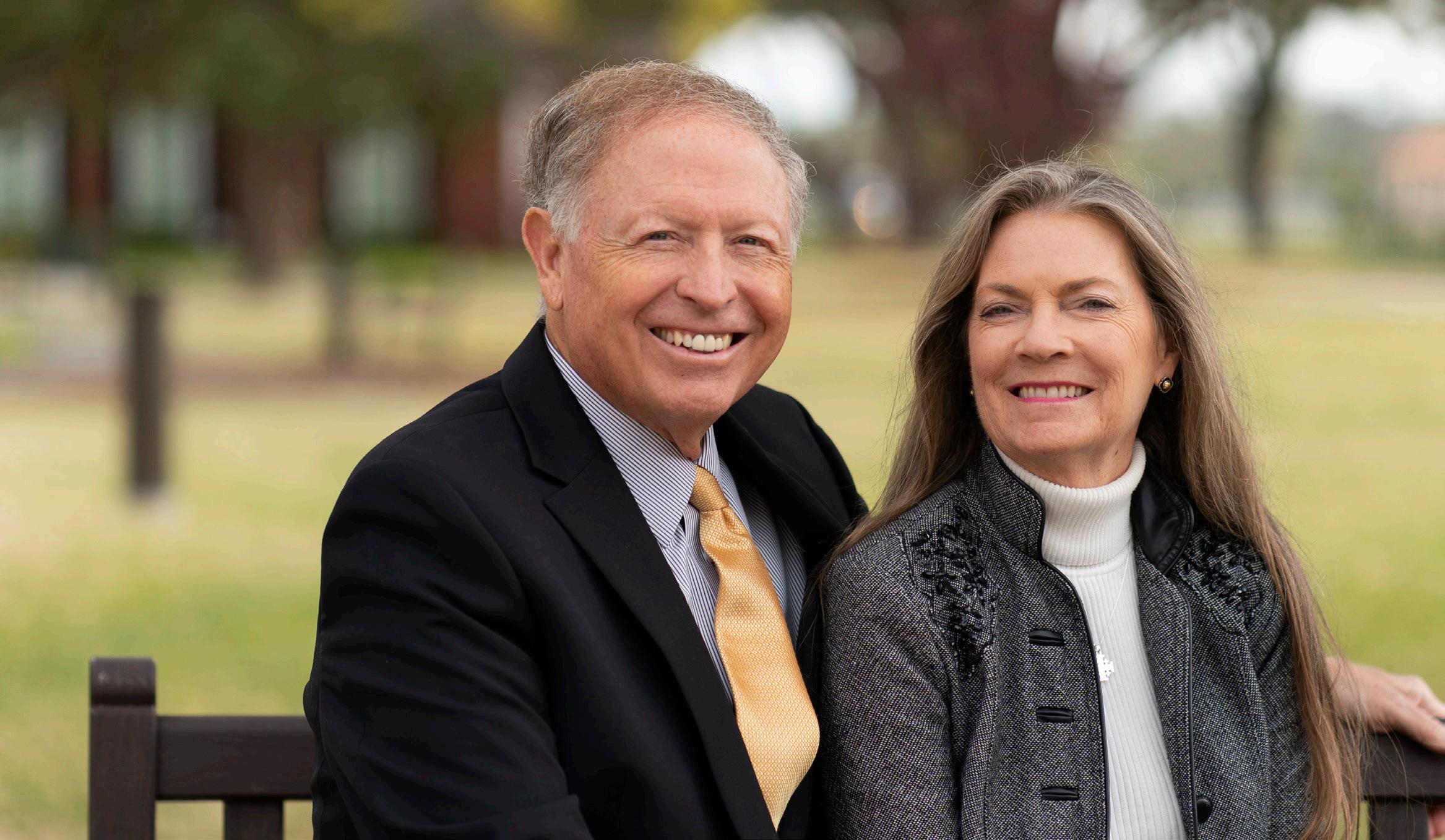
After Ralph’s assignment in Oklahoma was over, they were stationed in Germany and then in Norfolk, Virginia, at Old Dominion University. He was assigned to join the faculty at Old Dominion to teach Reserve Officer Training Corps (ROTC) and while there took classes eventually earning his graduate degree in business. After Ralph finished serving in the Army, he began his own business, Smith Capital Management.
While living in Norfolk, Ralph and Jan became active members of First Baptist Church Norfolk, where Kenneth S. Hemphill served as pastor. In 1995, Hemphill became the seventh president of Southwestern Baptist Theological Seminary and the Smiths traveled to Fort Worth that spring to attend his inaugu-
ration.
It was through attending the inauguration of Hemphill that the Smiths were introduced to Southwestern Seminary and became aware of the rich history and legacy of leaders that formed the foundations of the seminary. Afterward, Hemphill invited the Smiths to attend the Southwestern Advisory Council (SWAC) meetings and Ralph began to attend the meetings annually.
“The more I saw, the more I fell in love with it,” says Ralph. It was during this time, that “God was impressing on my heart to make disciples”
with the seminary. “We’ve been investing in the work of Southwestern and our prayer continues to be that God will reach and multiply the efforts of all associated with Southwestern,” Ralph says.
Jan has had a rich experience serving with the women’s ministry at Southwestern as she says she has “thoroughly enjoyed working for many years with the seminary student wives through Dressed for Success and teaching Equipping Pastor’s Wives for Christian Hospitality” while also finding joy in mentoring student wives over the years.
and he “felt called to become a mentor and equip a person to be a disciple of Christ,” so he began to “study” to be a disciple-maker.
In 2002, the Smiths took a leap of faith and moved from Norfolk to Fort Worth to “encourage and equip disciple-makers” as they built on relationships they had cultivated through SWAC, they explain.

Ralph says the couple wants “to give to God’s work.” Through prayer, they became confident that they “could invest in the lives of students by funding an academic scholarship,” and have funded the Ralph and Jan Smith Scholarship for pastors.
The Smiths say they “love being in the Fort Worth community so” they can “be close to Southwestern. We have appreciated the history of the founding of Southwestern and through our being a donor and member of the Advisory Council,” the couple says.
The Smiths involvement with Southwestern includes construction projects such as the Ray I. Riley Center, Mathena Hall, and the Jack W. MacGorman Chapel and Performing Arts Center. They worked with Jack D. Terry, interim vice president for institutional advancement, to encourage donors to help build the additions and were able to see the vision of those buildings come alive through their partnership
The Smiths enjoy being members of the President’s Club, attending concerts by the School of Church Music and Worship, and special events at Southwestern such as Founder’s Day and “celebrating the work of B.H. Carroll and L.R. Scarborough award winners.” Ralph finds it “special” to be able to meet the students who receive the scholarships at the scholarship luncheon that is held each Spring. “To be able to attach a face” with a name and have the “opportunity to get to know who it is that has been a beneficiary in a small part of our investing” is quite meaningful to them, Ralph says, as he notes “giving to Southwestern is a significant Kingdom investment.”
“Every time we’re on campus, it’s a blessing to meet and encourage students,” Jan says. “It is our privilege to contribute and help support the Kingdom work and academic preparation that takes place at Southwestern.”
Ralph encourages “Southwestern to hold very close to the missional concepts” it was founded upon, adding that he and his wife pray that the mission of 1 Timothy 2:4 will “be clear and growing and increasing in the minds of pastors and staff members to pass it on to church members to grow the Kingdom of God.”
“It is our privilege to contribute and help support the Kingdom work and academic preparation that takes place at Southwestern,”
– JAN SMITH
I have never lived in Fort Worth. Although that places me safely in the majority of the world’s population, it puts me into what I think is a minority of Southwestern Seminary alumni.
I wanted to serve while studying, and for a twenty-two-year-old with minimal pastoral experience, finding a place to serve meant living far away from school. For the first two years of my Master of Divinity, I commuted in from Mill Creek, Oklahoma. I wrapped up the MDiv while leading Trinity Baptist Church in Royse City, Texas. For the entirety of my doctoral studies, I commuted to Fort Worth from Farmersville, Texas, where we still live today. Even the work I did as an adjunct professor for SWBTS was overwhelmingly conducted at off-campus centers in Oklahoma, Arkansas, and Texas.
I know that not having lived on or near the campus, there are some aspects of the SWBTS experience that I missed. I have never tried to bake anything in the ovens of the former Student Village. My wife never attended a meeting for seminary wives. I’ve spent very little time in the RAC (OK…that might not have been very different even if I had lived on campus).
On the other hand, for all of what constitutes academic life and my on-campus compatriots and I had the same glorious experiences. I remember well the cold sweat that came whenever James Leo Garrett looked up from his seating chart and said, “What was John Leadley Dagg’s view of the universal church [uncomfortable pause] Mr. Barber?” I know exactly where the pain settles in your neck when you have fallen asleep in the chairs in the recess around the atrium on the third floor of Roberts Library. In all of the new and strange contexts in which I have preached this year, none of them have produced the quantity of butterflies in my stomach that I felt in the preaching lab in the basement of Scarborough Hall.
My churches got a front-row seat to watch those trials at SWBTS equip me and shape me. They watched my preaching improve, and they told me that it was improving (which I knew was true but did not always want to hear…at least in that particular way). They began to come to me for pastoral counsel,
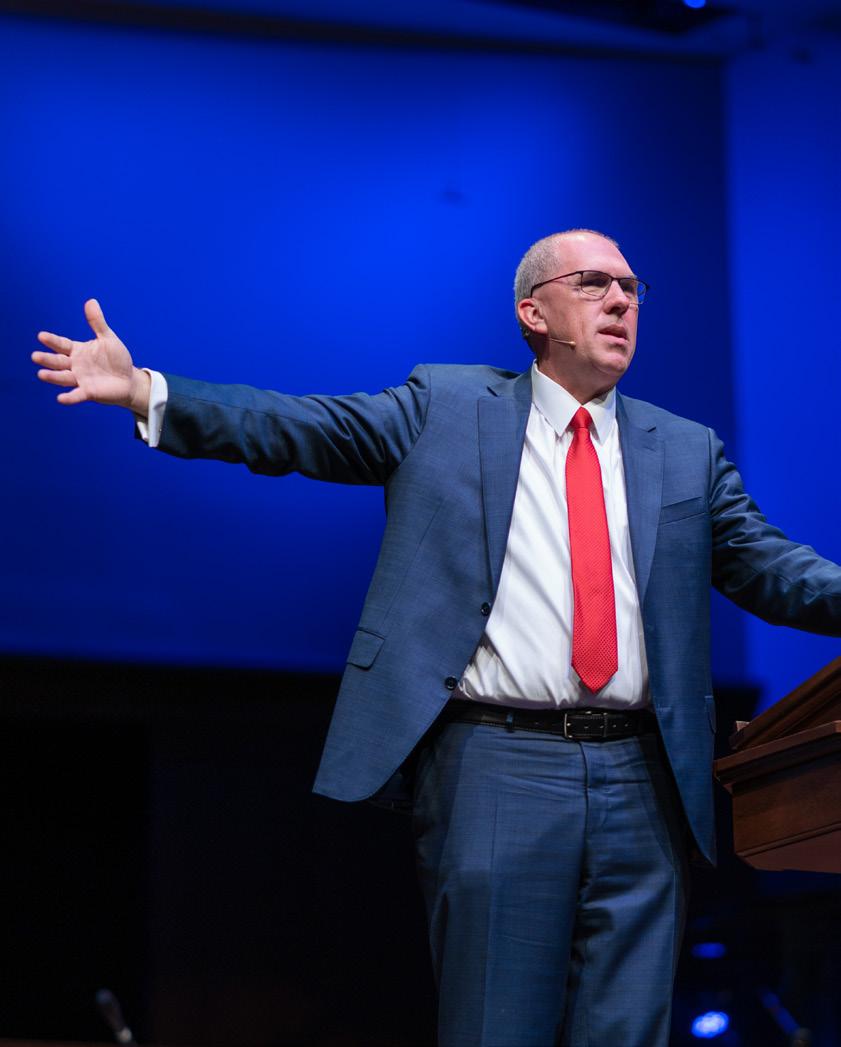
even though I was half their age usually. The advice I gave often came straight out of something I had heard in a class. I had been a Southern Baptist all my life, but I began to learn why. In my administrative role at church, I started to lead in ways that were thoughtfully Baptist.
In Systematic Theology II, Dr. Garrett stepped away from the curriculum and his book one day to talk to us about SWBTS and its history. I had walked through the rotunda and had seen the portraits of the presidents. Dr. Garrett spoke about the school’s history at a deeper level. He spoke of the precarious days that our seminary faced in the 1920s. The money promised in the 75 Million Campaign was never fully delivered. The Dust Bowl and the Great Depression threatened the survival of a seminary dependent on gifts from predominantly rural churches. The controversies that prompted the drafting of the Baptist Faith and Message in 1925 fomented division among the seminary’s constituencies. Those were difficult days. Dr. Garrett ended with the story of a poor pastor from a rural area who enrolled as a student, barely able to make ends meet, but pursuing his studies on faith. “I was ashamed to come to class with a hole in my pants,” he said, “until I saw that [President Lee Rutland] Scarborough had a hole in his pants, too.”
The SWBTS alumni community finds its common ground less in where we once lived than in where we were going—less in a common ZIP code than in a common mission. We may never have had holes in our pants, but we all made sacrifices to study at SWBTS, and we did so with a calling and vision for ministry in our heads and hearts. Dr. Robert Naylor loved to say, “The sun never sets on Southwestern Seminary.” That’s only true when the lessons and mission of SWBTS go with us after we leave. They did with me, and that’s one of the top ten best things that God ever did in my life.
You don’t have to have lived in Fort Worth for Fort Worth to be alive in you.
“You don't have to have lived in Fort Worth for Fort Worth to be alive in you.”
